HERZLIYAN 2024
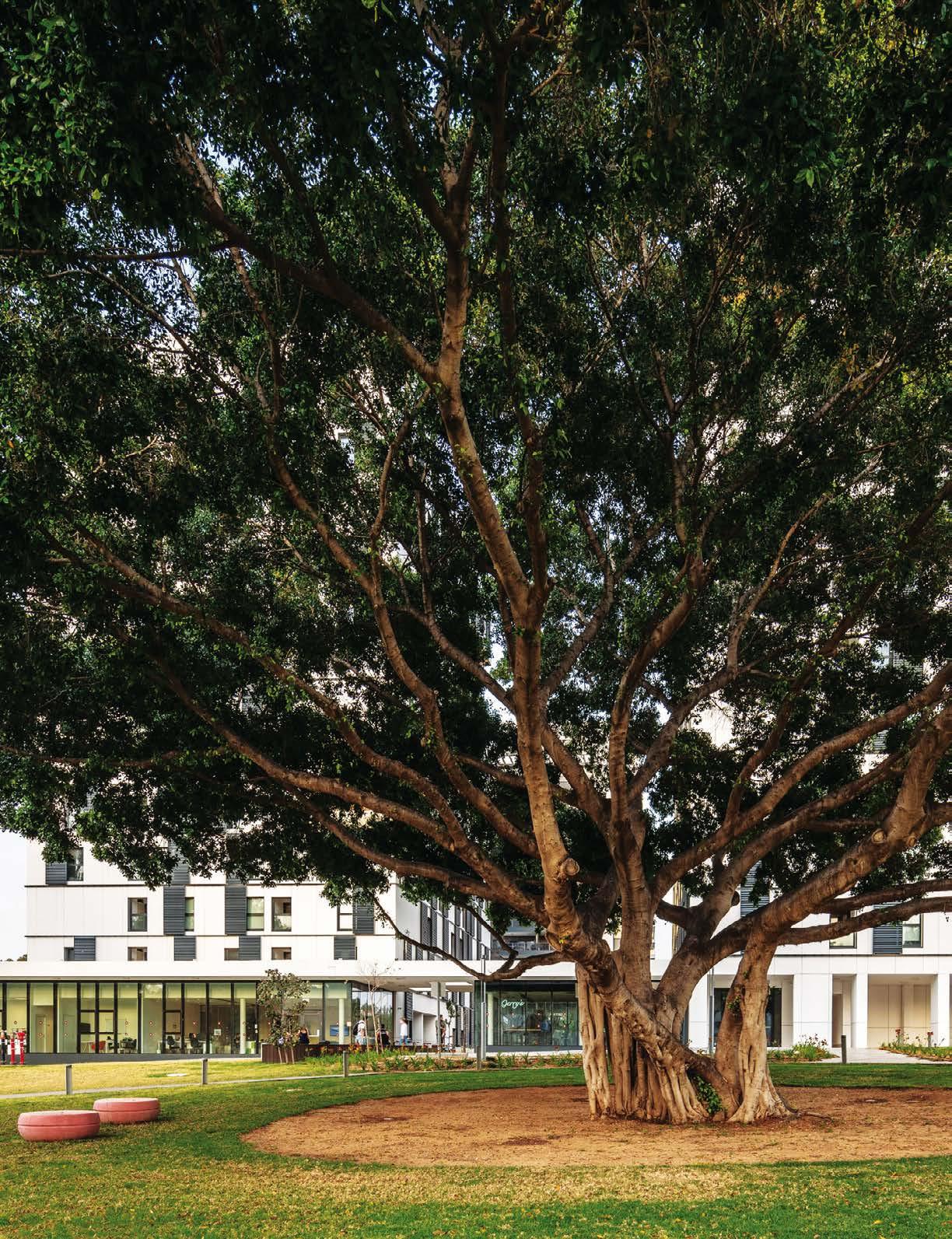



OF IRON SPECIAL EDITION
SWORDS
Students from Kibbutz Kfar Aza share their trauma
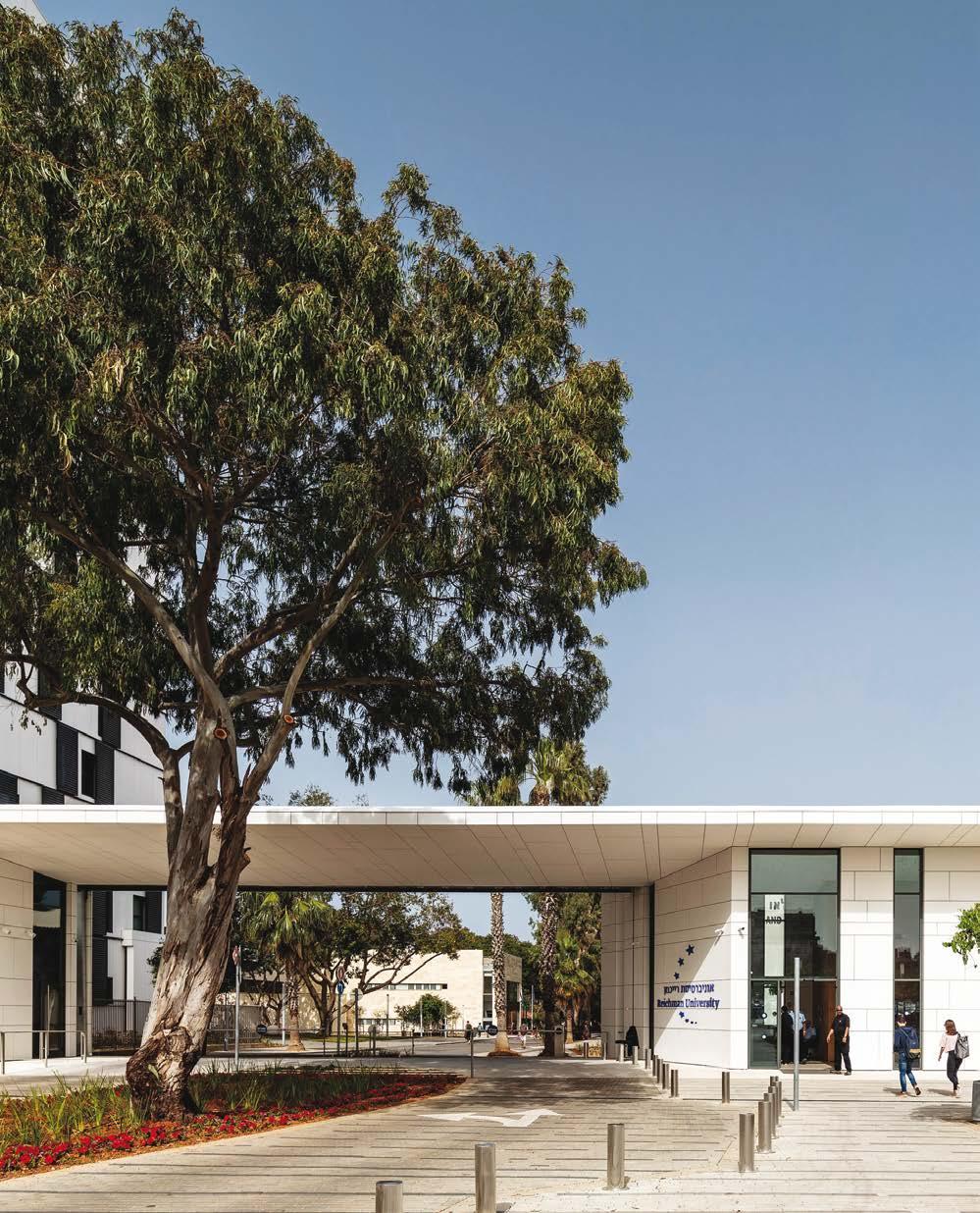
CONTENTS Managing Editors: Tamara Mizroch / tamara.mizroch@runi.ac.il Tamar Shachaf Schneider / tamar.shachaf@runi.ac.il Copy Editor: Naama Oren / nammycat99@gmail.com Graphic Designer: Guy Tamir / guy@2plustudio.com Production Assistant: Natalie Wicks Photographers: Cover pic - Yehoshua Yosef; Inside pages: Adi Cohen Tzedek, Eyal Gaziel, Rami Sinai, Ofer Amram, Alon Gilboa, Oren Shalev, Eli Dassa, Omer Mizrachi, Ronen Topelberg, Kfir Bolotin, Herschel Gutman, Gilad Kavalerchik, Amir Geron, Gadi Dagon, Sigal Blayer-Gat, Aviv Gottlieb,
Yehoshua Yosef, Peter Halmagyi, David Salem, Ofir Rachbuch, Hagai Nativ, Zvi Fermaglich, Naveh Ben Shmuel, Michael Edri, Maya Amado, Oz Schechter, Gabriel Baharlia, Gefen Didi
A message from Prof. Uriel Reichman, Founding President and Chairman of the Board of Directors
Resilience amid crisis: the Reichman University story by Prof. Boaz Ganor, President
American Friends of Reichman University
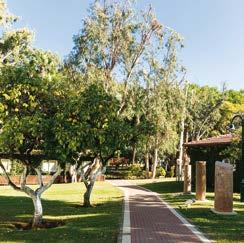
RUNI Alumni during wartime
Tiomkin School of Economics
Efi Arazi School of Computer Science
Reichman University Tribute to the Fallen
Israel Friends of Reichman University
Lauder School of Government, Diplomacy and Strategy
Kibbutz Kfar Aza at Reichman University
Baruch Ivcher School of Psychology
Arison School of Business
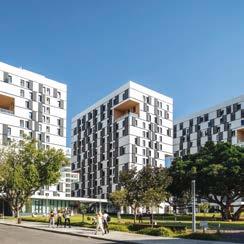
Opening the school year during the Swords of Iron War
Raphael Recanati International School
Sammy Ofer School of Communications
Global Engagement at Reichman University School of Sustainability Dr. Miriam and Sheldon G. Adelson School of Entrepreneurship 6
20 82 62 38 40 86 24 30 10 34 102 90 68 94 98 Harry Radzyner Law School 48
4
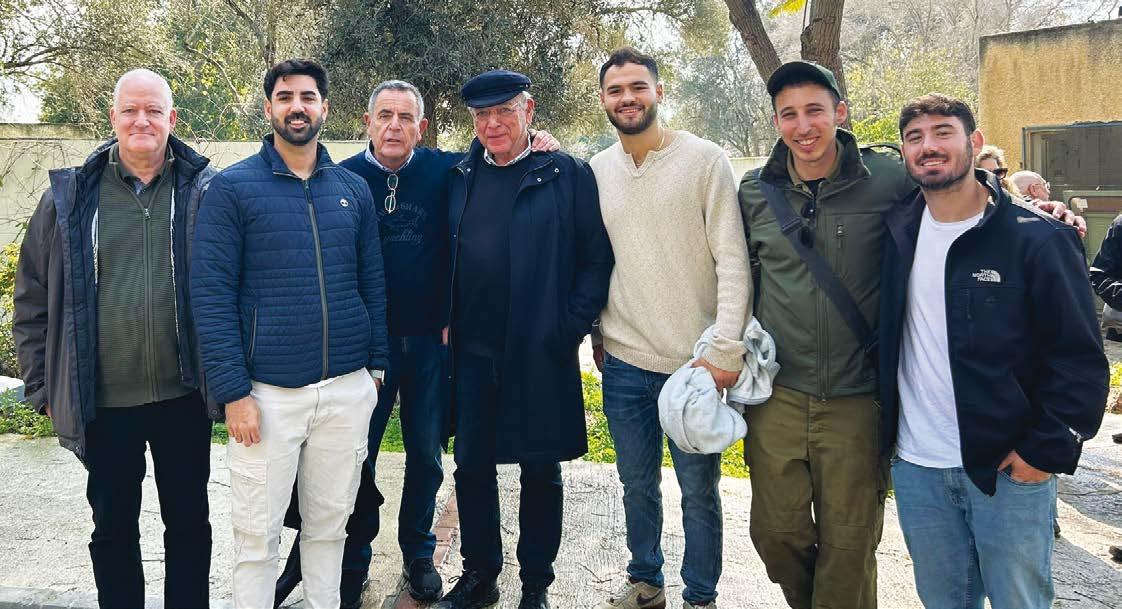
A MESSAGE FROM THE FOUNDING PRESIDENT AND CHAIRMAN OF THE BOARD OF DIRECTORS, PROF. URIEL REICHMAN
Though we have endured unfathomable tragedy, Reichman University’s commitment to building a brighter future, fostering young minds, and strengthening the Jewish homeland only grows stronger.”
– Prof. Uriel Reichman
Visiting Kibbutz Kfar Aza with students from Kibbutz Kfar Aza: Prof. Boaz Ganor, President, Guy Assor, studying Business & Law, Jonathan Davis, VP External Relations and Head of the RRIS, Prof. Uriel Reichman, Founding President and Chairman of the Board of Directors, Ido Felus, studying Business and Entrepreneurship, Netta Kessler studying Sustainability, and Rotem Koren, studying Business and Law.
4 | Herzliyan 2024
As the Founding President of our university, I am proud to witness our institution’s unwavering resilience amidst the tumultuous challenges of war and adversity. Our steadfast belief in the future of our nation serves as our guiding light, empowering us as a university family to weather the storms of uncertainty with determination.
In a manner unique to any other university in Israel, our students demonstrated remarkable courage and commitment as almost half our student body served in the IDF reserve forces, bravely defending our homeland from Hamas in Gaza, Hezbollah in the North, and terrorists in the West Bank. Since the tragic day of October 7th, we have maintained close communication with our students engaged in this war against terrorism.
During these trying times, our students and alumni have exemplified extraordinary compassion and dedication by providing essential supplies and support to those on the front lines. Moreover, our esteemed faculty members from the Ivcher School of Psychology offer invaluable resilience counseling to hundreds, while our Ofer School of Communications tirelessly documents the atrocities perpetrated by Hamas, as well as advocating for Israel’s just cause on social media platforms.
The costs have been immeasurable. We have lost eight students since October 7th; their bright futures tragically cut short. We grieve with their families and stand in solidarity as we mourn their sacrifice.
Yet, even in the face of adversity, newly released reservists exhibited remarkable resilience, returning to their studies with determination. To ensure they do not falter in their academic pursuits, we devised a specialized program that condenses essential teachings into an intense curriculum, allowing them to continue their education without delay and not miss the semester.
Looking forward, our commitment to academic progress remains unwavering. As we prepare to launch the Dina Recanati School of Medicine, we’re excited to lead collaborative research across AI, medicine, computer science, bioinformatics, and related fields. We’ve embraced interdisciplinary collaboration across life sciences, medical sciences, and exact sciences. Our collaborative efforts will involve established campus labs such as the Center for Developmental Social Neuroscience, the Baruch Ivcher Institute For Brain, Cognition & Technology, and The Ruth and Meir
Rosental Brain Imaging Center (MRI), as well as the newly established Scojen Institute for Synthetic Biology. We remain committed to advancing cutting-edge innovative technologies through interdisciplinary research.
We have recently completed the Ronson Dormitories, and 20 fully-equipped apartments now provide temporary homes to the displaced evacuees of Kfar Aza, whose kibbutz was decimated on that tragic October day.
As we forge ahead, major milestones await. In June, we will dedicate the Daniel Jusidman Conference Center, a 500-seat conference center where we will hold our Honorary Doctorate ceremony and honor those who demonstrated exceptional valor these past six months. An extraordinary Herzliya conference in June will convene leading global experts to map the path forward across critical sectors during this challenging time.
Our identity remains firm, a foundation for all we do. The newly donated Dabbah Synagogue will offer an intimate sanctum for our religious students. Though we have endured unfathomable tragedy, Reichman University’s commitment to building a brighter future, fostering young minds, and strengthening the Jewish homeland only grows stronger.
As we embark on new endeavors, we reaffirm our commitment to serving our community and nation. We extend a heartfelt invitation to our friends and supporters to join us in our mission to educate and empower future generations, ensuring that our values and beliefs endure against the winds of change and adversity.
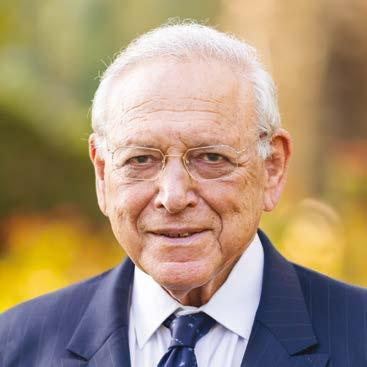
5
Prof. Uriel Reichman
RESILIENCE AMID CRISIS: THE REICHMAN UNIVERSITY STORY
By Prof. Boaz Ganor, Reichman University President
For the past 30 years, I served as the Founding Director of the International Institute of Counter-Terrorism (ICT) at Reichman University. Upon assuming the presidency of Reichman University, I anticipated leaving the world of terrorism behind. However, just two weeks into my tenure, the “Swords of Iron” war erupted, making it clear that terrorism would remain a significant concern.
During the last three years of my tenure at ICT, our most significant project involved conducting a thorough analysis of the implications of a multi-front war on Israel. We presented our findings, including recommendations, to the most senior ministers, generals, and heads of security and intelligence agencies, outlining the challenges and complexities that lay ahead.
Confronted with the challenge of navigating our university through a war, we adopted a comprehensive approach to mitigate its impact. Recognizing the financial strain on our private institution, which relies solely on tuition fees without government funding, I consulted with Founding President Prof. Uriel Reichman and Vice President of Finance Golan Zrihan. Vice President Zrihan’s analysis highlighted the worst-case scenario that had already played out: the war’s onset just two weeks before the start of the academic year.
In order to mitigate this worst-case scenario, we swiftly took action. To secure the financial stability of Israel’s sole private university, we created an emergency fund and reached out to our partners for assistance. Thankfully, many of them stepped up, offering crucial support during this trying period.
I was pleased to discover that our university, known for its commitment to Zionism, has over 4,000 students who had been drafted as reservists. This significant number underscores the dedication of our student body, with nearly half choosing to serve in the reserves. This participation rate far surpasses that of other universities, where typically only around 20% of students serve.

We tragically lost eight students during the war, with several others injured and one held hostage in Gaza. Our university has provided dedicated support and care to the wounded and families of the victims during this challenging time.
From the early onset of the war, we undertook several actions to respond to the crisis of the war. First, we established six situation rooms where both students and faculty could volunteer.
6 | Herzliyan 2024
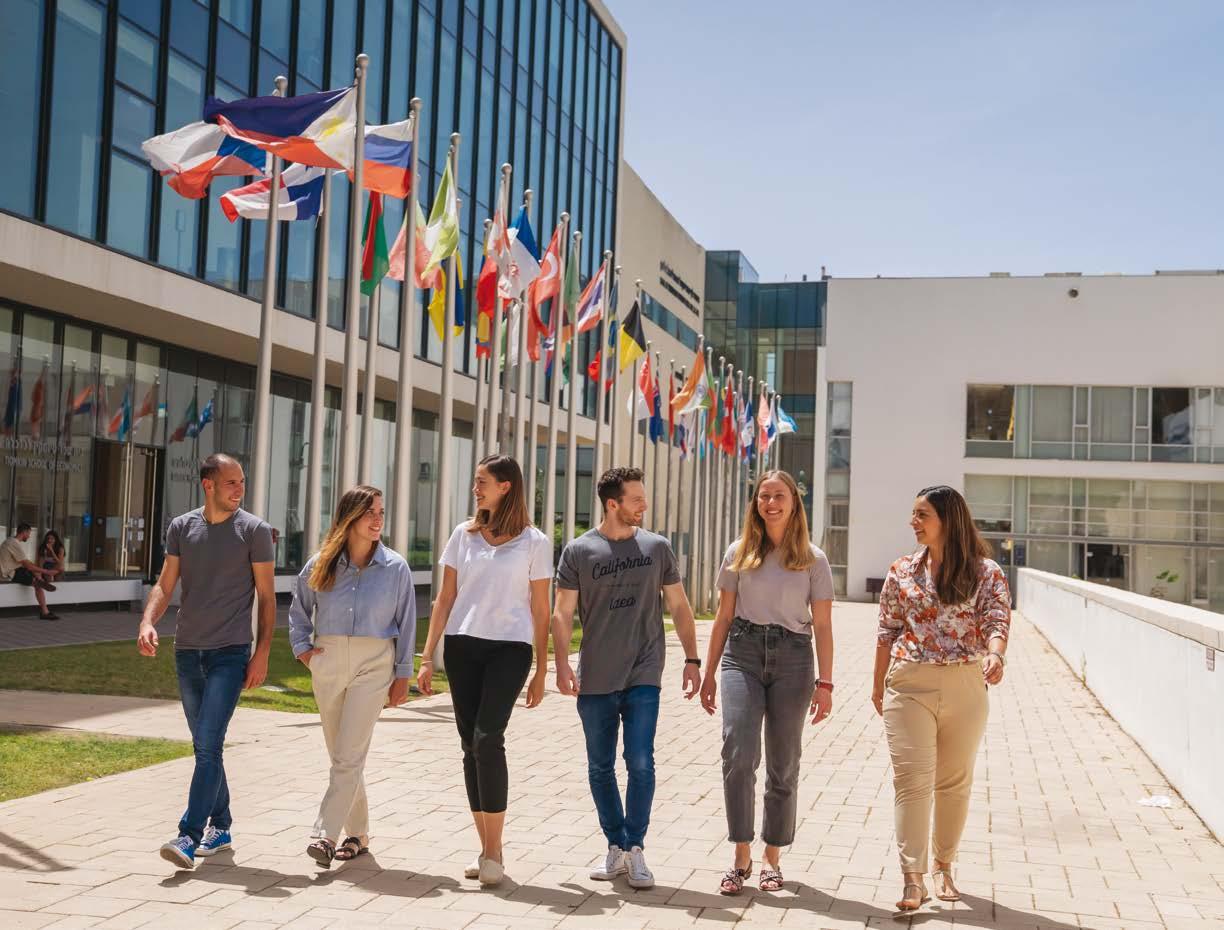

Reichman University has demonstrated remarkable resilience amidst these challenging times. Our university’s resilience is a reflection of the broader resilience of the larger Israeli society, and I have no doubt that we will continue to overcome these challenges.”
– Prof. Boaz Ganor
7
The first, a Reservist Situation Room, saw a dedicated team sorting, collecting, and delivering essential donations and care packages tailor-made to our students, staff, and alumni currently serving in the IDF. These packages provide much-needed sustenance and emotional support to our brave servicemen and servicewomen.
The second, known as the Hasbara Room, operated through ACT.IL. Here, international students actively engage in promoting and advocating for the case of Israel on various social media platforms.
The third Situation Room, initiated by students from the Arison School of Business, engaged with leading businessmen to mentor reservists with small businesses affected by the conflict.
In the fourth, created by the Radzyner School of Law, students and faculty provided legal consultations to individuals impacted by the war, ensuring they understood and accessed their legal rights.
The fifth initiative, led by the Ofer School of Communications, involved recording and archiving personal stories from the conflict, preserving the testimonies of victims.
Last, the Ivcher School of Psychology initiated a counseling operation in the sixth Situation Room. There, psychology students and faculty provided support to returning reservists, evacuees, and other victims, fostering resilience and offering psychological aid.
The next hurdle we faced was determining when to open the Raphael Recanati International School. The RRIS is smaller, and has fewer IDF reservists than the other schools and a significant number of foreign students already residing in dorms or at home, abroad. Our aim was to balance maintaining the academic year’s integrity with accommodating the needs of all students. To address this challenge, we opted for a hybrid approach, opening the school year in mid-November. This allowed students from around the world to engage in distance learning while also providing an opportunity for reservists to participate remotely – when possible.
Subsequently, we grappled with the timing of opening the other schools. We endeavored to delay as much as possible since so many of our students were reservists. However, we calculated that further delay would jeopardize not only the first semester but potentially the entire academic year. Consequently, we made the decision to open on December 17th, several months later than initially planned.
The subsequent challenge was ensuring seamless reintegration for the thousands of reservists returning to campus. Given the prolonged duration of the war and staggered release of reservists, we devised a sophisticated support program. This included recorded lectures, personalized meetings with tutors and professors, additional instructional hours, academic credits for their services, and flexibility in repeating courses, if necessary.
Additionally, we allocated special scholarships from our emergency fund to provide war scholarships to hundreds of reservists and students.
These initiatives incurred higher costs than a typical year, necessitating the utilization of our emergency fund to cover expenses.
I am pleased to announce that we have received the highest overall satisfaction from our students in the latest national surveys, reflecting their appreciation for our efforts to support their academic and personal needs.
I am confident that Reichman University has demonstrated remarkable resilience amidst these challenging times. Our university’s resilience is a reflection of the broader resilience of the larger Israeli society, and I have no doubt that we will continue to overcome these challenges.
8 | Herzliyan 2024
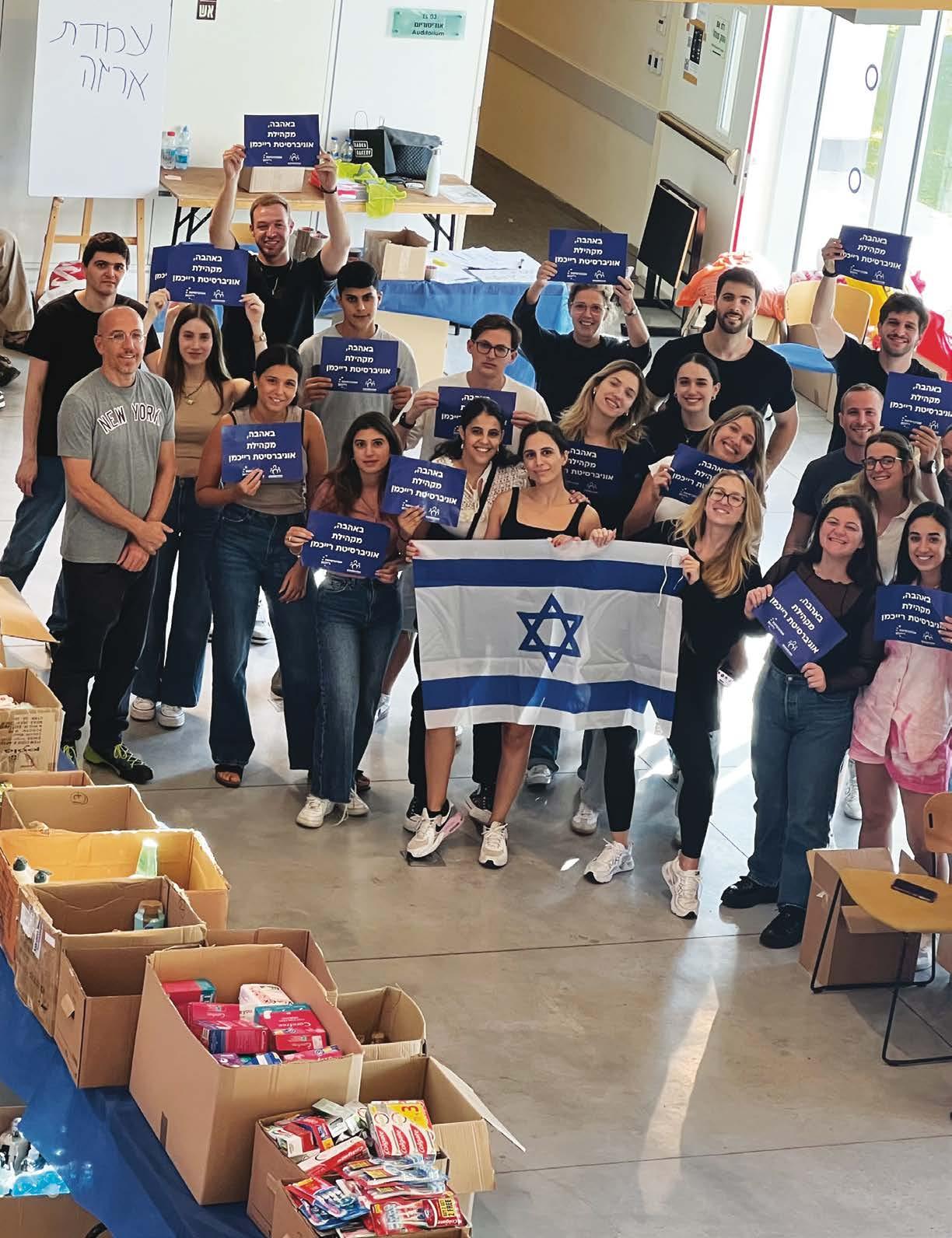
9
Volunteers in the Reservist Situation Room show support for the troops
Reichman University stands in solidarity with the families enduring the heartache of losing their loved ones during the Swords of Iron War.
May their memories be a blessing.
10 | Herzliyan 2024
Major (Res.)
Moshe Yedidyah Leiter z”l
Fell in the Swords of Iron War MBA in Healthcare Innovation program
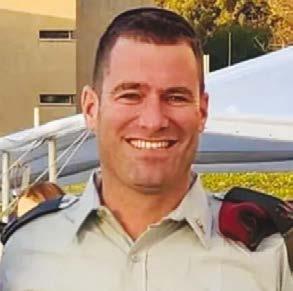
Maj. (res.) Moshe Yedidyah Leiter, 39, was killed in battle in the northern Gaza Strip. Leiter, a reservist, served as a paramedic and first-year MBA student in Healthcare Innovation at Reichman University. He was a company commander in the 697th Battalion of the 551st Brigade and fell in Beit Hanoun when an IED exploded in a tunnel shaft under a mosque.
Concurrent with his medical studies, Leiter was involved in a program preparing ultra-Orthodox men to draft into the IDF’s 8200 Unit by training them in computer science. Ishay Cohen, CEO of the Netzach Yehuda Organization, which assists ultra-Orthodox men in drafting to the IDF, wrote on X (formerly Twitter), “Hundreds of ultraOrthodox soldiers who are now serving in the army and will later join the high-tech market passed under Leiter’s hands.” Philanthropist Miriam Adelson knew Leiter personally from his medical studies and wrote in Israel Hayom, “He was a father of six, yet he himself seemed to be the eternal, inquisitive child with a mischievous smile that would never leave his lips.”

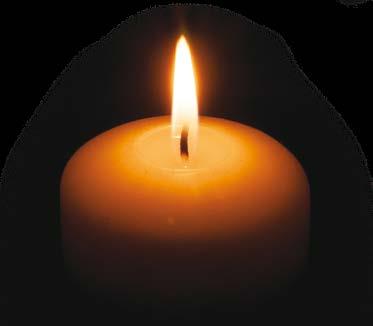
Reichman University Provost, Prof. Varda Liberman said of Moshe, “Upon Moshe’s entrance into the classroom, a sense of radiance accompanied him. His captivating smile, reflected in his kind eyes, exuded tranquility and steadiness, making it almost impossible to realize the many responsibilities he simultaneously managed without effort. In January, he sent me a message while en route to class, stating, ‘I completed my reserve duty and am headed to visit my mother in the hospital, so I apologize for my lateness.’ Moshe embodied dedication, a genuine love for people, unwavering curiosity, and a steadfast commitment to every endeavor. The void left by his absence is significant.”
At his funeral in Jerusalem, his daughter, Carmi, said “Dad, you made me into the best version of myself.
I admired your knowledge, your modesty. I learned from you not to give up. I always felt protected next to you, you projected calm and control in your eyes. Dad, you have left an enormous hole. You should know that we will be strong.”
His wife Tzippy eulogized her husband of 20 years at the funeral, “All of my life, I asked for peace and quiet and I found them in your heart… You died a hero’s death… your almost 40 years were like 80 years of anyone else. You were one big light, and now the light has been spread into a thousand tiny pieces.”
He is survived by his wife and six children, the youngest of whom is under three months old, his parents Yechiel and Hani, his grandmother and seven siblings.
11
Staff Sgt. (Res.)
Omer Balva z”l
Fell in the Swords of Iron War
Bachelor’s Degree 2 nd year student in Business Administration and Economics at the Raphael Recanati International School
Staff Sgt. (Res.) Omer Balva, 22 was killed near Lebanon just days after he was deployed to Israel’s northern border. The American-Israeli had flown back from Maryland in order to mobilize with his reserve unit and died from a Hezbollah rocket.
Balva was in his second year at Reichman University.
The child of Israeli parents who lived in the U.S. for decades, Balva recently finished a stint in the Israel Defense Forces, among the 360,000 reservists called up as Israel mobilized to defend itself following the October 7th atrocity. Balva was on vacation in Maryland, where he was born and had lived until graduating from high school, for Sukkot, and he quickly booked a flight, packed safety gear, and headed home.
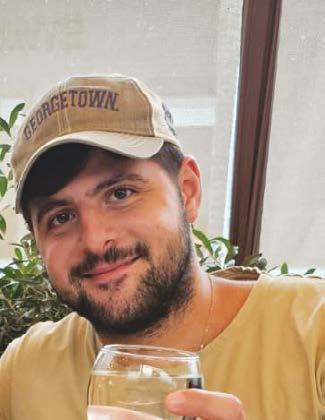
His Jewish day school mourned Balva, whom it said had been, “A beloved student. Omer was an unabashed advocate for the State of Israel. He is a hero to the State of Israel, the Jewish people, and the school. We are devastated and heartbroken.”
Balva came from a strong Zionist background, with ties to Israel and Jewish history – his family lived in Israel since being expelled from Spain during the Inquisition, and his grandmother survived the 1938 Arab Massacre of Jews in Tiberias, hiding between two mattresses. Despite his family moving to the United States in 1996, Balva was proud that they only spoke Hebrew at home.
In a high school presentation he prepared, Omer wrote: “One day, I plan on moving back to Israel and raising my children in the Jewish land. My passion has always been to protect Israel and suggest what is best for what I believe is the greatest country in the world.”
He is survived by his parents, Sigal and Eyal, and three siblings, Barak, Shahar and Itai.


12 | Herzliyan 2024
Ilay Nachman, z”l
Murdered in the Swords of Iron War Student in Entrepreneurship and Business Administration

Ilay Nachman (23), a national security service agent, who played for Hof Hasharon basketball club, was a surfing instructor, and served in the army’s paratroopers unit.
Ilay, from Even Yehuda, went with seven friends to the Nova Music Festival at Kibbutz Re’im on October 6th.
When friends heard the sirens early on October 7th, they jumped into their cars, aiming to reach a mobile shelter along the main road. To their dismay, the shelters were packed with other partygoers. When they finally found one that had room, they left their cars hoping to take cover from the missiles.
Suddenly, a terrorist reached the shelter. Ilay, with his friend Addir Masika z”l, hid their other friends under a pile of trash and in a burst of heroism, charged at the terrorist with nothing but their bare hands, shoving him forcefully out of the shelter. They were shot and killed on the spot. Their heroic actions saved three of their friends.


This is a manifestation of Ilay’s fighting spirit, determination, and sacrifice that deep friendships engender. His willingness to take action to rescue others, even at the cost of his own life, is beyond admirable. He was due to celebrate his 24th birthday just a few days after his death.
Ilay’s mother, Yifat, lovingly describes her son as, “A person of light and action, always smiling and with amazing interpersonal skills – everyone wanted to be his friend. He was just at the beginning of his life.” His values of friendship and love for others were emulated in his death.
Ilay worked in the MyHeritage lab for a few months prior to his death. Colleagues describe him as, “A kindhearted person full of charm, one with whom you can talk about any subject in the world, a person who knows how to listen attentively. His maturity was not typical of his peers. Even though he only worked at the lab for a few months, he left a deep and long-lasting impression on us all.”
He was due to start his first year at Reichman University.
Ilay is survived by his grandfather, parents Yifat and Eyal, his brother Ravid and his partner of 6.5 years, Arbel.
13
Liam Shrem, z”l
Murdered in the Swords of Iron War
3 rd year student in Entrepreneurship and Business Administration
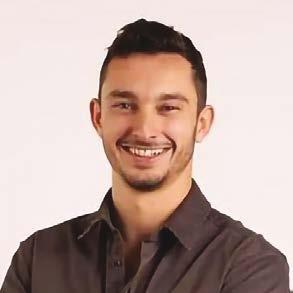
Liam Shrem, 26, was murdered by Hamas terrorists at the Nova Music Festival on October 7th.
Liam was about to start his third year at Reichman University and had already accepted a job as an intern at the prestigious international financial corporation PwC.
Last year, Liam won first place in the student social entrepreneurship competition at Reichman University, bringing to Israel the SPLASH project, a global social enterprise connecting sport, art, and community. The goal of the project is to renovate basketball courts and get them painted by local artists, thus encouraging people to have a healthier lifestyle. His true passion was renovating worn basketball courts in less desirable areas to make them an attractive place for the communities living there.
Simona, Liam’s mother, explains, “His big dream was to continue the courts. He was just beginning to spread internationally, opening his first one in London. We will continue his project and commemorate him. We want to open courts around Reichman University and in Yarkon Park. Thousands attended his Shiva, he was loved so much. He was strong and gave to everyone, touching all of his friends. He was my only son. I am crushed. Liam was a happy child. Never went to bed sad in his whole life, and always woke up happy. He was a man with dreams and he wanted to enlist as a combat soldier in the army despite being exempt from combat units due to being an only child. He insisted to enlist into a combat unit and he served as a combat commander in the Netzach Yehuda unit.”
While trying to escape from the Nova Music Festival in Kibbutz Re’im, Liam’s car was surrounded by terrorists who shot at him at close range. He was killed instantly.
Liam was an only child and is survived by his mother, Simona Shrem.


14 | Herzliyan 2024
Omri Ram, z”l
Murdered in the Swords of Iron War Student in Economics and Business Administration
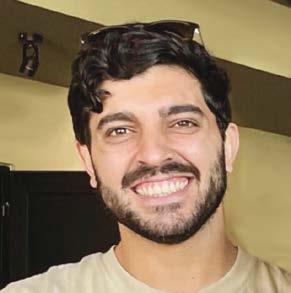
Omri Ram (29), originally from Aseret, was murdered by Hamas terrorists at the Nova Music Festival on October 7th.
Omri was a charming and beloved young man who loved life. He always had a smile on his face and spread light and love just by his presence. Omri was a true optimist. He was always happy to help those in need. Omri was an avid football fan, and Maccabi Haifa was his favorite team. He was slated to complete his Business Administration and Economics degree at Reichman University and had recently returned from a semester abroad at the highly esteemed Science Po in Paris.
Omri was a combat soldier in an elite intelligence unit. He had a love for poker since age 12 and became a professional player.


Menashe, Omri’s father, eulogized his son: “He is our eldest son and the first grandson. He was a charming boy who loved everyone and everyone loved him. He spread light, love and joy. He was an entire world. He was killed along with two of his friends and saved many citizens on that fateful day.”
He is survived by his parents Meirav and Menashe, and his siblings, Tomer and Eyal.
15
Major Benji (Benjamin) Trakeniski, z”l
Fell in the Swords of Iron War
Alumnus of the Lauder School of Government, Diplomacy & Strategy
Maj. Benji (Benjamin) Trakeniski (32), was a military officer in the 7th Division who was killed in battle in Kibbutz Be’eri on October 7th, while fighting fiercely to save the lives of dozens of kibbutz members. Benji was engaged to the love of his life, Rotem Simon, and they were planning their upcoming wedding in April. Through her tears, Rotem read out her wedding vows to Benji at his funeral as a eulogy.
Benji was a graduate of the Lauder School of Government, Diplomacy & Strategy, a member of the management team of the University’s Ofek Forum, and a leading and influential student, a beacon of light, joy, and volunteerism. As a leading member of the Ofek Forum, on a fully voluntary basis, he was the point of contact for all students who served in the IDF reserves. He took care of them, thought about ways to improve and enrich their studies, offered a listening ear, was a true friend, and never gave up on anyone.
Sharon, Benji’s younger sister, writes: “Benji was a big brother in every sense of the word, with endless and almost fatherly concern. Everyone, even complete strangers, felt that ‘Benji changed their lives’, and he did so whether in the most momentary contacts or years-long connections. He had the ability and desire to do for the sake of doing. Certificates, recognition, and rewards never motivated him. He didn’t just choose to study at Reichman University, he loved it. He saw his potential within the institution and invested a lot to realize it. He took advantage of it – as he did with all other areas of his life – to the fullest”.

Sharon continues, “But before anything else, Benji was a playful guy with sparkling eyes, who liked to tease me, to dance, who had a rolling, infectious laugh, that would turn his face red. His soldiers adored him and always found the smile beneath the serious commander – the commander who broke ranks when he came to talk to them, the friend who was such a central core among the various friendship groups he maintained at home.”
Israel Trakeniski, Benji’s father says that other than being brave and strong, Benji was a man with a big huge heart who always wanted to help. “At the age of 5, he donated his pocket money to help keep a learning center open. At age 6, he would wait every morning at the entrance to his classroom to help a girl who suffered from paralysis in her legs to sit in the first row, and at the age of 7, he forced me to take him to volunteer with me at the center for children suffering with cerebral palsy. Benji had a motto in life, ‘Be strong’ and with this motto, I try to continue living a life that seems so empty without him.”
When they awoke on October 7th, he left his fiancee and despite being an off-duty soldier, he drove to his base and headed south. His father, Israel explains that, “Benji and his team were the first force to go in and rescue the wounded in Be’eri. They managed to eliminate terrorists and help families who were hiding. Benji rescued close to 50 of the wounded.”
Benji is survived by his fiance Rotem, his father Israel, his mother Liz Trakeniski Bennett and his sister, Sharon.
16 | Herzliyan 2024
Sgt. First Class (res.)
Joseph Yosef Gitarts z”l
Fell in the Swords of Iron War
2
nd year student in BSc Computer Science at the Raphael Recanati International School
Sgt. First Class (res.) Joseph Gitarts z”l, a courageous tank driver under his company commander, exhibited unwavering dedication to duty on the battlefield. He fought in the 7029th Armored Battalion in the “Re’em” formation (179) and was killed after an anti-tank missile hit the tank he was driving in South Gaza. He was slated to be released from IDF reserve duty just five days later.
Gitarts and his parents immigrated to Israel from Russia when he was 12, and at 25, he was a new-generation Russian-Israeli, embodying the spirit of Zionism and love for his country, expressing these sentiments on numerous occasions.
Beyond his military service, Gitarts excelled as a top student at Reichman University, and was going into his second year of Computer Science. He was a part of the Upstart Entrepreneurial Program, was an honors student and a class representative, and despite all of that, had one of the top averages in his class.


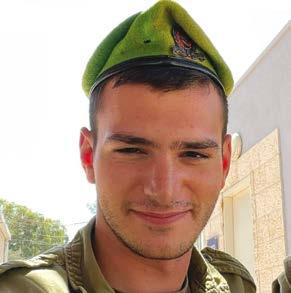
Professor Yaacov Hel-Or, Dean of the Efi Arazi School of Computer Science, remembers Joseph as an inquisitive student, consistently ranking among the top in class. Gitarts’ classmates, recognizing his excellence, elected him as their class representative, highlighting his popularity.
Upon joining the University, Gitarts wrote, “At the University, I will have the unique opportunity to meet and exchange ideas with people from all around the world who, despite having diverse backgrounds, share similar aspirations and are unified on the most pressing issues.”
The only solace may be found in Gitarts’ own farewell message to his parents: “Dear Mom and Dad,” he wrote in Russian, “I love you very much. Everything is as it is supposed to be. I have chosen this. I had a good and interesting life. And yet, I was never afraid of death. I could have skipped reserve duty and hid. But this would contradict everything I believe in and appreciate, and who I consider myself to be. So I didn’t really have a choice, and I would do the same if I could choose again. I came to this decision by myself and stuck with it until the end. I fell proudly for the sake of my people. I have no regrets… Please, find something positive in all of this. Spend time with your grandchildren. Help Israel. I am OK.”
Joseph is survived by his parents Yakov and Larisa, his siblings Zeev, Ida, Asaf and Michael.
17
Sgt. First Class (res.)
David Schwartz z”l
Fell in the Swords of Iron War
3 rd year Bachelor’s Degree student in Law and Government
Sgt. First Class (res.) David Schwartz z”l, fell in battle in Khan Younis, Southern Gaza, when he was hit by an anti-tank missile. 26-year-old Schwartz from Elazar, a third-year BA student in the Law and Government program, fought in the ‘Combat Engineering Corps’ 8219th Battalion in the 551st Brigade (the half-fire formation).
Ran, one of his best friends from the University, wrote, “I don’t even know how to begin, how to eulogize a person, a friend, a brother, a warrior. You know, I didn’t tell you this, but I believe there are people walking around here, just like men in the physical world we live in, but their being is the being of angels. You were like that, on a daily basis, in who you are, in your personality, and above all in the modesty and the way of the land that you projected towards all those around you.”
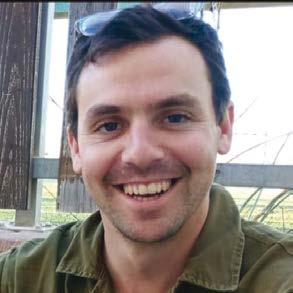
His wife, Meital, paid tribute to him at the funeral: “My David, you are so talented in writing and speech, it was always important to you that the message be clear and reach everyone. I loved watching you from the side when you write. We celebrated our third wedding anniversary on Sunday; we wanted to start a family together. Instead, I am joining the bereaved families. So many shattered dreams, I cant imagine myself without you. There will not be a night that you won’t be in my dreams. I promise you that I will be strong. It will take me a long time, but I will be strong. I know that’s what you want.”
David’s mother, Sara, eulogized him: “You went to war with all of Israel who stand for their lives. You promised you would return in peace – you were full of confidence and invincible. Everyone who came into contact with you saw that you were a pure person, a man of truth who fights against injustices. God gave me a special gift for 26 years.”
David is survived by his wife Meital, parents Yair and Sara and his five brothers.


18 | Herzliyan 2024
Idan Shtivi
Abducted and taken to Gaza during the attacks on October 7 th
2 nd year Bachelor’s Degree student in Government and Sustainability
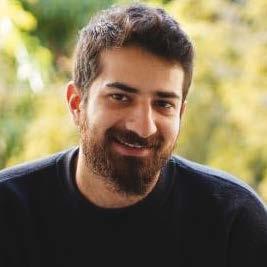
Idan Shtivi, a 28-year-old second-year Government and Sustainability student at Reichman University, was abducted and taken to Gaza during the attacks on October 7th.
At 6:00 AM on October 7th, Idan attended a gathering in Re’im and served as a volunteer photographer, capturing moments of the event.
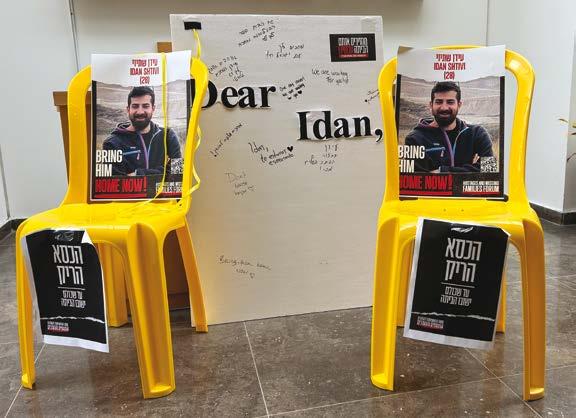

Idan, known for his altruistic nature and desire to make a positive impact, participated in a volunteer program in Africa aimed at assisting children. His peers at the University regard him as an animal enthusiast deeply connected to nature. Those acquainted with Idan recognize him as a true friend.
Currently, Idan's whereabouts remain unknown, leaving his family and friends in an ongoing effort to reunite him with his loved ones.
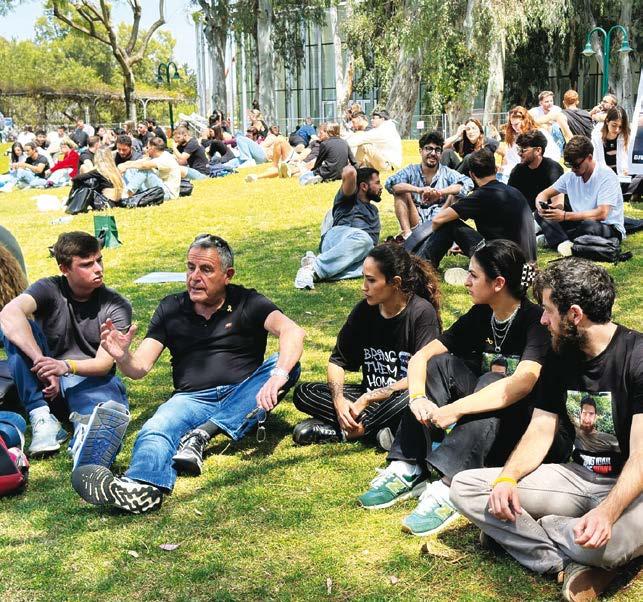
Reichman University students and staff gather with Idan Shtivi’s friends and brother, and Jonathan Davis, for a minute of silence followed by discussion circles to mark six months since October 7th
19
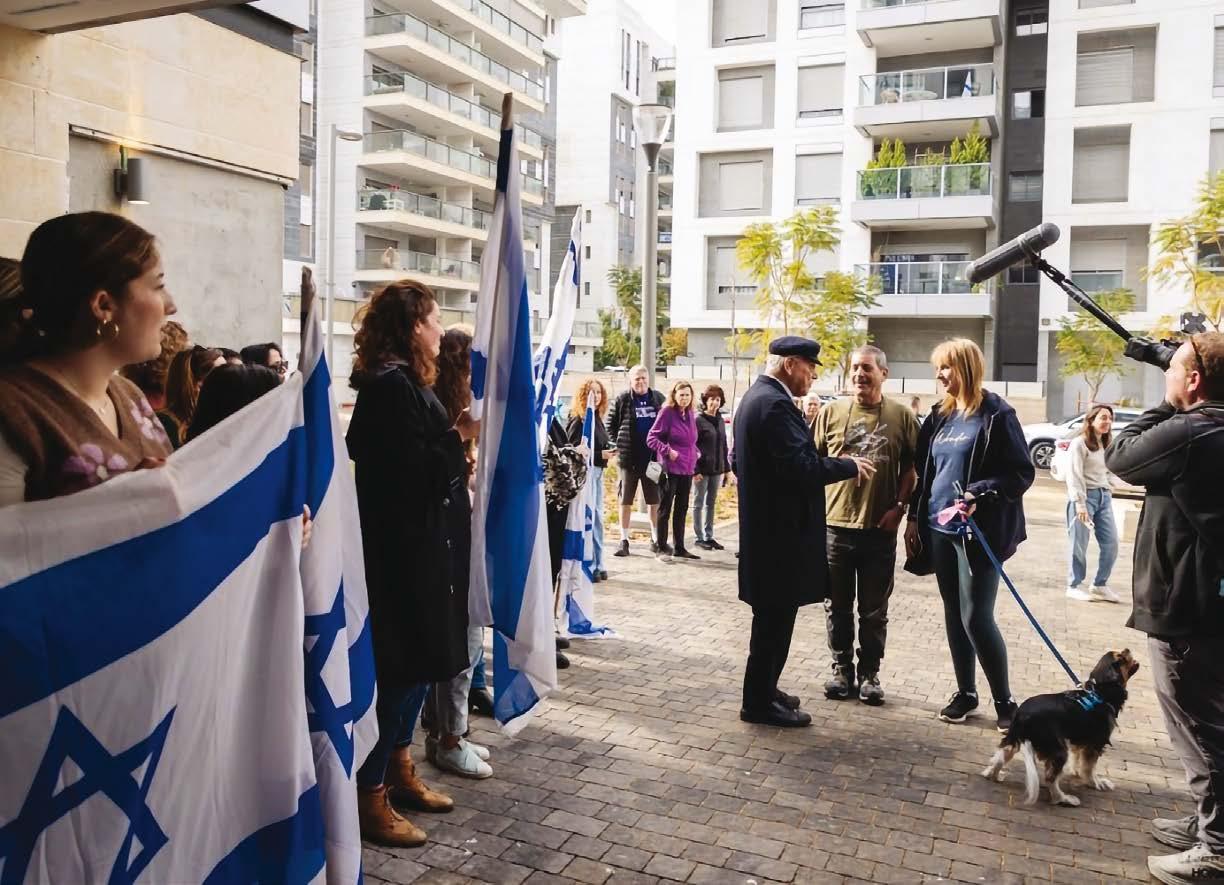
KIBBUTZ KFAR
AZA AT REICHMAN UNIVERSITY
By Jonathan Davis
Head of Raphael Recanati International School and VP External Relations at Reichman University
But the more they were oppressed, the more they multiplied and grew.”
20 | Herzliyan 2024
Prof. Reichman welcomes the residents of Kfar Aza to the Ronson Dorms
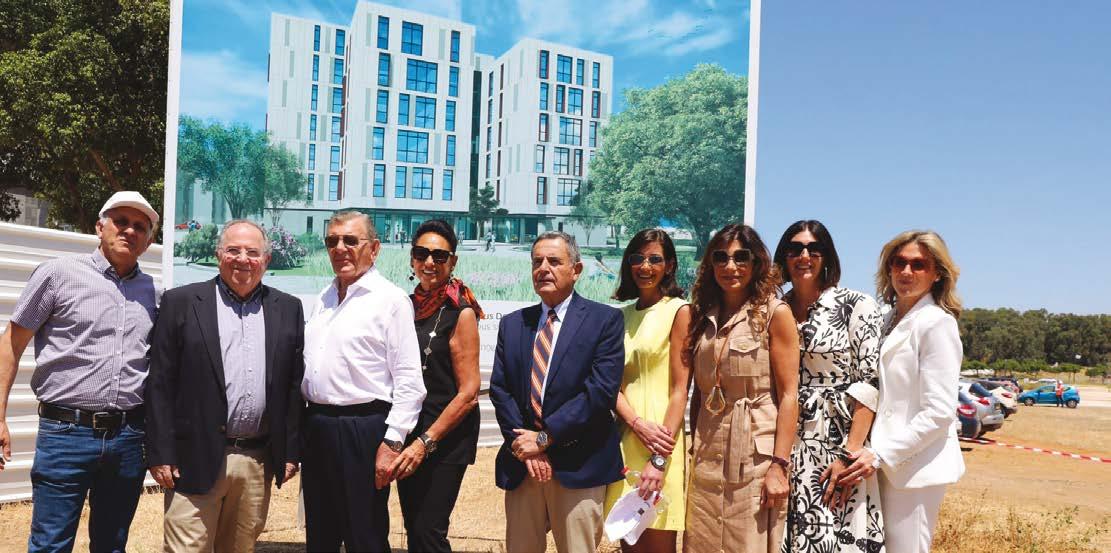
IN THE CORE OF WESTERN NEGEV
Nestled bordering the Gaza Strip, the resilient Kibbutz Kfar Aza epitomizes endurance in the face of adversity. Founded along the 1948 ceasefire lines subsequent to the War of Independence, it has continually been faced with security issues like border breaches, crop burnings, small arms fire, and missile strikes. Positioned on the conflict’s frontline since the 1950s, the community has staunchly maintained its Zionist principles, navigating an array of obstacles.
On October 7th, 2023, amid Simchat Torah celebrations, Kfar Aza was struck by an unexpected onslaught from numerous Hamas militants. This horrific event claimed over 1,200 lives, representing one of the grimmest periods in Israel’s post-Holocaust history. The threeday onslaught, reminiscent of the ferocity of ISIS and Nazi forces, wreaked havoc in the region. Tragically, more than 70 individuals at Kibbutz Kfar Aza, including children, infants, and the elderly, lost their lives, with 18 individuals being taken as hostages to Gaza.
The kibbutz was ultimately freed following an extended conflict with IDF soldiers, yet the psychological and emotional wounds remained. The inhabitants were transformed into modern-day Jewish refugees seeking refuge across Israel.
ENTER PROF. URIEL REICHMAN
Prof. Uriel Reichman, founder of Reichman University, upon learning of this predicament, committed himself to assist. Renowned as a trailblazing academic innovator in Israel, he transformed a derelict anti-aircraft site in Herzliya into a flourishing, private, non-profit university. Navigating the complex Israeli bureaucracy for over 30 years, Prof. Reichman faced initial opposition from civil servants against authorizing undergraduate, graduate, and PhD programs. Despite these challenges, he gained recognition for the university as a prominent private and non-profit Israeli institution. Moreover, he partnered with the Recanati Family to establish Israel’s largest international school, the Raphael Recanati International School, offering full-time undergraduate and graduate English-taught programs to more than 2,400 students.
21
Cornerstone laying of the Ronson Dorms with (from left): VP Logistics Avi Nissim, former Reichman University President Prof. Rafi Melnick, Sir Gerald Ronson, Dame Gail Ronson, Jonathan Davis, Hayley Ronson, Lisa Althasen, Amanda Ronson and Nicole Ronson Allalouf
WELCOMING KFAR
AZA RESIDENTS
The cutting-edge Ronson Dormitory on the university campus welcomed the displaced Kfar Aza community members. At a Reichman University ceremony, Prof. Reichman greeted the residents, offering them a temporary haven. The event saw the presence of Prof. Boaz Ganor, senior administrators, faculty, and staff. Prof. Reichman’s speech mirrored the university’s foundational values, grounded in the Declaration of Independence, with a focus on liberty, responsibility, and humanistic Zionist ideals.
He emphasized the university’s adherence to Zionist values, offering priority in admissions to elite military unit officers and additional support for reservists. Recognizing the alignment of the new Ronson dormitory’s completion with the needs of Kfar Aza’s inhabitants, Prof. Reichman swiftly acted, considering it a demonstration of Zionist social commitment. The partnership was lauded as an ideal synergy, symbolically described as a “heavenly match” or “bashert.”
Adi Sagi, a long-time kindergarten teacher from the adjacent kibbutz of Nachal Oz, expressed heartfelt thanks to Prof. Reichman at the event. Reflecting on her role, she highlighted her commitment to aiding children needing extra support. She drew parallels between the shared Zionist values of the kibbutz and Prof. Reichman, tearfully recollecting the hardships experienced by her community, including the loss of loved ones, abductions, and homelessness. Both stand as embodiments of the Zionist ethos, each contributing distinctively to Israel’s foundation and preservation.
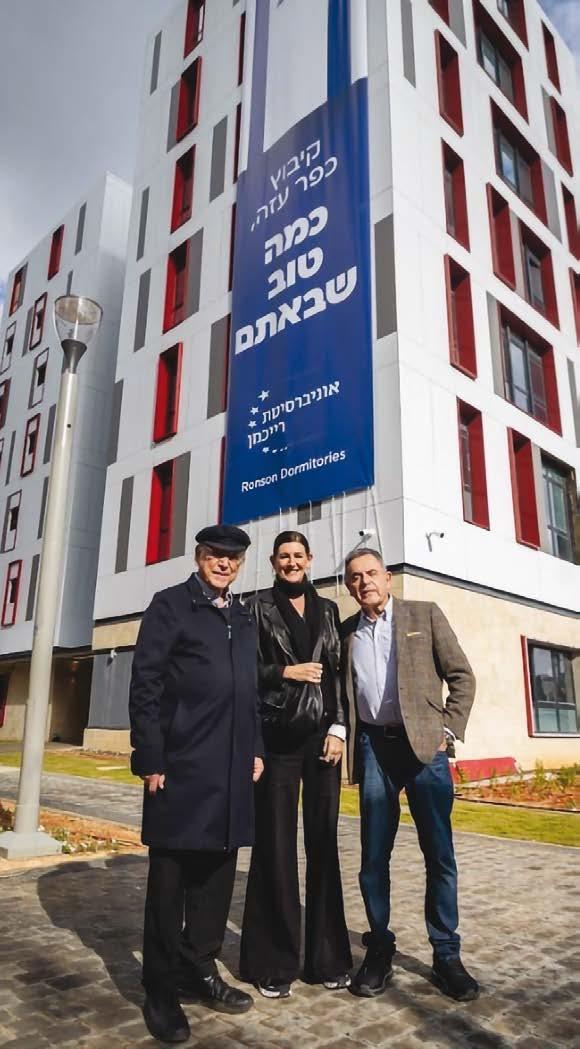
22 | Herzliyan 2024
Prof. Reichman, Amanda Ronson and Jonathan Davis outside the Ronson Dorms
THE LONDON CONNECTION:
SIR GERALD RONSON
Five years earlier, I had the privilege of meeting Sir Gerald Ronson in his London office. My encounter with such a distinguished business leader, devoted to Zionism, fostering positive change, and aiding the needy, was humbling. Our esteemed Institute for Counterterrorism (ICT) at Reichman University was well aware of Sir Ronson’s extensive efforts to enhance and ensure the safety of individuals and Jewish organizations in the U.K. through his founding of the Community Security Trust.
During a winter visit to London representing Prof. Reichman and the University, in pitching the University and Prof. Reichman’s vision, I boldly requested Sir Ronson to consider naming our fourth dormitory in line with others like Recanati, Cramer, and Arison. His response was one of genuine interest in aiding needy students and exploring possibilities for this. Our agreement was cemented with a firm handshake.
KFAR AZA RESIDENTS SETTLE IN
When Sir Gerald and his wife, Dame Gail Ronson, personally met with Prof. Reichman, it was unimaginable that soon after the dormitory’s completion, Kfar Aza’s community members, in dire need of a refuge, would relocate there. This narrative unveils the interconnectedness of a Zionist university’s founder, a devoted kindergarten teacher from Kibbutz Kfar Aza, and a distinguished London-based Zionist philanthropist, crafting an unanticipated chapter in the university’s history.
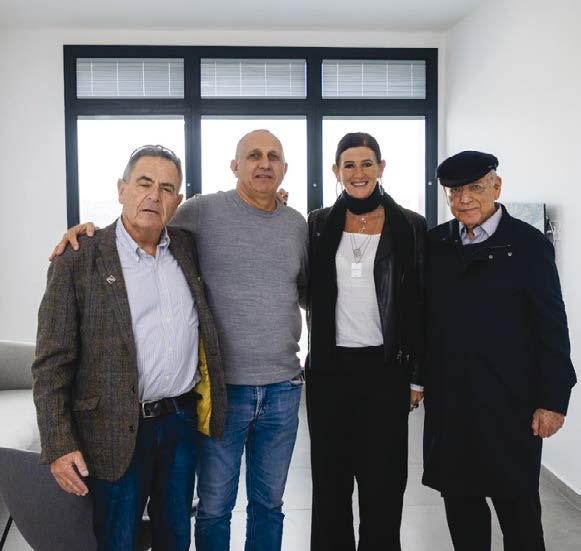
SETTLING IN: THE ARRIVAL OF THE NEW RESIDENTS
As the Kfar Aza residents began their new lives in the apartments, the support they received extended beyond mere accommodation. Upon their arrival, they occupied 20 fully furnished apartments in the Ronson dorm. Necessary amenities, including bedding and kitchenware, were generously supplied by esteemed alumnus Tzachi Arabov, right down to the floral decorations on the tables. On Friday nights, an anonymous London benefactor donated bottles of Israel’s premium wine.
A TESTAMENT OF RESILIENCE
Worldwide, as synagogues read Exodus Chapter 12, verse 1, the message resonates: “But the more they were oppressed, the more they multiplied and grew.”
Despite their trials, the residents of Kfar Aza are poised to thrive and contribute to a new chapter in the ongoing narrative of modern Zionist history.
Jonathan Davis, Avi Nissim, Amanda Ronson, and Prof. Uriel Reichman
23
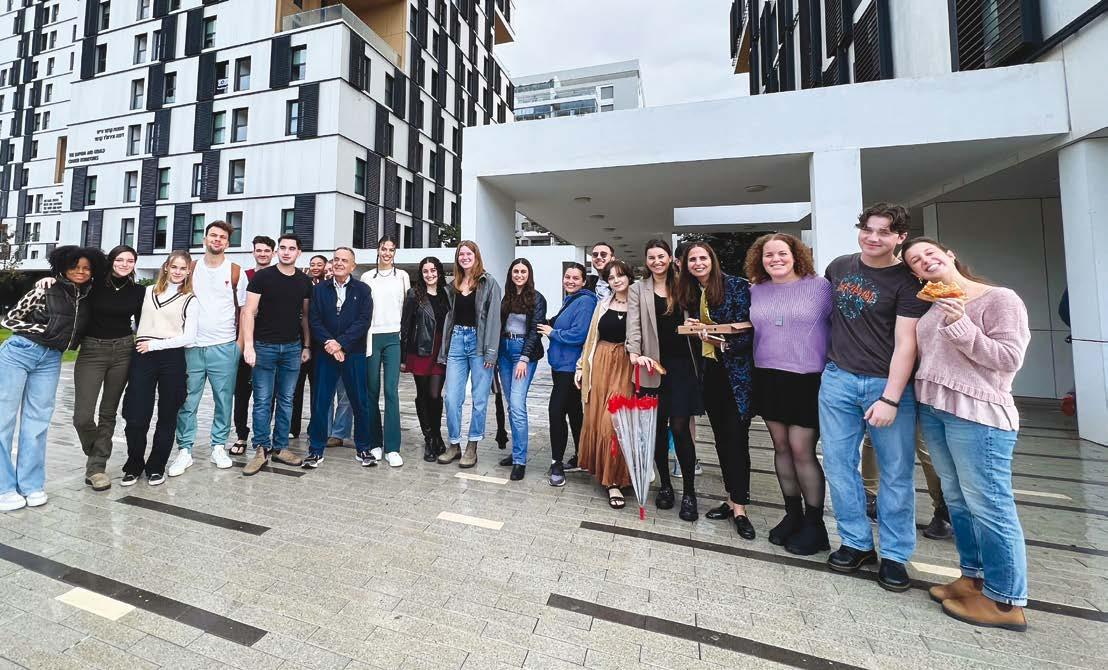
OPENING THE SCHOOL YEAR DURING THE SWORDS OF IRON WAR
RAPHAEL RECANATI
INTERNATIONAL SCHOOL
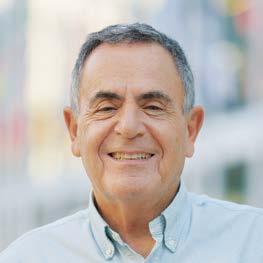 Jonathan Davis meeting with international students for the weekly pizza lunch
Jonathan Davis meeting with international students for the weekly pizza lunch
24 | Herzliyan 2024
Jonathan Davis, VP of External Relations and Head of the Raphael Recanati International School
Amidst the Swords of Iron War, the Raphael Recanati International School embarked on the challenging endeavor of opening the academic school year. Welcoming our international students to campus against the backdrop of the conflict that unfolded on October 7th, we recognized the unique stresses and uncertainties they faced. In response, our commitment to providing unwavering support became a paramount priority.
Immediately addressing the need for connection, we worked diligently to establish consistent and constant communication channels with our students, whether they were arriving on campus or stuck abroad due to the war. Ensuring their safety and fostering a sense of connection became our collective mission. Through hundreds of phone calls with students and concerned parents, we sought to provide reassurance and guidance.
Our efforts extended beyond mere communication. Daily coffee gatherings were arranged for students and counselors, creating a space for informal yet vital conversations. Additionally, we organized pizza and falafel lunches on the dormitory lawn, bringing together Raphael Recanati International School staff and students in a relaxed and supportive environment. These initiatives were integral in not only offering entertainment and relaxation but also in cultivating a sense of community during these challenging times.
Our Ethel and Leonard Tigay Sports and Cultural Program kicked off with weekly sessions, including krav maga, basketball league, meditation, painting and yoga sessions.
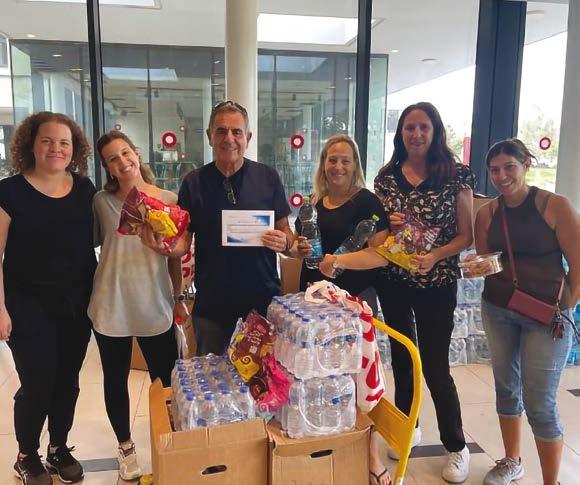
To foster a sense of community and alleviate tension, we also organized gym workouts, Kabbalat Shabbat, and movie nights in the dorms.
In the face of adversity, the Raphael Recanati International School demonstrated a steadfast commitment to the well-being and connectivity of its students. Through strategic initiatives and a dedication to fostering a supportive atmosphere, we aimed to ensure that every individual, whether on campus or navigating challenges abroad, felt a sense of safety, connection, and community.
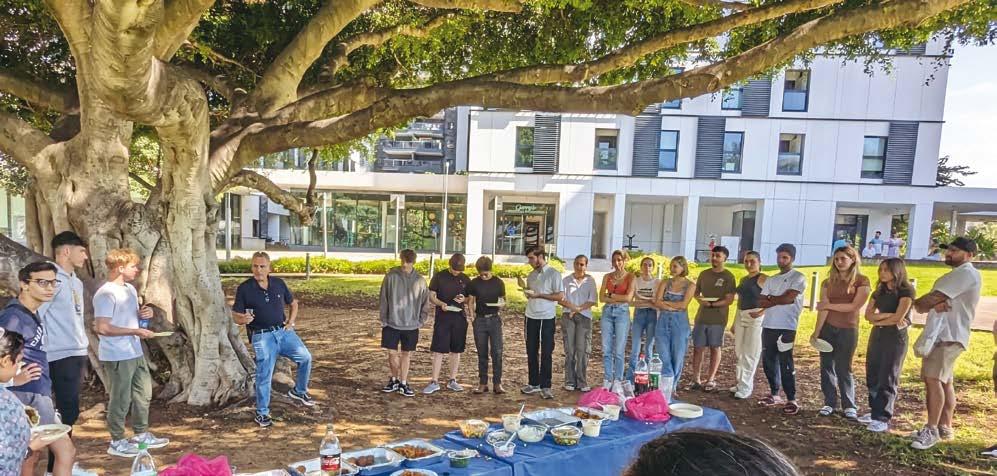
KEEPING OUR STUDENTS BUSY BEFORE THE SCHOOL YEAR OFFICIALLY BEGINS
Jonathan Davis engages with staff and students over a falafel spread during our weekly lunch meetups on campus for international school students
25
Jonathan Davis with RRIS Director Carine Katz, Campus Life Events Coordinator, Anni Lupo, and the dedicated RRIS team, preparing surprise packages for new and returning students
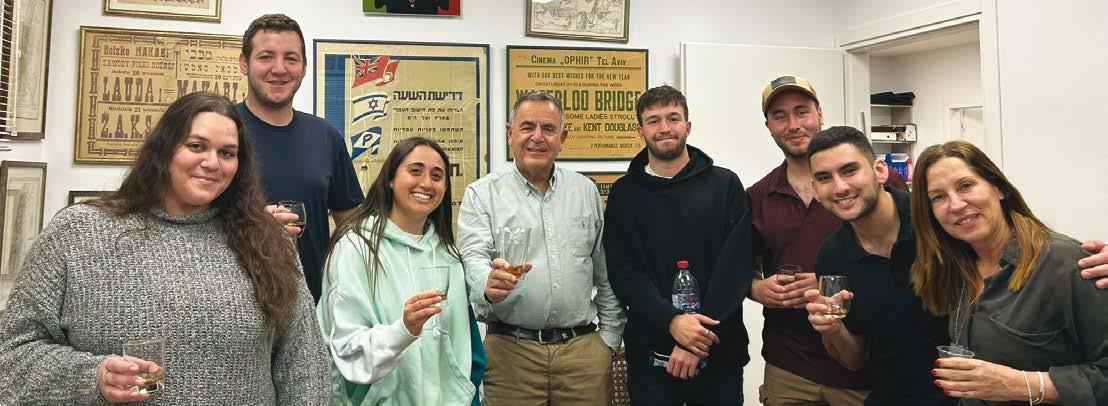
Reservists raising a toast to their safe return in Jonathan Davis’ office:
Nichole Amar, 3rd year Government Student from USA, Meital Wiederhorn, 2nd year Psychology student from USA, Levi Michael, 2nd year Business Administration student from Israel/USA, Nir Horowitz, 2nd year Business Administration student from Hong Kong, David Needle, 3rd year Government & Sustainability student from USA, and Alex Neugroschl, 3rd year Communications student from USA
OPERATION ROOMS ON CAMPUS
The university took a proactive approach by establishing several operations rooms on campus. These spaces were open to international students, with many signing up to volunteer in various capacities. According to Jonathan Davis, VP of External Relations and Head of the Raphael Recanati International School, “Witnessing these young individuals, the emerging generation, contribute to Israel and their communities is truly heartening. We welcome our international students who have either resumed their studies or embarked on a new academic journey here. We recognize that opting to come to Israel in the current circumstances was neither the easiest nor the most comfortable choice. Yet, you can take pride in the fact that you courageously took the leap and made this decision, reflecting your profound commitment to our country.
Your presence and contributions play a vital role in enriching and strengthening the fabric of our nation, fostering a sense of unity and we salute you for this.”
Among the operations rooms established were:
RESERVISTS OPERATION ROOM
Over 3,000 Reichman University students, including 600 lone soldiers from the International School, were called to reserve duty by the IDF, and the university keeps in close touch with each one of them. A dedicated team sorts, collects and delivers essential donations and care packages tailormade for students, staff, and alumni currently serving in the IDF. These packages provide much-needed sustenance and emotional support to our brave servicemen and servicewomen.
PUBLIC RESILIENCE WAR ROOM
In recognition of the profound psychological toll that war exacts on our community, the University established a support network to provide psychological assistance and counseling to those in need from within the Reichman University community and outside of it. Some faculty members and RRIS students traveled to the south to assist the survivors. The mental and emotional wellbeing of students, staff, and their families is of the utmost importance.
PUBLIC DIPLOMACY OPERATION ROOM, ACT.IL
The university’s dedicated team is actively engaging in promoting and advocating for the case of Israel on various social media platforms. This initiative helps raise awareness about the complex situation in the region, identifying fake news and garnering international support. As the largest international campus in Israel, Reichman University has invested in a dedicated hasbara operations room staffed by hundreds of international students, manning the French, German, Spanish and Italian desks at ACT.IL, to effectively legitimize Israel’s position on this war as well as actively and effectively combat antisemitism, anti-Israel sentiments, and terrorism online.
26 | Herzliyan 2024
Honoring the sacrifice of the Druze community
RRIS students and staff travelled to Daliyat El-Carmel
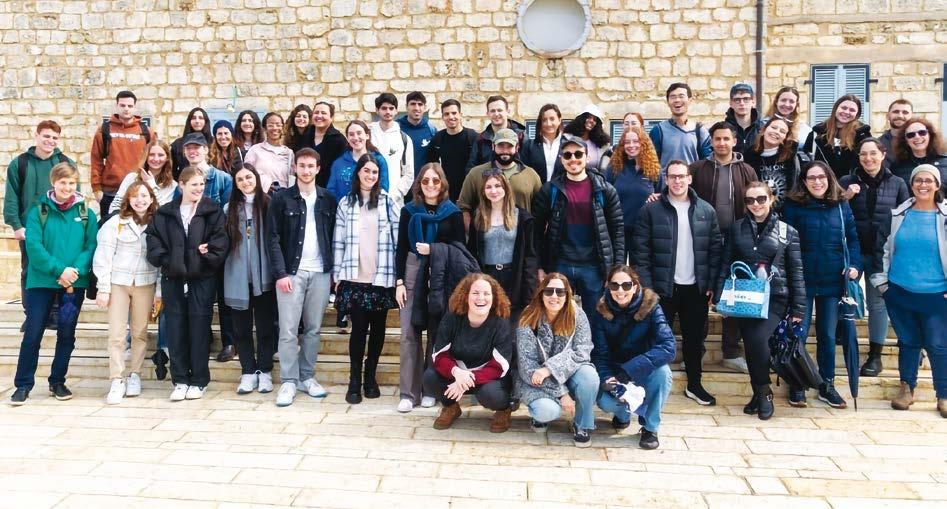
DALIYAT EL-CARMEL: A JOURNEY INTO THE DRUZE COMMUNITY
The RRIS enjoyed a day trip to Daliyat el-Carmel, where they visited a Druze community. Special emphasis was made on the sacrifice of the Druze community in order to defend the State of Israel during this war and all previous wars. As Jonathan Davis quoted Winston Churchill, "Never in the field of human conflict was so much owed by so many to so few."
Listening to the needs of our reservists
Witnessing these young individuals, the emerging generation, contribute to Israel and their communities is truly heartening.”
– Jonathan Davis
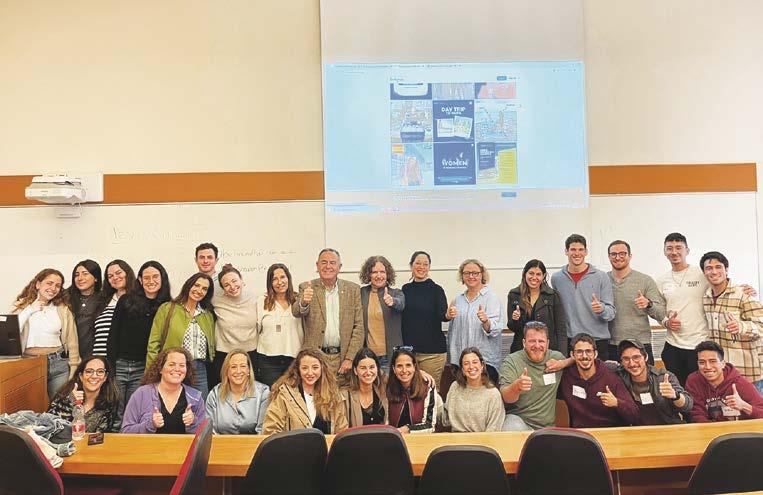
Students pictured:
Samuel Hazins, Business Administration, Menachem Mendle Reinitz, Government, David Sanders, Economics and Entrepreneurship, Moise Yannis Xethalis, Business Management, Talia Balogh, Psychology, Ariel Dissen-Klein, Business & Economics, Aviv Harel, Economics and Entrepreneurship with Data Science, Jacob Rosenbloom, Government, Ari Lewin, Communications, Avigayil
Finley, Communications, Nichole Amar, Government, Avija Gross, Government, Shelly Ness, Communications, Raffy Levey, Government
27
SPECIAL EMERGENCY SCHOLARSHIPS FOR NEEDY RESERVISTS
Special scholarships for needy students among our more than 4,000 reservists in the IDF include personal tutoring, psychological services, rehabilitation and recovery activities, and much more. Only the best for the University’s finest. Support ensures the successful implementation of these initiatives and contributes to the seamless integration of reserve soldiers into academic life.
Hundreds of international students who remained in Israel at the start of the war, and were not called up for reserve duty, volunteer for the different opportunities offered on campus
AGRICULTURAL VOLUNTEERING
Demonstrating a profound commitment to community engagement, the University’s staff and students include hundreds of international students, actively volunteered to support farms in the south, which had experienced a notable loss of labor due to the ongoing circumstances. Their tireless efforts included tasks such as planting and picking avocados, tomatoes, and lettuce. This demanding yet essential labor stands as a source of pride for our community, and we commend their dedication and hard work in contributing to the collective well-being of all involved.
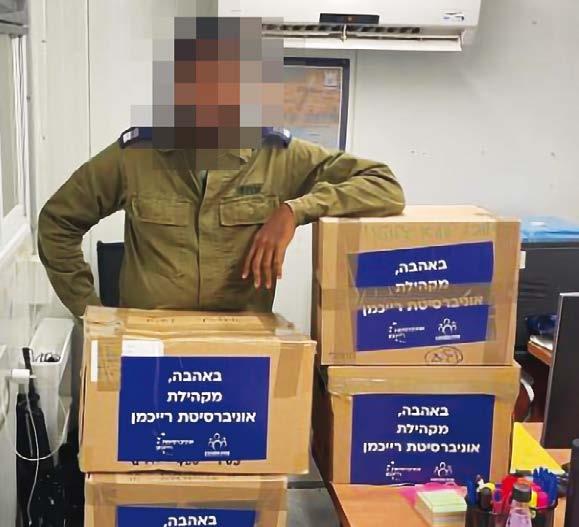
Our student, an Iron Dome commander who was sent six full boxes of goodies from us to the field. A few days ago, he was in Florida, finishing his internship at Jazwares and now, he’s shooting down rockets
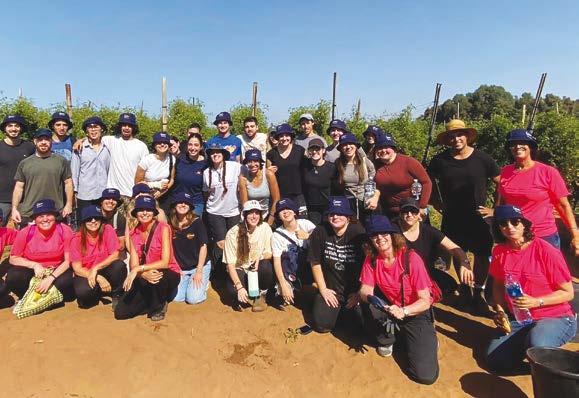
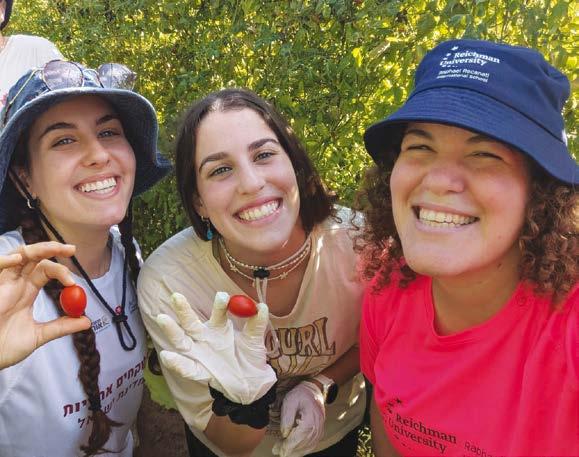 Raphael Recanati International School students and staff at an agricultural volunteering initiative
over Israeli cities
Adi Zohar, first-year Psychology student from the U.S., Hila Zohar, first-year Communications student from the U.S., and Anni Lupo, Campus Life Coordinator for the Raphael Recanati International School
Raphael Recanati International School students and staff at an agricultural volunteering initiative
over Israeli cities
Adi Zohar, first-year Psychology student from the U.S., Hila Zohar, first-year Communications student from the U.S., and Anni Lupo, Campus Life Coordinator for the Raphael Recanati International School
28 | Herzliyan 2024
APPLICATION CHECKLIST:
Anti-Zionist protests on campus
Institutionalized antisemitic environment
Championing terrorism as a form of social justice
Denunciation of genocide regardless of “context”
Safe learning environment for all students
One of the most outstanding research universities in Israel
Diversified student body from more than 90 countries
2500 international students on campus
Variety of 20 undergraduate & graduate degrees fully taught in English
Over 130 South African students on campus
You’ll get to live in Israel, and study in English


Follow us on Our website 29
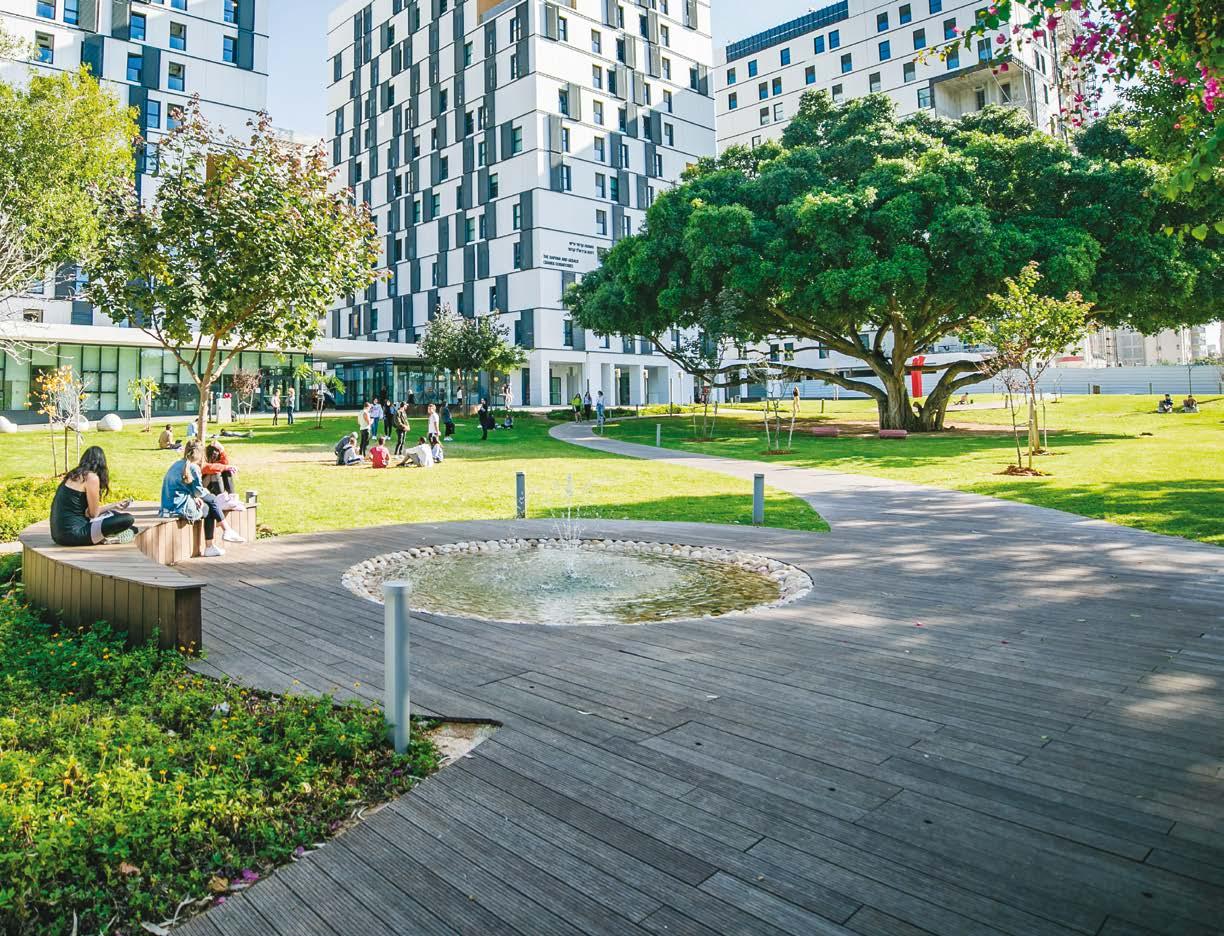
AMERICAN FRIENDS OF REICHMAN UNIVERSITY
Immediately following the horrific events of October 7 th , Reichman University alumni based in the United States sprang into action to assist in the developing war in Israel.”
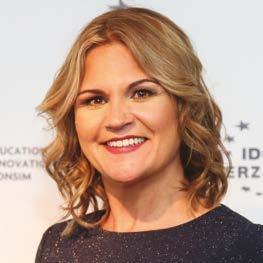
30 | Herzliyan 2024
Leslie Skyba Executive Director, American Friends of Reichman University


THANK YOU
AMERICAN FRIENDS OF RUNI
American Friends’ support of Israel is unwavering. Thank you to our donors and alumni for their support of our emergency fund at Reichman University. You have made a significant difference in the lives of so many of our students and we are grateful.
Adler, Brenda
Barach, Philip & Danielle
Bauman, Shira
Bar, Carmit
Barnea, Uri
Barry, Steven
Berenson, Jeffery
Cramer Famiy Foundation
Deutsch, James
Doran, Bill
Druckman, Jonathan
Genet, Ben J & Dorit
Genet, Jessica & Larry
Gil, Eran
Ginsberg, William
Greenberg, Samantha
Guggenheim, Ralph & Marsha
Howard, Scott & Marcie
Jay, Hilary
Jazwares Corporate Match Fund
Julis, Mitch & Joleen
Kaplan, Adam
Kleinman, Jen
Knez, Brian
Kushner, Jonathan & Kim
Lauder, Amb. Ronald S.
Lieb, Kathy
Maislin, Ramon
Medveckis, John
Munk, Bernie
Pantelyat, Olga
Recker, William (Bill)
Regenstein, Daniel
The Reuben Family Foundation
Richard Merage Foundation
Richmond, Michael & Barbara
Rind, Talya
Rothstein, Gidon & Holland, Elizabeth
Segura, Joshua
Sheena, Robert
Simms/Mann Foundation
Siver, Wayne & Kathleen
Slade, Gadi & Deborah
Stone, Sheldon & Cindy
Tenzer, Gil & Orit
The Orland Family Fund
Vitale, Alberto & Gioietta
Vitale, Raffaele
Waterman, Michael & Jacklyn
Weinberger, Neil
West, Loralee & Al
Wind, Yoram & Barbra Eberlin
Wind, John
Yenkin, Miriam & Bernard
Zebersky Family Charitable Fund
31
SUNSHINE & SQUISHMELLOWS
The world-famous toy company Jazwares, recently hosted seven students from Reichman University for a two-month internship program at their headquarters in Sunrise, Florida. This exceptional group of individuals from Reichman University’s “Israel at Heart” program are currently pursuing academic degrees in various fields, including Psychology, Business, Computer Science, and Government.
The students lived together in a house for two months while commuting to the Jazwares campus daily. “Being part of a global toy company allowed me to integrate and expand my knowledge,” said Yovel, one of the students chosen to participate. Throughout their internships, the students contributed to Jazwares’ dynamic projects and got to embrace new experiences that will shape their future endeavors positively. Jazwares was founded by AFRU supporters Judd and Laura Zebersky.
“We extend our heartfelt gratitude to Jazwares for opening their doors to our talented students and supporting them on this journey of exploration and learning. We are confident that this invaluable opportunity will leave a lasting impact on both our students and the organization,” stated Jonathan Davis.
The internship culminated on October 6th with the students set to return to Israel in the days and weeks to follow. After waking up to the news of the October 7th massacre, the students altered their plans and immediately returned to Israel. Upon arriving, many hit the ground running directly to their reserve units to join in the battle for our homeland.
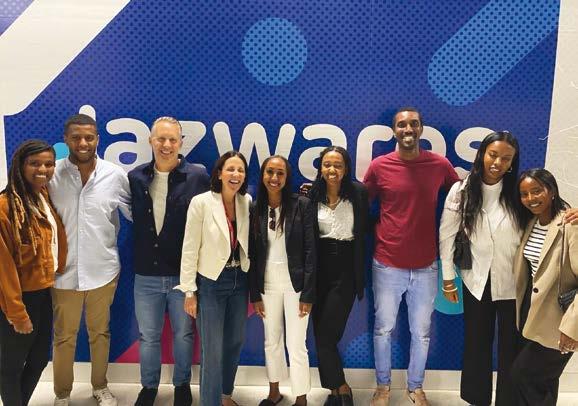

32 | Herzliyan 2024
The Florida interns with AFRU supporters, Judd and Laura Zebersky
THE ADIR CHALLENGE
Morielle Lotan, an alumna and Former Director of the Honors track in Strategy & Decision Making, has transformed personal tragedy into action. Following the murder of her eldest nephew, Addir Mesika, at the Nova Festival on October 7th, she and colleague Dr. Shay Hershkowitz founded the ADIR Challenge.
This global technology and innovation challenge aims to combat antisemitism by harnessing proactive, techcentric solutions. Partnering with organizations like the Anti-Defamation League and the Shoa Foundation, as well as conducting independent research, the Anti-hate, Disruption, Innovation, Response (ADIR) Challenge seeks to leverage cutting-edge ideas and products. Dr. Yossi Maaravi, Dean of the School of Entrepreneurship at Reichman University are key partners, with Yossi serving as an advisor.
Morielle, who has a background in international security, energy, and climate, emphasizes the need for multifaceted strategies in addressing complex social behaviors globally. Reflecting on Addir’s character and sacrifice, she underscores the importance of innovative approaches in tackling one of humanity’s greatest challenges: hate. Despite the unfortunate circumstances, she remains committed to fostering proactive efforts for future generations.
The ADIR Challenge boasts a prize purse of over $1 million and is currently in the fundraising phase, actively seeking global sponsors and partners to launch the competition phase promptly. For more information, visit www.theadirchallenge.com
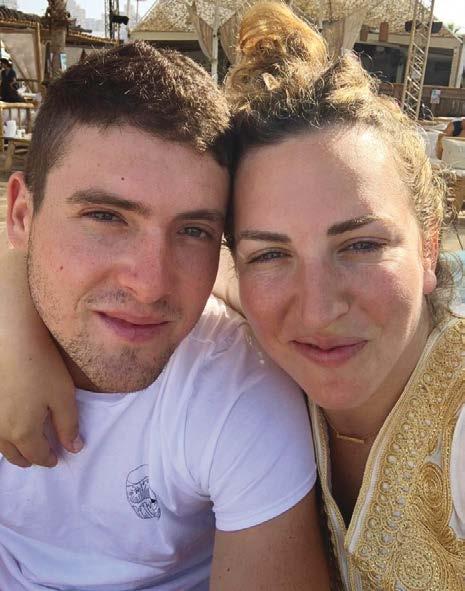
SHIELDS OF STEEL
Immediately following the horrific events of October 7th, Reichman University alumni based in the United States sprang into action to assist in the developing war in Israel.
Spearheaded by alumni Eli Elefant and Maya Shaposhnik Cadena, and a handful of their esteemed colleagues, Sheildsofsteel.org was launched to address military supply shortages due to 360,000 reservists being called up in the war’s first week.
As a group, they utilized their personal contacts to raise money to purchase equipment which would be sent to Israel with IDF compliance. Shields of Steel protects thousands of IDF soldiers by outfitting them with lifesaving helmets, bulletproof ceramic plates and vests.
In January 2024, Shields of Steel hosted a fundraiser called “Understanding Israel”. Over 250 people came together to support this initiative. Shields of Steel is a project of GSD Advisers Inc., a 501(c)3 non for profit organization focused on the security of the Jewish people founded by Joe Richards and Eli Elefant.
33
Addir Mesika z”l and Morielle Lotan
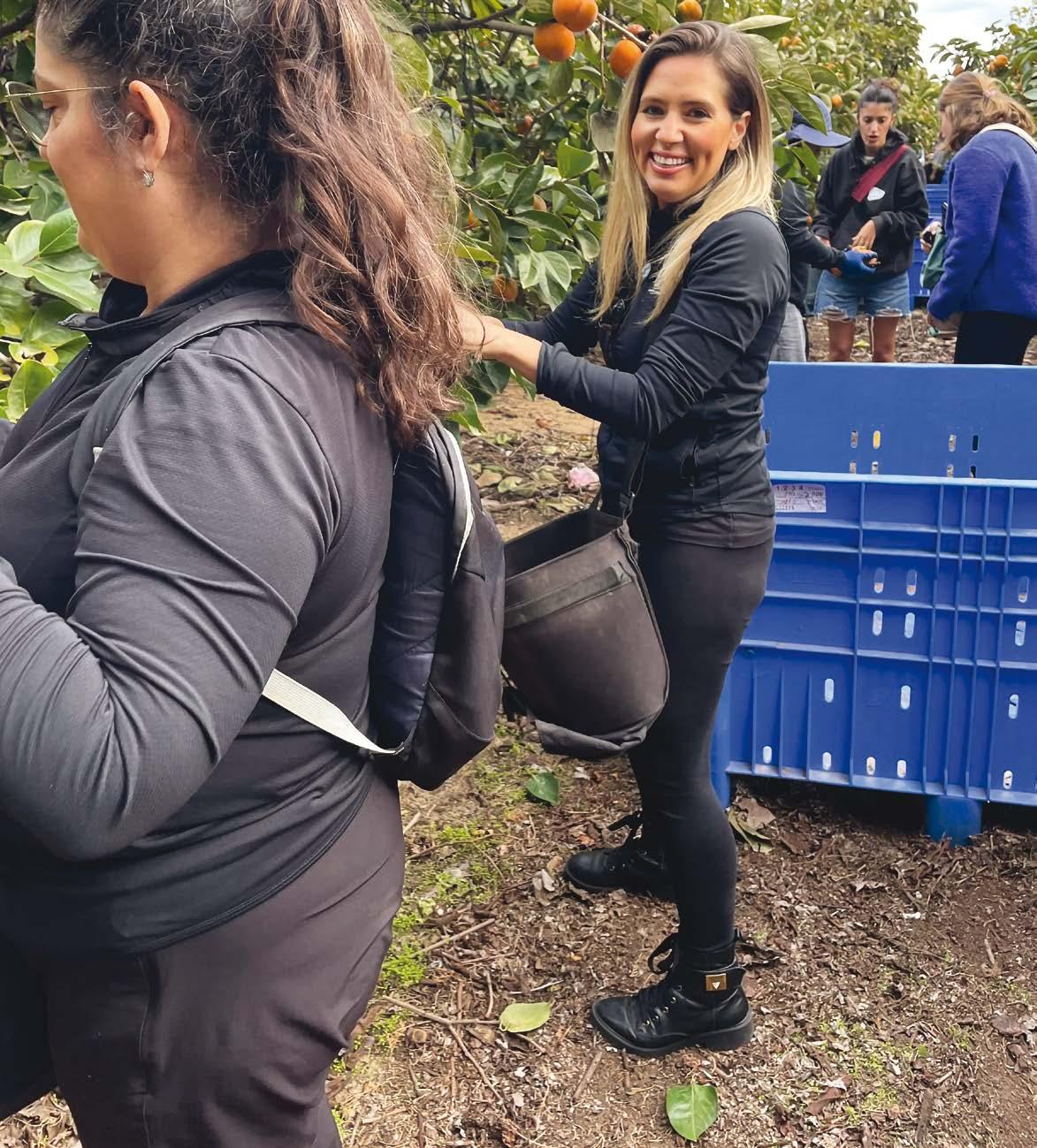
Picking persimmons with the Alumni Association team
RUNI ALUMNI DURING WARTIME
COMMUNITY VOLUNTEERING
Since October 7th, the entire Israeli community has actively sought ways to contribute, whether by packing food and supplies, making monetary donations, assisting in transporting soldiers, or providing shelter for evacuees. The Reichman University Alumni Association has similarly engaged in discussions on the most effective ways to support the community. Initially, it organized weekly webinars addressing the situation, with topics ranging from mental resilience to the challenges faced by the economy. However, recognizing the importance of hands-on involvement, the Association decided to transition from online platforms to on-the-ground activities. This shift allowed alumni to make a tangible impact, experiencing the fulfillment that comes with directly aiding others.
During its inaugural volunteering event on November 8th, 2023, participants gathered at “Collective” in Hod Hasharon to engage in food preparation for soldiers. Working alongside skilled chefs, they contributed by slicing sandwiches, washing lettuce, and packing meals. The most gratifying aspect of the experience was receiving photos of soldiers enjoying the meals they had actively helped prepare.
The Alumni Association arranged a series of webinars that addressed Various aspects of the situation in Israel. Its first session focused on introducing the new University President, Prof. Boaz Ganor, who provided an analysis of the state of the war, its background, and potential scenarios. Additionally, the Association organized a session with Prof. Anat Bronstein-Klomek, Dean of the Baruch Ivcher School of Psychology, who discussed the cultivation of mental resilience during crises. Maj. Gen. (Res.) Amos Gilead joined to explore “What’s next for Hamas”.
Subsequently, the Association held two more sessions: one on the economic effects of the war and available aid, featuring Prof. Zvika Eckstein and CPA Amir Soraya, and another on “The Battle for the Message” with Prof. Moran Yerachi from the Sammy Ofer School of Communications. Recognizing the importance of staying connected with graduates, the Association brought in University experts to analyze the post-war situation and the challenges that arose.
34 | Herzliyan 2024
REICHMAN UNIVERSITY ALUMNI ASSOCIATION HOSTS EVENT HONORING “IRON HEROINES”
On International Women’s Day, and in light of the Swords of Iron War, the Reichman University Alumni Association hosted a panel discussion featuring five inspiring heroines: Capt. Karni Gez, captain of the allfemale tank company that fought on October 7th; Dr. Efrat Bron-Harlev, Director of the Schneider Children’s Medical Center who oversaw the return of children and mothers from captivity; Dr. Cochav Elkayam-Levy, Head of the Dvora Institute, Chair of Israel’s Civil Commission on the October 7th Crimes by Hamas Against Women and Children, and a lecturer at the Lauder School of Government, Diplomacy & Strategy at Reichman University; Saphir Zohav Hamami, partner at Blondy Events, and Reichman University alumna, widow of Col. Assaf Hamami who was murdered on October 7th; and Danielle Aloni, who was held captive by Hamas with her daughter Emilia for 49 days.
CEO of the Alumni Association, Gili Dinstein, who moderated the panel, opened by addressing the challenging reality women face in Israeli society. She noted that such discussions often arise only on the occasion of Women’s Day, emphasizing that “Women’s Day is every day of the year.” Nevertheless, she highlighted the importance of the event, bringing together five remarkable women whom she described as ‘iron heroines’ and an inspiration to all.
Danielle Aloni shared how she created an imaginary world for her daughter to shield her from the harsh realities of their situation. She recounted how she explained to her daughter Emilia that they were in a safe place, inventing a narrative that offered solace amidst turmoil. Aloni’s portrayal of her daughter as the true heroine in their story underscored the resilience and strength found within adversity.
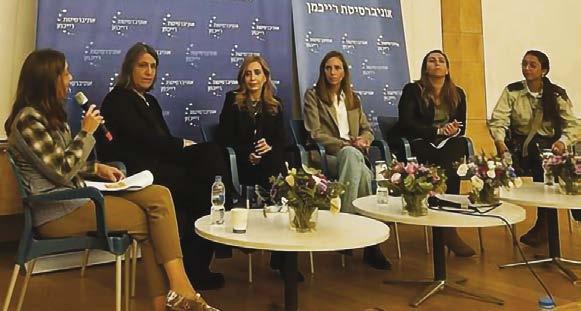
Dr. Cochav Elkayam-Levy reflected on the collective experience of facing violence, asserting that the recent conflict demonstrated that everyone, regardless of gender or age, is on the frontlines. She emphasized the need to speak the truth and seek justice for victims, highlighting the silence of international organizations in the face of violence and the subsequent campaign to share their stories.
Saphir Zohav Hamami recounted the events surrounding her husband’s involvement in the events of October 7th, when at 11:30 on October 7th, she received the knock on the door that no one ever wants to get, and from that moment on, their war began behind the scenes, with all the government and military officials trying to understand what happened to her husband.
Dr. Efrat Bron-Harlev discussed the unprecedented situation faced by her team at the children’s hospital, emphasizing the importance of anticipating the needs of hostages upon their release. Dr. Bron-Harlev’s team created a team that was mostly women. “Most of the hostages were with male captors, and our desire was for them to feel surrounded by warm and professional women.”
Reflecting on the events of October 7th, Capt. Karni Gez acknowledged that nothing had prepared her for the sight of 40 terrorists charging towards them. In the heat of the moment, “We worked like machines, as we were trained. One realizes it’s either oneself or them.”
By day’s end, after enduring hours of fighting, they lifted their heads from the tanks, surveyed the scene, and witnessed flames of fire and destruction. “It was at that moment that the realization of what we have endured dawned upon us.”
From left: Gili Dinstein, Dr. Efrat Bron-Harlev, Danielle Aloni, Saphir Zohav Hamami, Dr. Cochav Elkayem-Levy and Capt. Karni Gez
35
PERSIMMON PICKING: THE GROUP’S SECOND VOLUNTEERING OUTING
Amidst the ongoing war, farmers faced a pressing issue as they struggled with a shortage of labor to tend to their fields, particularly in harvesting produce to prevent spoilage. Responding to this urgent need, on November 28th, 2023, the women of the Alumni Forum united to aid a farmer grappling with a workforce shortage. Their focus was on picking persimmons, and they commenced their efforts by arriving at the farm at 7:00 AM. A sincere expression of gratitude goes to the graduates and Nitzan Farm for providing this invaluable opportunity to extend a helping hand!
Yaara Avrahamy, who graduated with a Bachelor’s degree in Law and Business Administration, shared her experience of the day: “I received an email from the Alumni Association and didn’t think twice — I signed up to volunteer immediately and booked persimmon picking into my busy schedule. It was an opportunity to help farmers who were struggling and also to take a break from our strange and tense routine in the shadow of the war. I woke up and got organized earlier than usual, and arrived in the morning to a kind of parallel universe with a beautiful view. The orchards were vast and brimming with persimmons waiting to be picked. I met up with fellow alumni and the wonderful Alumni Association team, and we began our task armed with bags and cutters. As we worked, we talked, got to know each other, discovered friends in common, and enjoyed the delicious refreshments provided by the team. Kudos to the Israeli farmers for their important work and to the Alumni Association team for this heartening initiative.”
MAKING SOLIDARITY TAGS FOR THE RETURN OF THE HOSTAGES
The Alumni Association is proud of the dozens of graduates who dedicated their time on Tuesday, December 5th, 2023, volunteering to make solidarity tags at monday.com offices in Tel Aviv. They spent hours diligently preparing the tags, which raised awareness about the plight to return the hostages. The proceeds from the sale of the solidarity tags were donated to the Hostages and Missing Families Forum.
Noy Krantz, a graduate with a Bachelor’s degree in Psychology who took part in the volunteer effort, says, “There is something very fulfilling about being able to help even in the smallest way. Volunteering is also an opportunity to meet socially with other alumni while doing something small but really meaningful. We were together for quite a few hours, and interesting conversations came up about life and the situation. Volunteering to make the solidarity tags was rewarding and created a sense of unity, which is very empowering in general, and especially these days.”
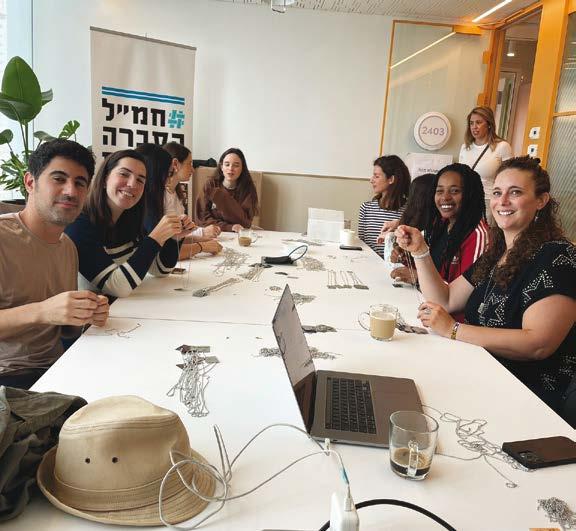
36 | Herzliyan 2024
A NEW ALUMNI APP - A SUPPORT INITIATIVE IN CHALLENGING TIMES
Sahar (not his real name), who’s currently serving in Gaza, has an anxious mother in Florida and he wants someone to call and help reassure her a bit; Dana (also a pseudonym), who runs a kindergarten that doesn’t have a shelter, is desperately looking for alternatives in the area; Dan, Omri and Yoav (fictitious names, as you might have guessed by now) are in the army, lacking equipment, and have been looking for someone who can get it to them; And then there is the alumnus who is seeking legal advice on setting up a safe room at home, and yet another is facing business losses, asking us to promote it among the alumni for increased support. And we can go on and on. With the launch of our new alumni app, the range of requests we have received is diverse and profound.
We proudly launched it in the third week of the war. This is typical of Reichman University, whose Alumni Association’s motto is that it is the alumni’s home for life. And yes, in life, there are wars, too, and even then, we are there for our alumni. That is what the app was designed for — so that our graduates can contact us about any matter they need assistance with, and especially during these difficult days, we stand by our alumni.
The Alumni Association team receives inquiries from the app, and answers each personally and immediately. “While we may not have been able to fulfill every request,” says Gili Dinstein, CEO of the Alumni Association, “We did manage the majority, and even just the fact that we were there, accessible and willing to help, made a significant impact. Our alumni were truly moved, and many of them sent us heartfelt messages on WhatsApp and email.”
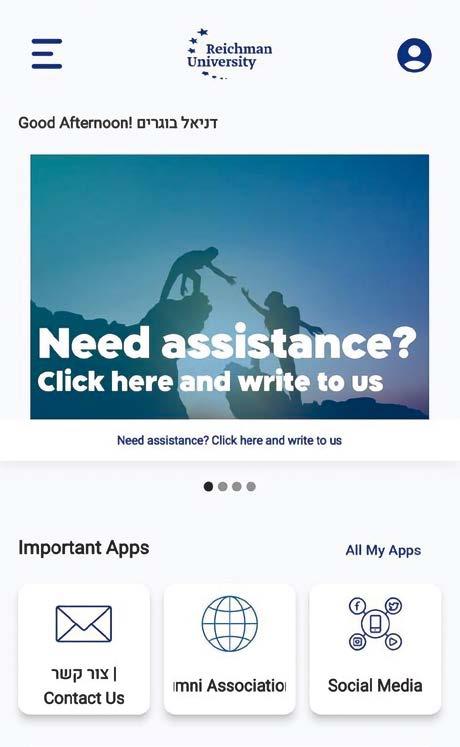

https://app.activetrail.com/S/zijizftwa3jd.htm
So how does it work? Simple: download the app via this link (works on iPhone and Android), choose the alumnus profile, verify your identity and that’s it. You’re in. If you had the app as a student, it’s even easier — just update to the latest version,and switch to an alumnus profile.
Gili adds, “Once the war ends, we’ll incorporate the entire alumni world into the app: networking opportunities, jobs, events, alumni conferences, benefits, and much more.”
37

ISRAEL FRIENDS: NAVIGATING ISRAEL’S CHALLENGES DURING THE WAR AND BEYOND
Israel Friends listening to Prof. Rafi Melnick, former RUNI President, now in charge of “making the case” for Israel at ACT.IL
38 | Herzliyan 2024
ISRAEL FRIENDS MEETING: “THE DAY AFTER”
At the end of January, as part of the meetings of the Israel Friends of RUNI, a panel discussion was held on the topic of “The Day After”: What needs to happen for residents of the south and north to be able to return home? This question was discussed by: Brig. Gen. (Ret) Miri Eisen, Executive Director of the Institute for Counter-Terrorism (ICT); Alon Davidi, Mayor of Sderot; Liora Ayalon, a veteran of Kibbutz Kfar Aza; and Adv. Ofir Yehezkeli, Deputy Mayor of Kiryat Shmona.
Mr. Davidi spoke about his biggest challenge - returning the city to a routine of life or emergency routine when the security reality is one of rockets. Adv. Yehezkeli agreed and said that one of the most difficult challenges is that as time passes, and the disconnect from one city grows, you put down roots in the place evacuated to, and that means people don’t return. Brig. Gen. (Ret) Eisen explained in her remarks that this is not a war against Hamas. Israel is already involved in a multi-front war, and therefore has long ceased to focus only on dismantling Hamas, as it needs to deal with Hezbollah and Iran.
Ms. Ayalon spoke about how the community is organizing to help itself, how it sees itself continuing in the future.
Residents of Kfar Aza currently residing in the Ronson Dormitory building were also invited to the meeting. At the end of the evening, they presented Prof. Uriel Reichman with an ancient pottery wheel found in the kibbutz as a token of appreciation for supporting residents.
An ancient pottery wheel found in the kibbutz presented to Prof. Uriel Reichman as a token of appreciation for supporting and hosting them on campus
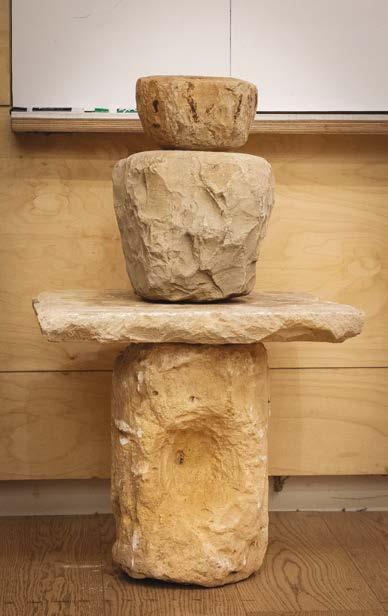
 From left: Gili Dinstein, CEO of Israel Friends and the Alumni Association, Brig. Gen. (Ret) Miri Eisen, Executive Director of the Institute for Counter-Terrorism (ICT); Adv. Ofir Yehezkeli, Deputy Mayor of Kiryat Shmona; Liora Ayalon, a veteran of Kibbutz Kfar Aza; and Alon Davidi, Mayor of Sderot
From left: Gili Dinstein, CEO of Israel Friends and the Alumni Association, Brig. Gen. (Ret) Miri Eisen, Executive Director of the Institute for Counter-Terrorism (ICT); Adv. Ofir Yehezkeli, Deputy Mayor of Kiryat Shmona; Liora Ayalon, a veteran of Kibbutz Kfar Aza; and Alon Davidi, Mayor of Sderot
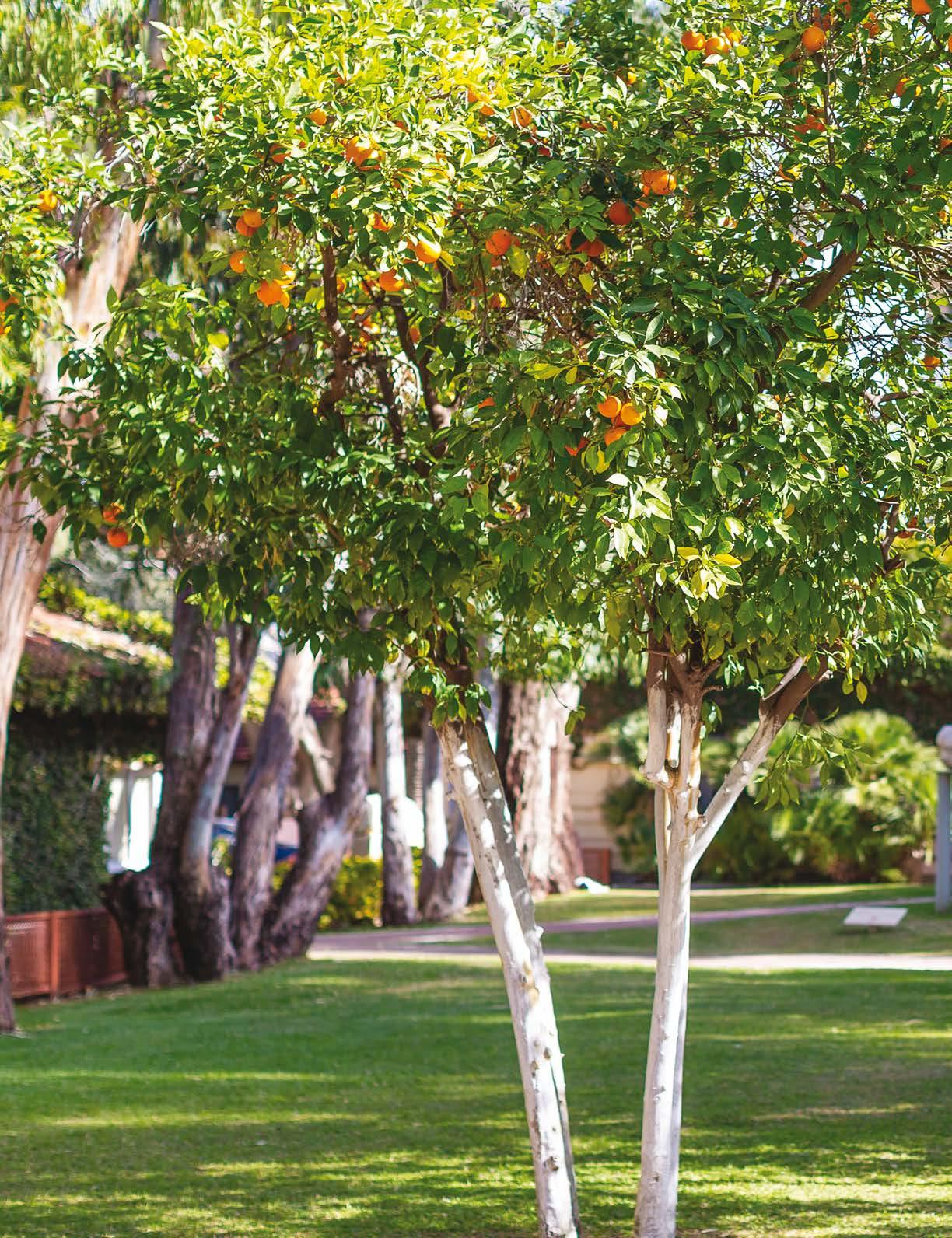
BARUCH IVCHER SCHOOL OF PSYCHOLOGY
Changing the world through science.
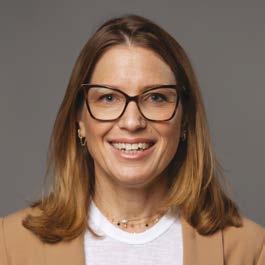
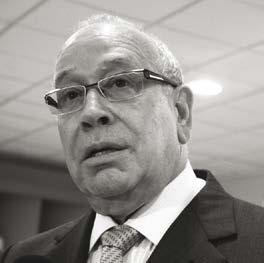 Prof. Anat Brunstein Klomek, Dean
Baruch Ivcher
Prof. Anat Brunstein Klomek, Dean
Baruch Ivcher
40 | Herzliyan 2024
1

GROWRESILIENCE© FOR PARENTS OF YOUNG CHILDREN
A BRIEF INTERVENTION CAN MAKE A DIFFERENCE
PROF. RUTH FELDMAN
October 7th has left us a nation in trauma. Over a thousand were murdered, tens of thousands wounded, and hundreds of thousands deployed and displaced from their homes. Such mass trauma affects us all, but its impact on infants and young children is pervasive and far-reaching. Parents must stand at the front and provide a secure base for their children to grow a functional brain, healthy mind, and sense of safety.
Parenting young children in times of war requires immense sensitivity and patience. Young children feel that something terrible has happened but cannot fully comprehend the situation, self-soothe, or imagine a better future. They are fearful, clingy, regressive, withdrawn, aggressive, and stubborn, and often present symptoms the parent cannot handle. The situation gets worse when Dad is deployed for weeks on end, Mom is worried and alone, and the child is deprived of routine, familiar settings, and contact with those who fill their social world.
Our experience with children growing up in Sderot and the Gaza Envelope spans two decades. By 2003, we began following a cohort of 250 infants and their mothers living in the area and observed them until they were 18. Assessments included repeated psychiatric diagnosis, social interactions, emotion regulation, oxytocin, immune biomarkers, brain imaging, stress response, and the microbiome. Our immense effort enabled us to pinpoint how chronic war impairs the child’s biology and disrupts the foundations of health, adaptation, and sociality.
Most importantly, we detailed the types of symptoms young children present after stretches of violence. Our study not only contributed to the diagnosis of “early childhood PTSD” but also allowed us to differentiate symptoms that are transient and subside when the violence quiets versus those that spell risk and need immediate attention.
We also observed the tremendous stress war places on the mother. We learned which maternal behaviors are beneficial to children during wartime and appreciated the immense price mothers pay in their mental health and physiological resources to keep their children safe.
As soon as the war broke out, we translated our 20-year research into a brief intervention for parents of young children (0-7 years). We based the intervention on our conceptual model of resilience, which contends that resilience develops in the context of bonding. The model proposes three tenets of resilience: plasticity, sociality, and meaning, and shows how the biological foundations of resilience develop within the parent-infant bond. In the first weeks after 7/10, we presented our findings to more than 300 professionals working with young children.
The GrowResilience© intervention includes six “gates” representing six topics we discuss with parents. Within each topic, we highlight how to enhance plasticity, strengthen social bonds, and create a sense of meaning. These are:
1. Mediating knowledge – How to mediate the situation for the child in age-appropriate ways, limit frightening input, and give words to fears. Parents learn to listen carefully to the child’s “story”, process it together, and share some –but not all – of their feelings with the child.
2. A secure base – Parents are the child’s secure base and we emphasize that they have whatever it takes to make their child feel safe. We discuss strategies to keep routines, spend time together, reduce their own anxiety, and create daily rituals. We normalize children’s regression and minor aggressions, highlight attachment issues, practice flexibility in accepting parenting failures, and contemplate how parenting grows a sense of meaning.
3. Finding a circle of support – To provide a secure base, parents must rely on others for emotional and practical support. Mothers learn to step out of “I can do it”, ask for help from anyone available, actively form a supportive circle, and accept their partner’s different ways of support and parenting. Parents learn to seek group activities, identify points of breakdown before they happen, and tolerate lower standards of household and childrearing investments.
///
41
4. Boosting oxytocin for a resilient brain – We describe the magical properties of oxytocin in enhancing plasticity, sociality, and meaning and how strengthening it boosts resilience. We teach three oxytocin-enhancing “tricks” to practice each day: a big hug of 30 seconds or more, a few minutes of face-to-face synchrony, and empathy to someone in distress. Children as young as two or three can learn to identify others’ distress and behave with empathy.
5. Creating a shared narrative – Children need a “story” that is jointly created with the parent and repeatedly told to make sense of trauma. Through a shared story, children identify with empowering actions, distinguish good from evil, and, importantly, chart a timeline toward a better future, all through a synchronized co-creation with the parent.
6. Growing meaning – We discuss the critical importance of meaning. Only through a strong sense of meaning can trauma lead to posttraumatic growth rather than post-traumatic pathology. Meaning allows us to connect the distant past with the projected future and transcend the here and now through shared values and beliefs. Meaning grows from orienting outside ourselves and we teach parents how to help children as young as two or three to consider others and grow meaning.
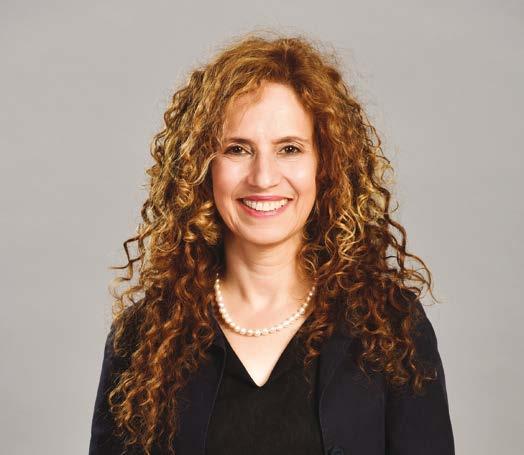 Prof. Ruth Feldman, the Simms-Mann Professor of Developmental Social Neuroscience at Reichman University
Prof. Ruth Feldman, the Simms-Mann Professor of Developmental Social Neuroscience at Reichman University
Since late November, after receiving a donation from the Simms/Mann Foundation, we began providing intervention to groups of 5-7 moms (and recently also dads). Groups are online and free of charge, and each group meets three times for 1.5-2 hours with a trained child psychologist. Before and after the intervention, parents complete questionnaires regarding their trauma exposure, current condition, and their own and child’s symptoms. At the end, they tell us what they found most helpful.
We currently have five trained psychologists, each giving 2-3 sessions per week to approximately 150 parents per month (with 75 parents on the waiting list). We treat parents from Sderot and surrounding kibbutzes who experienced the atrocities, those displaced from their homes, mothers whose husbands are deployed, and, in fact, any parent can join the groups. We recently opened a fathers’ group to deployed men and Kibbutz members who wished to be together, and new requests arrive daily.
Parents report that the groups are extremely helpful. They draw strength from sharing, normalize their child’s symptoms, relax their own self-criticism, and report that the actual strategies are hugely helpful in creating security, cementing the bond, and allowing moments of closeness and that they’re fun despite the circumstances. They love the “oxytocin” tricks, find the “time-arrow” extremely useful, and report that the shared narrative induces times of togetherness and calm. They learn to ask for help even from those they previously wouldn’t have, allow their spouse to do things in their own way, and grow a sense of meaning that gives them resilience and inner strength. Alongside this, their children’s symptoms decrease, their own anxiety subsides, and their ability to share moments of joy and safety with their children allows them to breathe fresh air.
The trauma faced by our society is severe and parents will need our help for months to come. But the sense of unity, sacrifice, and sharing what we have witnessed since the attack, and the tremendous relief parents report even after our brief intervention, gives us hope that our spirit is strong, our values intact, and our parents are determined to invest all efforts to create a safe future for their children.
42 | Herzliyan 2024
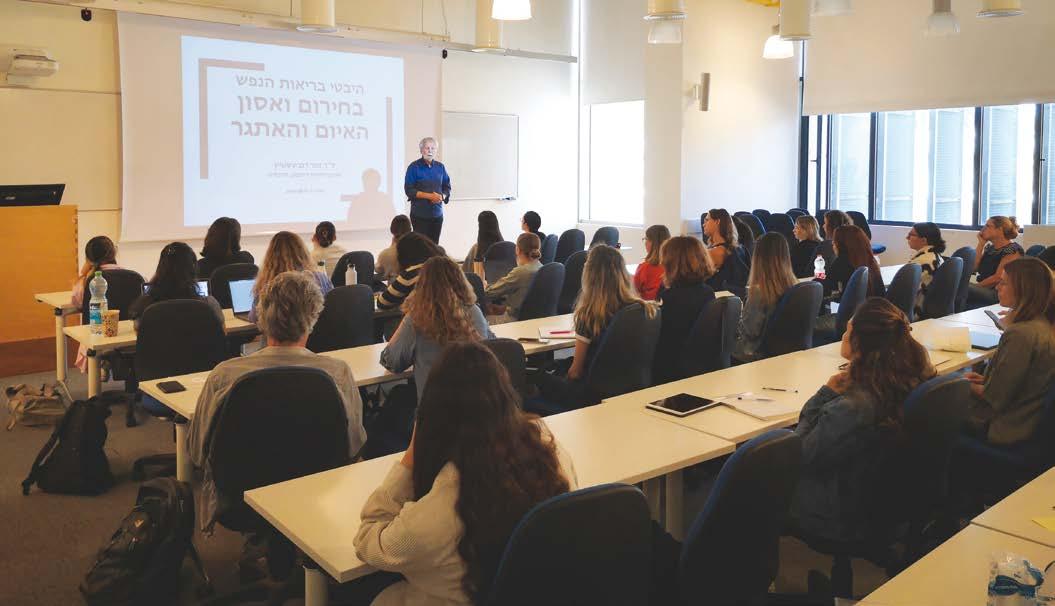
INITIAL EMOTIONAL SUPPORT AT THE RESILIENCE SITUATION ROOM (“HAMAL HOSEN”)
The current war has resulted in a situation of national trauma. This situation has led to the immense need for immediate psychological support and having initial emotional support accessible to individuals and groups.
In light of the fact that therapeutic professionals in Israel are treating many complex cases, and that public and state systems are unable to cope with the load, the Dean of Students, led by Dr. Adi Koll, and the Baruch Ivcher School of Psychology, led by Dean Prof. Anat Brunstein Klomek, have established the “Resilience Situation Room” (“Hamal Hosen”). This is designated to provide a solution for the university student population as well as the general public. The entire management of the School of Psychology has led shifts in the situation room, including Prof. Gilad Hirschberger, Prof. Boaz Ben David, Prof. Ety Berant, Prof. Shahar Ayal and Dr. Zohar Rubinstein.
Throughout the project, Dr. Zohar Rubinstein, Prof. Danny Hamiel, and Ms. Orit Meranda have trained about 200 members of the Reichman University community, alumni and students, to provide emotional support as part of their training to serve as resilience trustees.
All of the resilience trustees, undergraduates, and graduate students, as well as alumni, were accompanied by Baruch Ivcher School of Psychology faculty members. Furthermore, lecturers underwent a program to conduct resilience training. Those who contacted the Resilience Situation Room underwent preliminary screening and then received a response that included initial emotional support from the students or interns in the school clinic for those coping with increased hardships. Some of those seeking help, who were in great distress, were referred for professional treatment by expert psychologists in the therapeutic clinic of the School of Psychology. This is provided free of charge while protecting the privacy and confidentiality of the individual.
In total, the Resilience Situation Room responded to more than 2,000 requests. Beyond the immense significance that the conversations bestowed the resilience trustees, we know that even one conversation can often be a significant source of support, can make the person feel that they are not alone, and can give them the strength to continue. Today, the Resilience Situation Room has become a resilience unit within the school clinic, led by Dr. Yael Apter Levy, Prof. Shahar Ayal, and others.
///
43
Resilience supporters being trained by Dr. Zohar Rubinstein
THE REICHMANSHEBA PROGRAM FOR RESILIENCE IN NATIONAL TRAUMA
Studies show that response to trauma is more difficult when it is the result of unexpected and long-lasting events caused by an individual with malicious intent (rather than damage from natural events or negligence). Events considered the most traumatic are wartime situations and acts of rape. Unfortunately, both were a significant aspect of the October 7th terrorist attack on Israel. Therefore, we are facing a significant risk of a post-traumatic epidemic. Concern for public safety is particularly exacerbated as the Israeli mental health system has been neglected for many years and increasingly suffers from a severe lack of resources, even before the war.
At the beginning of 2024, reports indicated that 1,600 soldiers were suffering from symptoms of post-traumatic stress disorder. These soldiers, together with the many evacuees from the Gaza Envelope, and Nova Festival survivors, had their lives come to a complete standstill following October 7th and are still struggling to recover.
The Baruch Ivcher School of Psychology and the Sheba Hospital Mental Health Division organized a unique training program that involved the participation of social, clinical, and organizational behavior and development Master’s students. This program included student training, which established the knowledge and skills to help strive towards breaking the cycle of trauma following October 7th. This important program was possible thanks to a generous donation from the Ivcher family, who have continuously supported the psychology school since its inception.
“Resilience is not an innate virtue; rather, resilience is an acquired ability that can be built and perfected throughout life,” says Dr. Arielle Lehmann, a social psychologist, lecturer at Reichman University, and one of the chairs of the Reichman-Sheba program.
“People sometimes think that resilience is a type of immunity, as if it is a muscle that we can utilize when faced with difficult events, to feel them less. The truth is that compassion and attention are also part of resilience. Resilience is not the ability to suppress emotions or avoid them, but rather the ability to experience a full range of emotions while finding the strength to move forward. Resilient people can still be hurt and may even break down, however, they find the strength to rise up again.”
Dr. Lehmann explains that the consideration of time is of great importance for resilience, “An essential part of creating resilience is the understanding that there is constant change. A person who experiences great loss may struggle to find joy in life, but if they are in the same mental place two years after the event as they were a month following the event, then this is a different story. The more resilience present, the more space there is for change and development. Over time, processes of post-traumatic growth may even appear; one may discover in themselves various abilities and strengths that they did not know existed prior to the trauma.”
The realization that Israel needs resilience experts now more than ever is what inspired the collaboration between the School of Psychology and Sheba Medical Center. The joint training program includes three components: theoretical knowledge, practical simulations, and resilience fieldwork. Program participants come to training and simulation days at the Messer simulation center in Tel Hashomer, and participate in simulated scenarios with professional actors. Prof. Amitai Ziv, director of the rehabilitation center at Sheba, is a former fighter pilot. Prof. Ziv founded Messer out of a deep familiarity with simulations. “As a pilot, I learned firsthand that a simulator is the best way to learn.
///
44 | Herzliyan 2024

In a simulator, you can allow yourself to experiment and make mistakes knowing that your mistakes have no real consequences in the world. This knowledge is liberating and enabling – the people who train at Messer are free to try different approaches and make mistakes while our professional team helps them learn and improve.”
Prof. Ziv emphasizes that the learning environment at Messer is a safe environment that is wellsupervised by professionals. “The simulations are video recorded, and these videos help us analyze the scenario in detail. For example, in a simulated scenario consisting of a father who rescued his son from the Nova Festival, the topic of ‘survivors’ guilt’ came up, an important concept in the world of trauma treatment. Although the father succeeded in saving his son, he was not able to save others who needed rescue from hell and therefore he was left guilt-ridden. In this simulation, the professional spoke with the father (played by an actor) about the resourcefulness and ability he demonstrated in such terrible circumstances. Establishing a narrative of the event allows the father greater processing and understanding of how he did everything possible in this situation. This understanding diminishes the feeling of guilt and helps initiate healing.”
The first cohort of the resilience program began in November with 60 psychology students. Graduates of the program shared that it provided them with great knowledge and strengthened their professional confidence in crises. The second cohort of the program opened in January 2024 and is intended for graduates of Master’s degree programs in social psychology, clinical psychology, organizational behavior and development. The program is also open to individuals with prior resilience work from various disciplines and who aspire to specialize in the field of resilience and post-trauma. The graduates of the second cohort will be accepted to an internship at Sheba Hospital, as part of the valuable cooperation between the university and the hospital.
45
Dafna Ivcher, daughter of Baruch Ivcher, Prof. Amitai Ziv and Dr. Arielle Lehmann
EMOTIONAL SUPPORTWE ARE HERE FOR YOU!
A NEW INITIATIVE HEADED BY THE BARUCH IVCHER SCHOOL OF PSYCHOLOGY FACULTY AND STUDENTS
Every person needs emotional support, everybody deserves care. This has always been true, and even more so during these days when pain, grief, anxiety, and distress resonate in all of us. Whereas the survivors and evacuated civilians are offered emotional support from social workers, psychologists, and psychiatrists, the remaining civilians are forced to search for emotional aid in other places. Some begin or resume treatment; others receive support through telephone assistance. But many struggle to bridge the gaps before support: acknowledge the need, overcome the negative stereotype, locate and reach a therapist, bear the financial cost, etc. A new initiative by Reichman University faculty and students presents a fresh and innovative alternative: providing emotional support in the public sphere. This is what 100 volunteer professional caregivers deliver within the “Primary Emotional Support“ initiative. They sit in public spaces and offer 20-minute sessions –“First Aid” support.
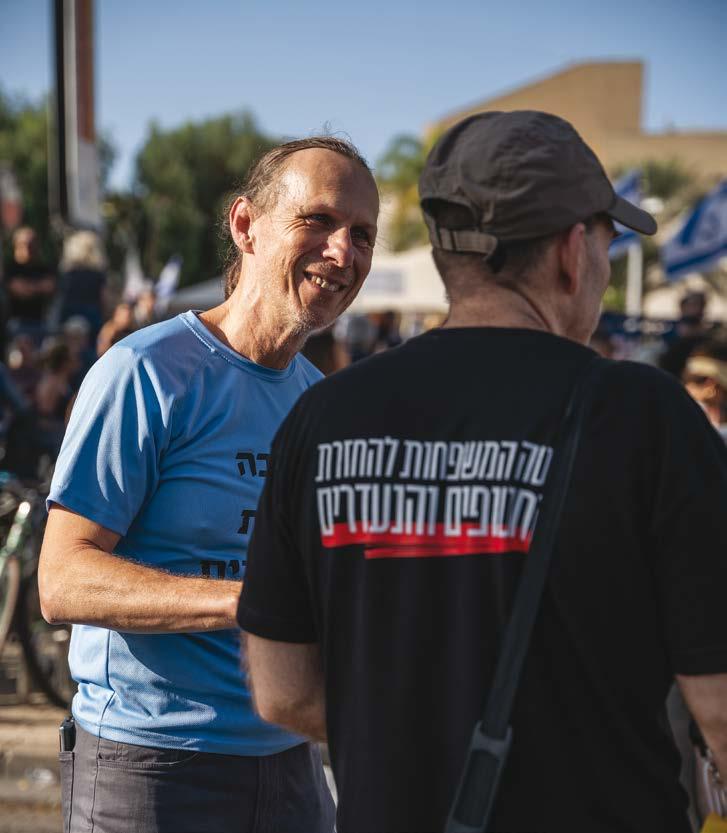
They wear distinctive shirts, sit under protruding signs, and make themselves visible to as many people as possible, encouraging them to approach. Clinicians are accompanied by Baruch Ivcher School of Psychology students. Not only do they organize and ensure smooth operation, but they also approach people and invite them to sit with us. Their secret sauce? Simply striking up a conversation and saying, “Hi, my name is so and so, I am a volunteer at Primary Emotional Support; how are you doing in these troubling days?”
The initiative was founded and is led by Dr. Ortal Shimon Raz, a clinical psychologist and Prof. Boaz Ben David, a cognitive psychologist, both faculty at Baruch Ivcher School of Psychology, Reichman University, as well as Ms. Tchelet Bressler, a student at the school in the Honors Excellence program. All volunteers are professionals in the field who receive ongoing assistance in holding short sessions and in coping with current issues that come up.
Professor Ben David explains, “In every new place, we are told, ‘Over there, in the corner, there is a secret room in which you can sit’. We answer, ‘No, we are here in the middle, at the front, with a big sign Primary Emotional Support.’ The basic approach amongst people is ‘let’s hide it’, and we will not hide it. It is not shameful. All of us are coping now and the ability to place the emotional support outside, in the middle of the street, to be seen, is our strength. The emphasis is on being present. I like to compare it to the ambulance model: If there is a big event, there will be an ambulance on the premises, and it won’t be hidden because how will you know it’s there? Just knowing that the ambulance is there is already reassuring. That is what we do as well.”
/// PRIMARY
46 | Herzliyan 2024
Prof. Boaz Ben-David talking to one of the care recipients at the Hostages Square
The primary place in which the volunteers operate daily is Tel Aviv Museum’s main square, currently named the “Hostages’ Square”. There, the families of the abducted Israelis protest, and people come to support them and their call, “Bring them home!”. Adjacent to the sessions, an “expression wall” allows people to write or draw their emotions. There is a music therapist who, through music, both lifts people and raises tears. There is also a “worry dolls corner” which offers art therapy. But the talks are the primary activity.
Ben David says, “Care recipients come from all corners. Parents of soldiers serving in Gaza who share their worries. Soldiers, officers, and other security officials are anxious, distraught, and need to talk. One of them approached me and said, ‘Thank you for giving me the strength to go back there’. Many are concerned with the question: what is legitimate to do other than grieve? One student said: ‘Is it okay to ask her to marry me when so many friends are still fighting?’ I asked him to consider that we fight for his right to start a new family here in Israel. Another person said she has avoided music altogether since October 7th. I suggested listening at home, with headphones, but not to give up on this part of her life. And often, we are asked about the amount of news one should consume. We suggest to consider moderating the amount.”
For more details on the project, please visit us at https://www.tmichanafshit.com/en
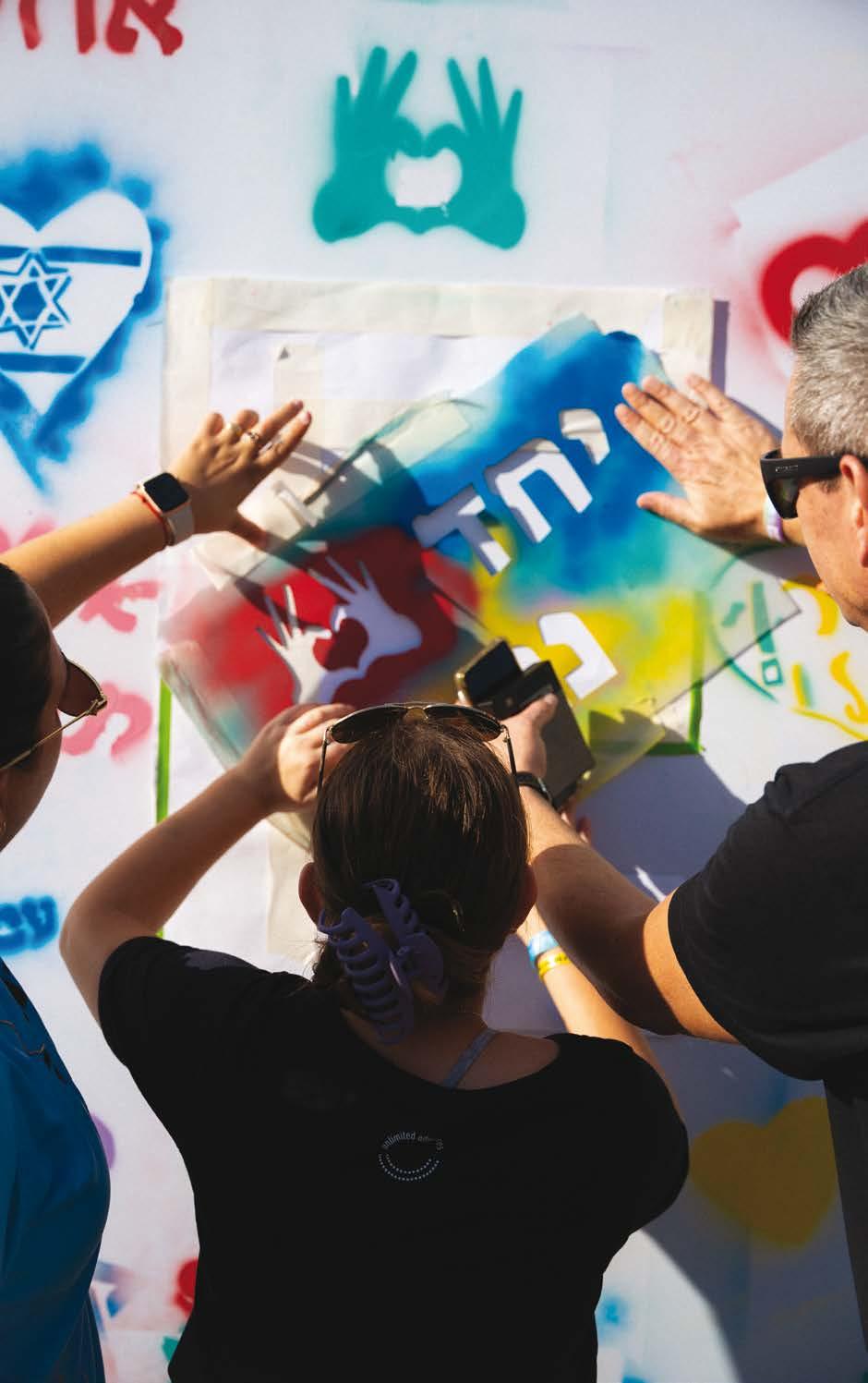
47
The “expression graffiti wall” at the Hostages Square erected by the “Primary Emotional Support” team
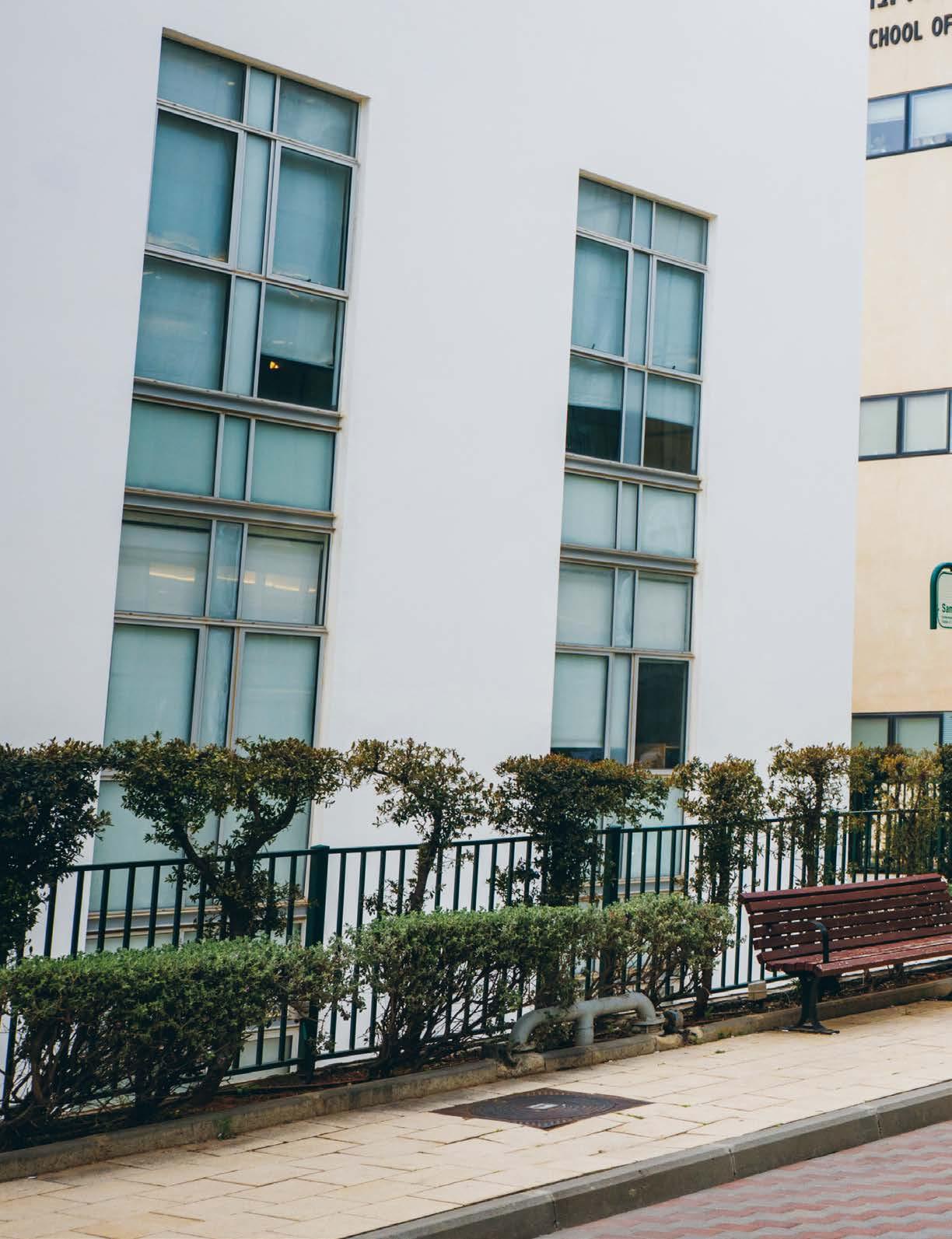
HARRY RADZYNER LAW SCHOOL 2
At the forefront of legal education, academic research and service to society.
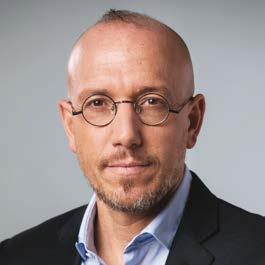
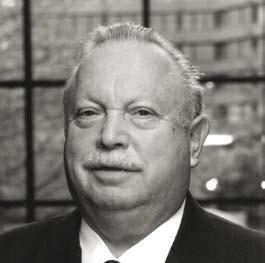 Prof. Lior Zemer, Dean
Dr. Harry L. Radzyner z”l
Prof. Lior Zemer, Dean
Dr. Harry L. Radzyner z”l
48 | Herzliyan 2024
/// HARRY RADZYNER LAW SCHOOL DEDICATES INTENSIVE SEMESTER TO ITS SWORDS OF IRON RESERVISTS
As the academic year progressed, the University realized that a significant number of students had missed the first semester entirely due to their reserve duty in the Swords of Iron War. Recognizing their sacrifice, Prof. Lior Zemer, Dean of the Harry Radzyner Law School, with the immediate and massive support of Prof. Uriel Reichman, Founding President and Chairperson of Board and Prof. Boaz Ganor, President, took action in the spirit of the university’s values and initiated a special semester tailored especially to these students, ensuring they wouldn’t fall behind.
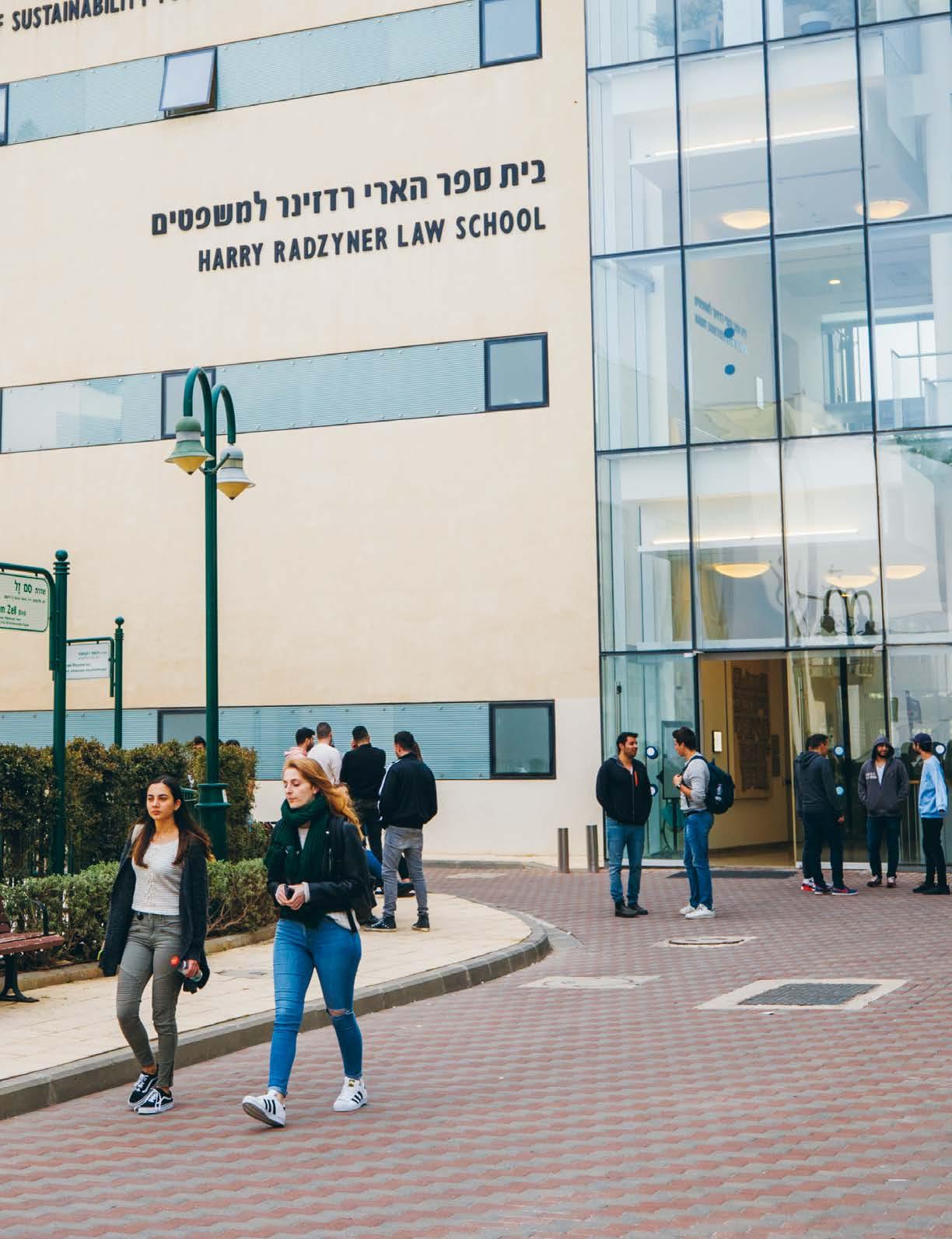
With 14 courses offered during the break, students had the opportunity to catch up and integrate more easily into the second semester. The faculty’s effort to accommodate these students, who served on various fronts, was deeply moving, showcasing their appreciation and support for these remarkable individuals.
This project was made possible thanks to many people starting with Dr. Ayelet Ben-Ezer, Vice President and CEO, Dr. Adi Koll, Dean of Students and Graduates, and followed by: Dr. Hillel Sommer, Associate Provost, Iris Deshe, Head of Student Administration for Law Studies, all the Student Administration staff, Zohar Avraham, Head of the Dean’s Office, and Corrine Levi, Dean’s Office.
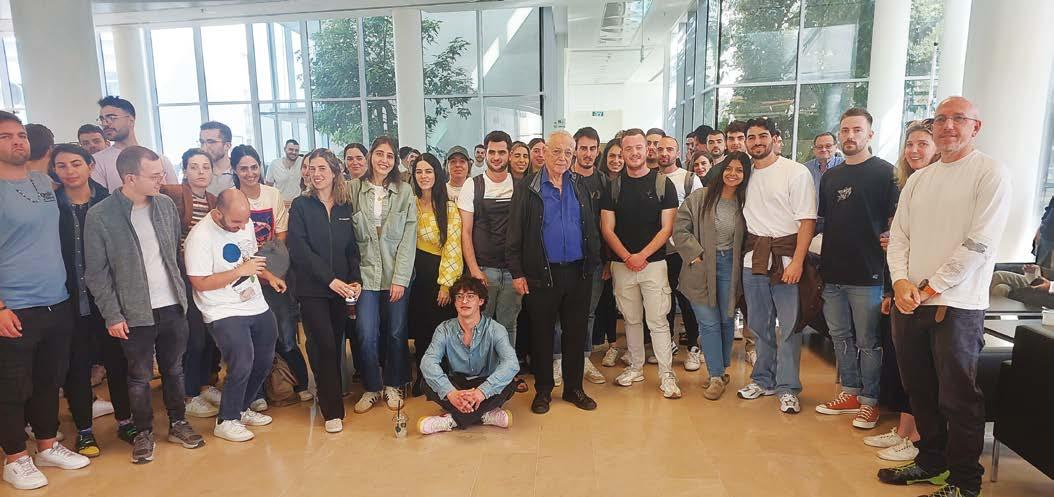
Prof. Uriel Reichman, Founding President and Chairperson of the Board, Prof. Lior Zemer, Dean of the Harry Radzyner Law School and Dr. Adi Koll, Dean of students, with law students who returned from serving a long and intense reserve duty in the Swords of Iron War
49
/// BRING THEM HOME: STORIES OF THE HOSTAGES
The radio program “Bring Them Home” is a collaborative effort between the Harry Radzyner Law School and the Hostages Families Forum. Initiated by Prof. Lior Zemer, Dean of the Harry Radzyner Law School, this unique program aims to create a platform for families to share their complete narratives. Hosted by the Dean and a dedicated student team, including Romy Kaplan, Dana Dohan, Hadar Sutker, and Or Moshe, the program conducts interviews in both English and Hebrew, providing an intimate exploration of personal stories.
Recorded directly from the Forum, the program’s primary goal is to resonate the voices of the families. By doing so, “Bring Them Home” ensures their stories remain at the forefront of public awareness, shedding light on the discourse surrounding bringing the hostages home. The depth and intimacy of the interviews, conducted at eye level, offer a unique perspective, delving into the personal narratives of the hostages and going beyond our understanding. We invite you to listen to the program on Radio 106.2 FM, on the radio website, Spotify, or Apple Music.
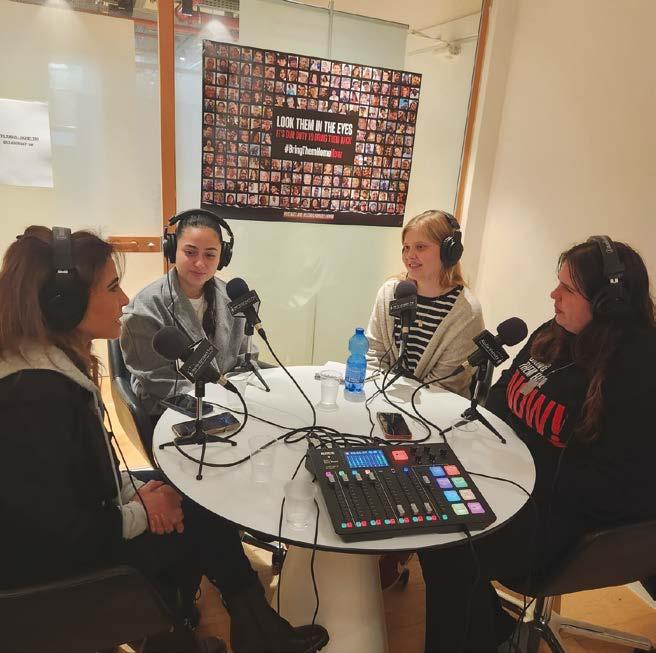
From left: Shira Albag, mother of Liri Albag, who was taken captive by Hamas on October 7th, Shay Albag, Liri’s sister, Hadar Sutker, Law and Psychology student, and Or Moshe, Government student at the Lauder School of Government, Diplomacy and Strategy
/// LEGAL AID IN ACTION
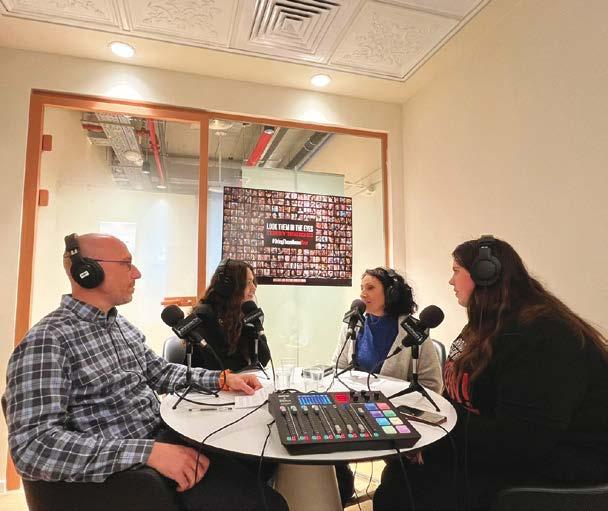
REICHMAN UNIVERSITY ’S RESPONSE CENTER FOR DISPLACED FAMILIES
In the face of the October 7th terror attack by Hamas, Reichman University swiftly embraced its commitment to freedom and social responsibility. Recognizing the urgent need for support, the Legal Aid Clinics on campus emerged as crucial first responders. From drafting informative memos on the rights of those impacted by the war to establishing a dedicated legal aid response center, the university demonstrated its unwavering dedication to assisting displaced families.
Led by the Dean and staff of the Harry Radzyner Law School, Prof. Lior Zemer (Dean), Dr. Neta Nadiv (Head of the Experiential Program), and Adv. Sharon Sionov (Head of Clinical Legal Education), the Response Center was formed to provide free legal assistance, particularly to individuals evacuated from their homes in the south and north.
50 | Herzliyan 2024
From left: Prof. Lior Zemer, Dean of the Harry Radzyner Law School, Romy Kaplan, Law and Government student, Meirav Leshem Gonen, mother of Romi Gonen who was taken captive by Hamas from the Re’im music festival on October 7th, and Or Moshe, Government student
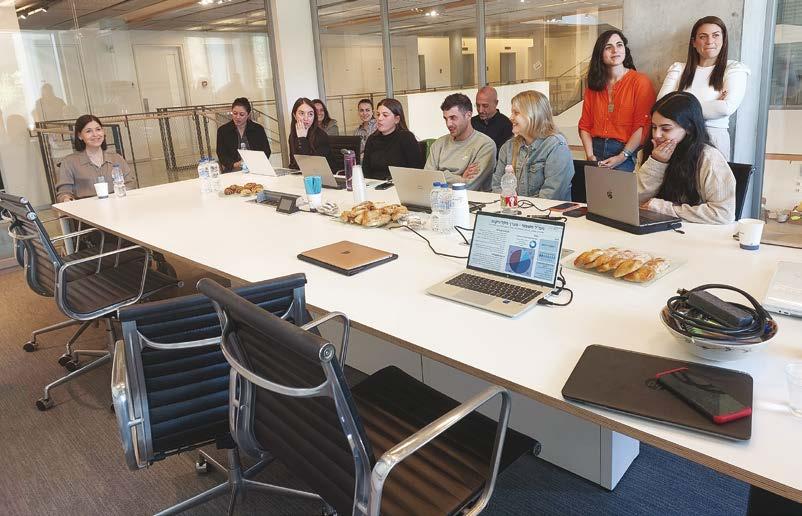
Volunteers of the Response Center went beyond mere communication via calls and emails, actively participating in face-to-face meetings at various locations where evacuees sought refuge. One such impactful meeting involved a law student assisting a single mother of seven who had fled her home. Discovering the mother’s eligibility for a retroactive aid grant, the volunteer provided invaluable support in navigating the application process, potentially changing the trajectory of the mother’s financial situation.
During its operation, the Response Center received visits from notable figures, including the German Ambassador to Israel, H.E. Stefan Seibert. Expressing solidarity and acknowledging the resilience of the Israeli people, Amb. Seibert commended the civil society actions, particularly praising the efforts of the Response Center.
Member of the Knesset Ms. Karine Elharrar visited the Response Center to gain insights into legislative actions that could aid those affected by the war. Volunteers shared complex issues and difficulties faced during their efforts, fostering a collaborative dialogue between lawmakers and grassroots initiatives.
Omri Kaplansky, a second-year Law and Government student volunteering at the Response Center, shared her perspective: “Since the beginning of the war, I have been volunteering at the Response Center. We help citizens with issuing inheritance orders, submitting insurance claims, helping evacuees with rental agreements, and much more. As part of the Response Center, I assisted a widow whose husband fought in one of the combat units and was killed on October 7th. She sought information and assistance in various matters such as insurance, mortgages, inheritance orders, and even in recognizing her status as the widow of an IDF soldier. Of course, we helped as much as possible.”
Her testimony underscores the diverse range of issues tackled by the legal clinics.
The Response Center is still active and until today have handled over 600 inquiries spanning a broad spectrum of subjects, including labor rights, youth, housing, mental health, social insurance, welfare, grants, and inheritance arrangements. The multifaceted approach of the Response Center reflects its commitment to addressing the numerous challenges faced by those affected by the conflict.
In times of crisis, Reichman University’s legal aid initiative stands as an inspiration of support, showcasing the power of community-driven action in alleviating the legal burdens borne by displaced families.
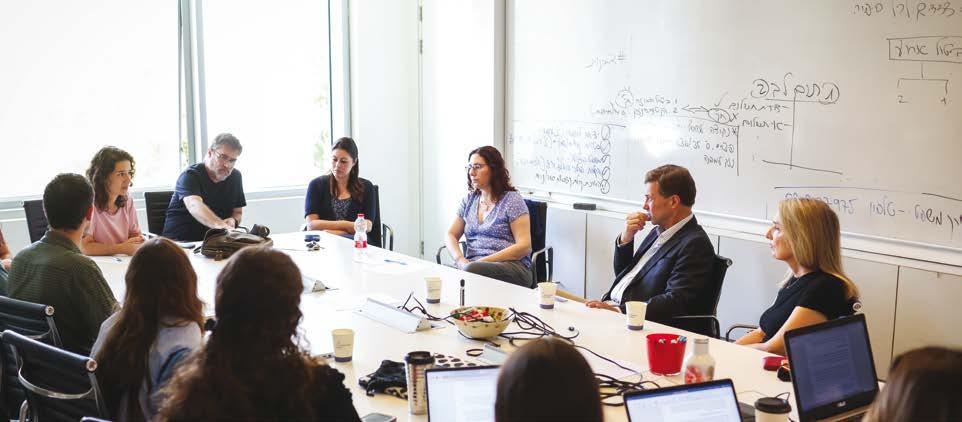 From left: Adv. Yael Vias Gvirsman (with pink shirt), Adv. Ilan Yonash, Head of the Shira Banki Anti Hate Clinic, Dr. Neta Nadiv, Head of the Experiential Program, Adv. Sharon Sionov, Head of Legal Clinics, the German Ambassador to Israel, H.E Stefan Seibert and his wife Mrs. Sophia Gundelach
From left, first row: MK Karine Elharrar, Yarden Levy - student, Omri Kaplinsky - student, Jonathan Cohen - student, Hadar Sutker - student and Aya Kador - student From left, second row: Dr. Neta Nadiv, Head of the Experiential Program, Tal Horev - student, MK Karine Elharrar’s Parliamentary Assistant, Prof. Lior Zemer, Adv. Geller Efrat and Adv. Einat Katz
From left: Adv. Yael Vias Gvirsman (with pink shirt), Adv. Ilan Yonash, Head of the Shira Banki Anti Hate Clinic, Dr. Neta Nadiv, Head of the Experiential Program, Adv. Sharon Sionov, Head of Legal Clinics, the German Ambassador to Israel, H.E Stefan Seibert and his wife Mrs. Sophia Gundelach
From left, first row: MK Karine Elharrar, Yarden Levy - student, Omri Kaplinsky - student, Jonathan Cohen - student, Hadar Sutker - student and Aya Kador - student From left, second row: Dr. Neta Nadiv, Head of the Experiential Program, Tal Horev - student, MK Karine Elharrar’s Parliamentary Assistant, Prof. Lior Zemer, Adv. Geller Efrat and Adv. Einat Katz
51
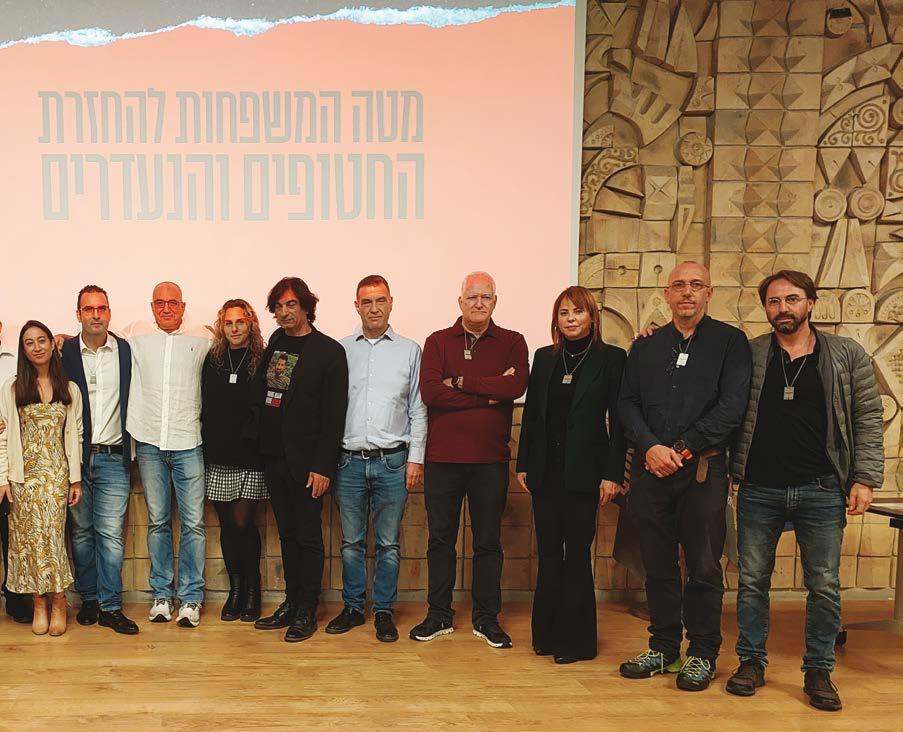
From left: Dr. Sheli Aviv Yeni, Mr. Yossi Moati, CEO of the Forum
Adv. David Zalmanovich, Founder of the Forum, Ms. Liat Bel Sommer, Mr. Eli Shtivi, Prof. Ariel Bendor from Bar Ilan University, Prof. Boaz Ganor, President of Reichman University, Dr. Ayelet Ben Ezer, CEO and Vice President, Prof. Lior Zemer, Dean of the Harry Radzyner Law School, and Prof. Oren Zuckerman, Head of HCI MA program, Director of milab at Reichman University
/// A MEANINGFUL VISIT
THE HARRY RADZYNER LAW SCHOOL’S ENGAGEMENT WITH THE HOSTAGES AND MISSING PERSONS FAMILIES FORUM
In a heartfelt effort to contribute to the cause of bringing home the abducted and missing hostages, the Harry Radzyner Law School recently organized an emotional visit to the headquarters of the forum for families acting for the return of the hostages. The purpose was not just to understand the challenges faced by the forum but also to explore how the University and individuals could actively participate in this crucial fight. Reichman University’s Prof. Boaz Ganor, President, and Dr. Ayelet Ben-Ezer, CEO & Vice President, participated in this emotional visit.
Setting the tone, Prof. Lior Zemer, Dean of the Harry Radzyner Law School, who organized this visit with the help of Adi Tal, a Law student on the direct track to MA Law, Technology & Business Innovation and Or Moshe, a first year Government student both volunteering at the forum from their first day of operation, emphasized the national ethos of a desire for life and the urgency of redeeming captives. He asserted, “There is no other way but to act and to bring home the captives alive.” This sentiment underscores the collective responsibility of ensuring the safe return of those held against their will.
During the visit, the attendees were moved by the stories of five families coping with the heartwrenching reality of their loved ones being kidnapped. Eli Shtivi, father of Idan Shtivi, a Sustainability and Government student at the University, abducted to Gaza on October 7th, shared his anguish.
“Imagine that your child does not answer your telephone and is in hell. I hear Idan at night saying to me, ‘Father, help me.’ Everything I do is not enough because Idan is not here.”
The narratives of other families – Shely Shem Tov, mother of Omer Shem-Tov and Haim Or, brother of Avinatan Or, both abducted from the party in Reim, Gil Dikman, cousin of Carmel Gat, abducted from her parents’ home in Be’eri, and Nawaf Alziadna, father of Yosef Alziadna – further illuminated the human toll of these abductions.
The visit also provided an opportunity to engage with the dedicated leaders operating the headquarters of the forum. Mr. Yossi Moati, the CFO of the forum; Ms. Liat Bel Sommer, Head of the Department of International Communications; Dr. Shelli Aviv Yeini, Head of the Legal Department dealing with international law; former MK Emily Moati, Director of Diplomacy; Prof. Hagi Levin, Head of the Medical Department; and Ms. Orna Dotan, Director of the Resilience Unit, shared insights into the multifaceted efforts undertaken by the forum.
The visit to the families’ headquarters was an emotional journey into the lives of those affected by the torment of abductions. As the Harry Radzyner Law School extends its hand in solidarity, it emphasizes the importance of collective action to bring solace to the affected families and to actively contribute to the ongoing fight for the safe return of the abducted hostages. This meeting, showing empathy to the families, served as a testament to the commitment of individuals and academic institutions in striving for a world where no family should endure the pain of separation.
52 | Herzliyan 2024
CULTIVATING HOPE
REICHMAN UNIVERSITY STUDENTS REVITALIZE ISRAELI AGRICULTURE AFTER TRAGEDY
In the aftermath of the October 7th terrorist attack, a silent crisis unfolded in the heart of Israeli agriculture. With farmworkers diverted to military service or compelled to leave the country, the fields faced neglect and needed urgent attention. Faced with this challenge, Reichman University students emerged as a ray of hope through their voluntary efforts in harvesting, planting, and milking – a testament to the resilience and community spirit that defines the institution.
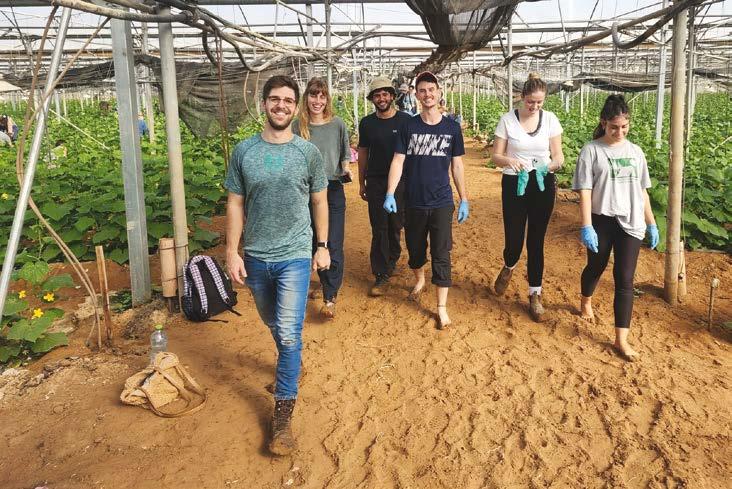
Prof. Lior Zemer, Dean of the Harry Radzyner Law School at Reichman University, recognized the horrible situation and took swift action together with students Zachary Khann, Ido Halfon and Lior Ben Avi. They connected students with farmers in need, and catalyzed a movement that has seen hundreds of students from across campus volunteering their time and energy to support moshavim and kibbutzim in the Sharon and Central regions of Israel. Prof. Zemer reflects, “We are proud of our students who meet every morning at the fields’ gates coming to help the farms in whatever they need. The feelings of giving and satisfaction fill us all.”
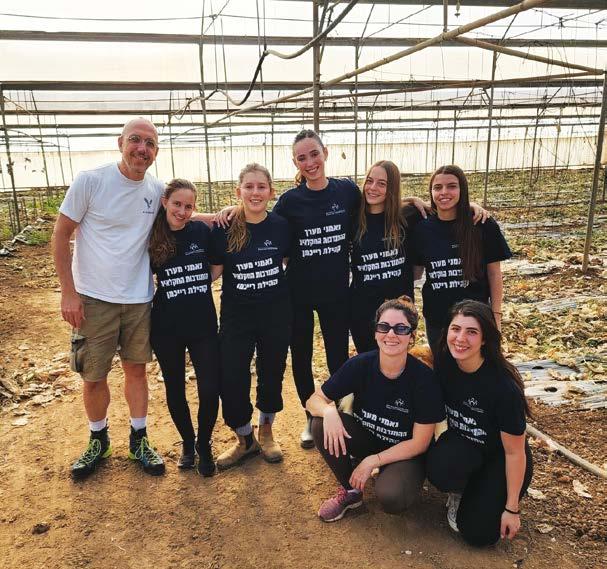
This initiative is more than a response to a crisis; it’s a cohesive, enjoyable, and profoundly satisfying activity. The students involved are not just aware of the essentiality and importance of their work; they find joy in the contribution they make to the lives of farmers. It’s a symbiotic relationship where the students learn valuable skills, gain a deeper understanding of the agricultural landscape, and, above all, experience the profound joy that comes from making a positive impact.
Mor Matzliach, a third-year Law and MA Government student, shares her experience: “The university announced the need for volunteers in agricultural farms, and I immediately seized the opportunity with my friends, Shir and Neta. Arriving at Moshav Gan Yoshiya in Emek Hefer at seven o’clock in the morning, we entered the cucumber greenhouses, assisting the farm workers with whatever was needed. I recommend anyone who can and is looking for a place to volunteer to join us!”
In the fields, these students are not just planting seeds but sowing hope and resilience. Their dedication to rebuilding the agricultural landscape after the tragedy is a shining example of how, in the face of adversity, communities can come together to cultivate a brighter future. As they continue giving back to the land, these students embody the spirit of unity and determination that defines Reichman University.
///
Prof. Lior Zemer, Dean of the Harry Radzyner Law School with student volunteers
53
Student voulunteers
///
SUCCESSFUL COMPLETION OF EMERGENCY FIRST AID COURSE AT REICHMAN UNIVERSITY
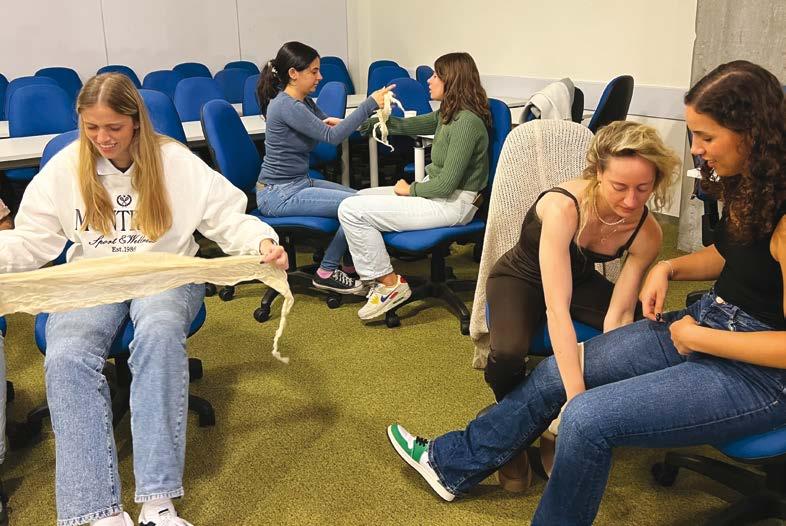
An Emergency First Aid course, facilitated by Magen David Adom Israel (MDA), took place at Reichman University, training participants to provide realtime assistance during emergencies. Organized by Prof. Lior Zemer, Dean and Head of the MA in Law, Technology and Business Innovation Program, the course covered a spectrum of emergency scenarios, including CPR, bleeding control, and choking management, all complemented by practical exercises.
Students and faculty members from various disciplines at Reichman University, mainly those involved in the different volunteering options offered around the campus, actively engaged in the course.
The course, structured to address the immediate needs of individuals in distress, was a comprehensive exploration of life-saving techniques. Participants delved into practical simulations, ensuring a handson understanding of the procedures taught.
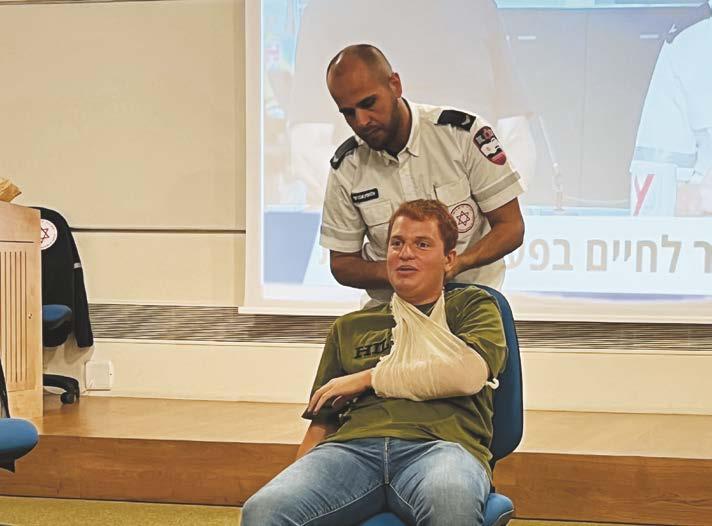
Congratulations to the new course graduates, who now are first responders, ready to make a positive impact in times of need. The university extends its gratitude to Magen David Adom Israel for their commitment to providing this invaluable training, which emphasized the importance of readiness and quick response in ensuring the safety and well-being of the community.
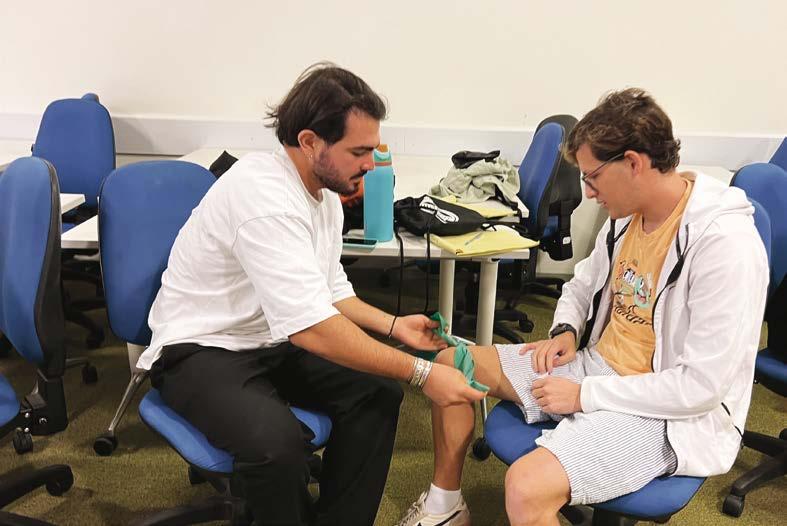
54 | Herzliyan 2024
/// CHALLA BASTA
LAW STUDENT’S CULINARY ACTION IN TIMES OF WAR
In the halls of Reichman University, Raz Ben Haim is not just a second-year Law & MBA student; he’s a dynamic force engaged in the PropTech Program Club, exploring the realms of real estate, technology, innovation, and entrepreneurship. Beyond academics, Raz manages his own catering business, adding yet another layer to his multifaceted life.
However, when the October 7th tragedy echoed across the nation, Raz found himself on a different frontline. Drafted into the Air Force, his true contribution to the war effort emerged overnight – a volunteer-run operation dedicated to providing nourishing meals to soldiers on the battlefield.

The spark for this initiative ignited with a call from a friend serving in the “Duvdevan” combat unit. Isolated for a few days, the friend expressed a longing for Raz’s catering specialty – challah with schnitzel. Inspired by this simple yet powerful connection, Raz initiated a culinary mission to bring a taste of home to those on the frontlines.
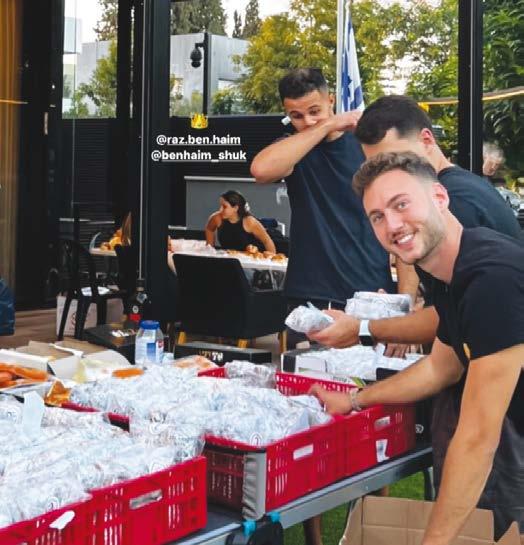
Describing the genesis of the operation, Raz shares, “We started cooking and sending meals to the soldiers at the front. I oversaw most of the operation: distributing roles to volunteers, raising funds, determining meal destinations, and ordering goods and equipment.” The impact was immediate, with 1,300 meals shipped in the first week alone.
Since then, the operation, which has been named “Challa Basta”, has grown exponentially, delivering over 25,000 meals to the battlefield.
Operating twice a week from 8AM to 7PM out of the home of a close open-hearted friend, Raz emphasizes that the entire initiative is sustained by donations, without support from any association or government agency.
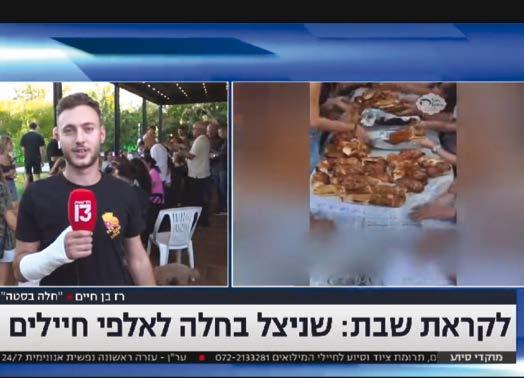
55
Raz Ben Haim in the middle with his volunteer friends
A BEACON OF HOPE
REICHMAN UNIVERSITY’S VOLUNTEERING INITIATIVE SUPPORTING SOLDIERS
In times of conflict, the spirit of solidarity shines brightest, and this sentiment is exemplified by Reichman University’s extraordinary initiative to support its drafted students and their friends. As the call to duty resonated across the nation, the University, led by Dr. Adi Kol, Dean of Students, with the dedicated efforts of Atalia Toronto, Chairperson of the Student Union, and Prof. Lior Zemer, Dean of the Harry Radzyner Law School, embarked on a mission to send military care packages to its soldiers on the frontlines and stationed in military bases nationwide.
More than a mere collection of goods, this endeavor is solidarity and a light in the darkness. The university’s committed team of volunteers worked tirelessly to gather not only essential items and equipment for soldiers but also to nurture a sense of community and support. From the initial stages of donation collection to the meticulous preparation of care packages and their delivery to bases, the volunteers and drivers played a pivotal role in ensuring that these essential supplies reached our brave soldiers.
Atalia Toronto, who is also an MA Law, Technology & Business Innovation student in addition to being the Chairperson of Reichman University’s Student Union, reflects on their impactful work, stating, “Throughout our involvement in preparing military care packages for soldiers, we reached approximately 3,000 reservist men and women students and their friends across the country. This was made possible by the dedication of about 1,000 incredible volunteers who stood with us throughout this entire period. Even in challenging times, we witnessed the growth of positive initiatives, thanks to the generosity of good people.”
During the operation to support our soldiers, the German Ambassador to Israel, H.E. Steffen Seibert, and his wife, Mrs. Sophia Gundelach came for a visit. It was important for them to contribute their part and pack a box of goods for the soldiers themselves. They even wrote an encouraging letter to the soldiers and added it to the box to be eventually sent to the soldiers in the front.
Lihi Safran, a second-year Psychology student, finds deep meaning in contributing to the well-being of reservists at the University. She notes, “Compassion is a source of inspiration and strength, aimed at instilling hope and creating new opportunities.” The initiative not only provided essential support to soldiers but also highlighted the power of empathy and shared responsibility among the University community.
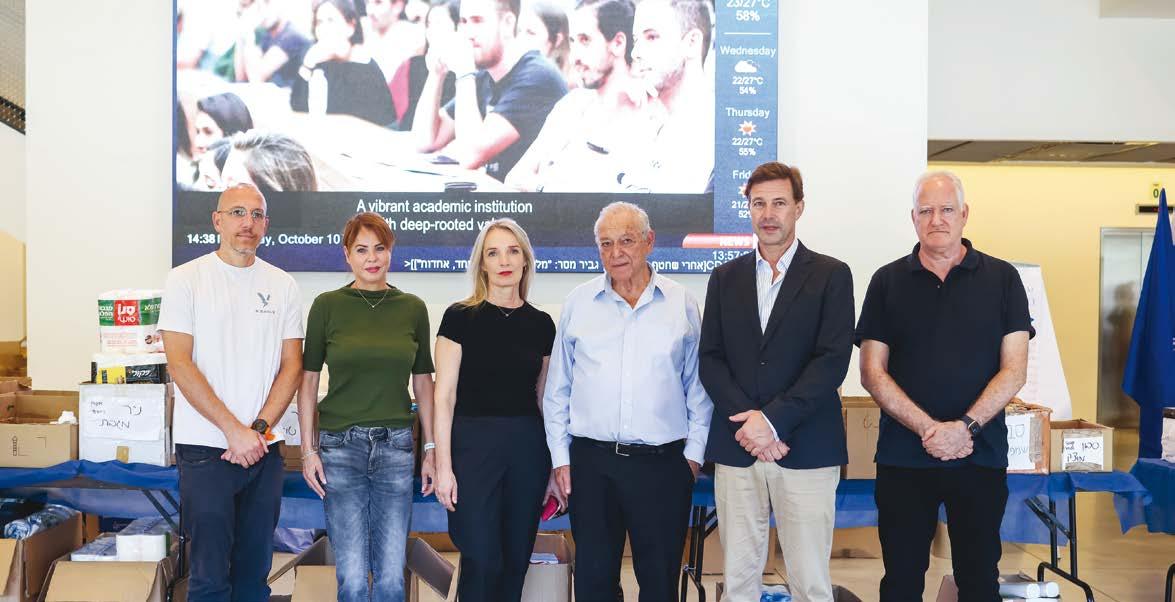
///
56 | Herzliyan 2024
From left: Prof. Lior Zemer, Dean, Harry Radzyner Law School, Dr. Ayelet Ben-Ezer, CEO & Vice President, Mrs. Sophia Gundelach, wife of the German Ambassador to Israel, Prof. Uriel Reichman, Founding President and Chairperson of the Board of Directors, German Ambassador to the State of Israel, H.E. Steffen Seibert and Prof. Boaz Ganor, President
Beyond the noble cause of supporting soldiers, the companionship forged among volunteers during their time working together created lasting memories and friendships that transcended shared responsibilities. The initiative not only enriched the volunteers’ experiences but also emphasized the strength that emerges when a community comes together for a common purpose.
Reichman University’s commitment to supporting its drafted students and friends through the military care package initiative is a testament to the resilience and compassion of its community. In the face of adversity, our University has proven that, indeed, good things can grow thanks to the dedication of good people. As the nation unites in solidarity, the lasting impact of this volunteering effort will resonate not only on the battlefield but also in the hearts of all those who contributed to this inspiring cause.


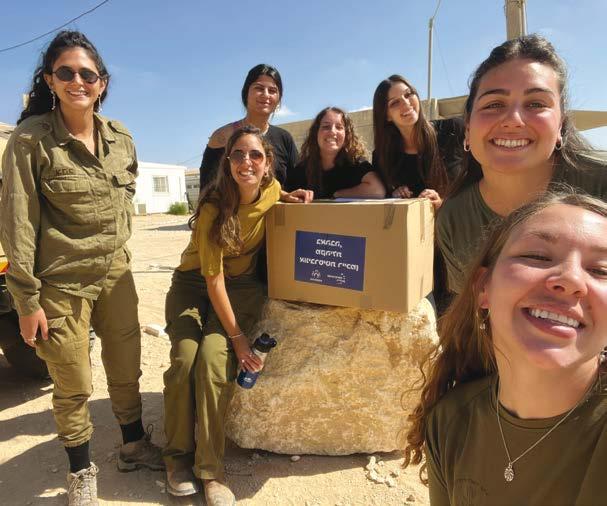
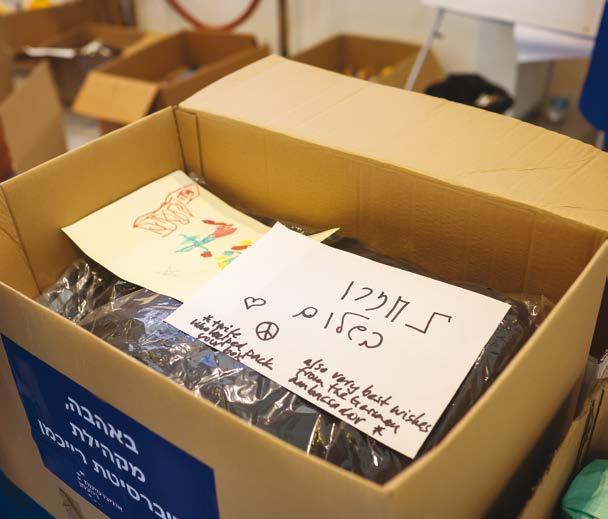 The German Ambassador to the State of Israel, H.E. Steffen Seibert, prepares a package for the soldiers and leaves a note
From left: Prof. Lior Zemer, Dean, Harry Radzyner Law School, student volunteers, German Ambassador to the State of Israel, H.E. Steffen Seibert, and his wife, Mrs. Sophia Gundelach
The German Ambassador to the State of Israel, H.E. Steffen Seibert, prepares a package for the soldiers and leaves a note
From left: Prof. Lior Zemer, Dean, Harry Radzyner Law School, student volunteers, German Ambassador to the State of Israel, H.E. Steffen Seibert, and his wife, Mrs. Sophia Gundelach
57
Girl power! Reichman University’s student reservists enjoy the care package they received
DEMOCRACY UNDER FIRE?
RCCC’S NEW PODCAST SERIES
The Rubinstein Center for Constitutional Challenges (RCCC) led by three leading scholars: Dr. Avigdor (Dori) Klagsbald, Prof. Liav Orgad, and Prof. Yaniv Roznai, is the world’s first intellectual hub to address the most urgent constitutional challenges in Israel and the Western world. Israel’s constitutional structure, in particular, is in a constant crisis which has been in a continuous state of emergency since 1948.
During the current Israel-Gaza war, the RCCC conducted numerous outreach initiatives by discussing crucial legal and humanitarian matters related to the “Swords of Iron” war. Among its efforts: publishing articles, producing podcasts addressing various war-related issues, and opening up a series of urgent Zoom events. These discussions delved into challenging questions on the public agenda during the war, particularly regarding the legality of the conflict, legal challenges in the conduct of hostilities, and post-war inquiries.
In this coverage, the RCCC highlights its podcast activity, as it addresses and covers a wide range of constitutional issues across various categories. In the first relevant podcast, they hosted Prof. Yishai Beer, an expert in the laws of war and a military
general who participated in military operations such as the Entebbe raid and the Litani operation. Prof. Beer engaged in a comprehensive discussion about the legal dilemmas arising from the war in Gaza, addressing critical issues such as the state’s obligations towards abductees, the rationale behind adhering to the laws of war when faced with an adversary flouting international law, the constraints imposed on IDF soldiers, and the potential risk of IDF soldiers facing prosecution in the ICC.
In another podcast, the RCCC hosted hosted Raviv Drucker, a leading journalist, who delved into the intricate dynamics of the media’s role during times of conflict. Drucker illuminated the moral and professional quandaries that confront media professionals in the contemporary landscape. The blurred line between facts and narratives amid war is a pressing concern, prompting us to explore the challenges journalists encounter as they navigate this complex environment. Among the thoughtprovoking questions discussed were: What ethical considerations should guide journalists in their reporting during armed conflicts? How does the media grapple with the interplay between facts and the narratives that emerge in the chaos of war? What should conscientious journalists refrain from broadcasting during these tumultuous times? And, critically, can the media effectively serve as the vigilant “watchdog” of democracy during wartime upheaval?
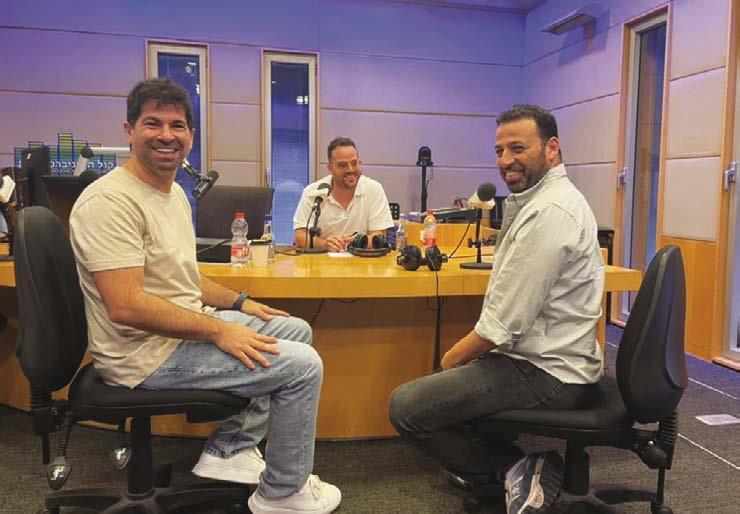
///
58 | Herzliyan 2024
From left: Prof. Liav Orgad, Co-Director of the Rubinstein Center for Constitutional Challenges, Prof. Yaniv Roznai, Vice Dean, The Harry Radzyner School of Law and Co-Director of the Rubinstein Center for Constitutional Challenges, and Raviv Drucker, Political Commentator for Channel 13 News
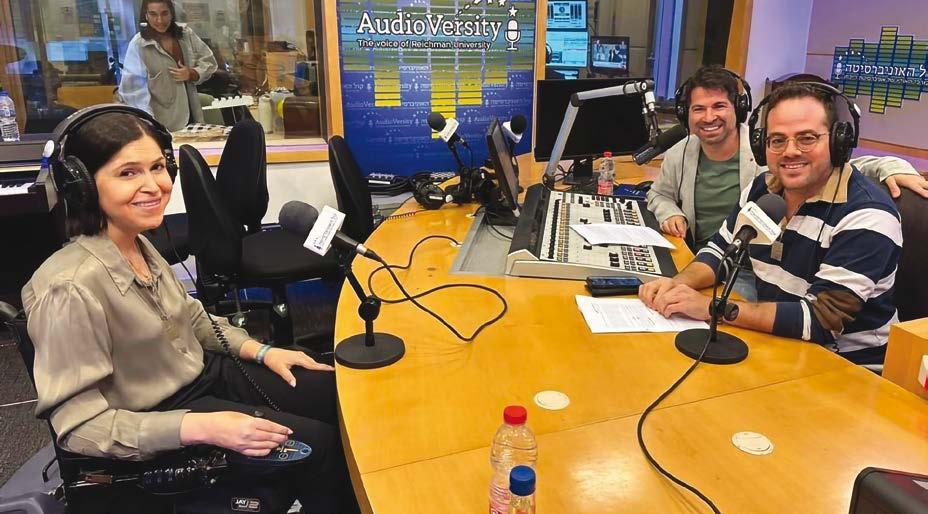
On the question of ethics during war, the RCCC hosted Prof. Asa Kasher, a renowned Israeli philosopher who also authored the Israel Defense Forces’s Code of Conduct. Prof. Kasher was also a member of the Shamgar Commission, established to provide a conduct guide in case of hostage takings, following the case of Gilad Shalit, who was kidnapped in 2006 and released in exchange for the liberation of hundreds of Palestinian prisoners. We spoke with Prof. Kasher on the moral dilemmas a democratic state faces when engaged with a vicious enemy such as Hamas and the hundreds of hostages held by it.
Later, focusing on the political arena, they hosted MK Karin Elharar, who also serves on the important Committee for the Selection of Judges, as she discussed the intersection of politics and wartime dynamics. In this conversation, they delved into pressing questions that have sparked public curiosity. The dialogue explored the nuanced role of politics in times of war, pondering whether the opposition should adopt a more statesmanlike or militant stance. The Center also hosted MK Avigdor Lieberman and discussed the potential post-war scenario in the Middle East. Is the twostate solution no longer feasible? Could there be consideration for a new political initiative where Gaza is transferred to Egypt, and Area A is annexed by Jordan?
The RCCC continues its podcast series with interesting figures such as Prof. Avichai Mandelblit, former Attorney General, former MK Stav Shafir, former President of the Israeli Supreme Court Dorit Beinisch, and many more.
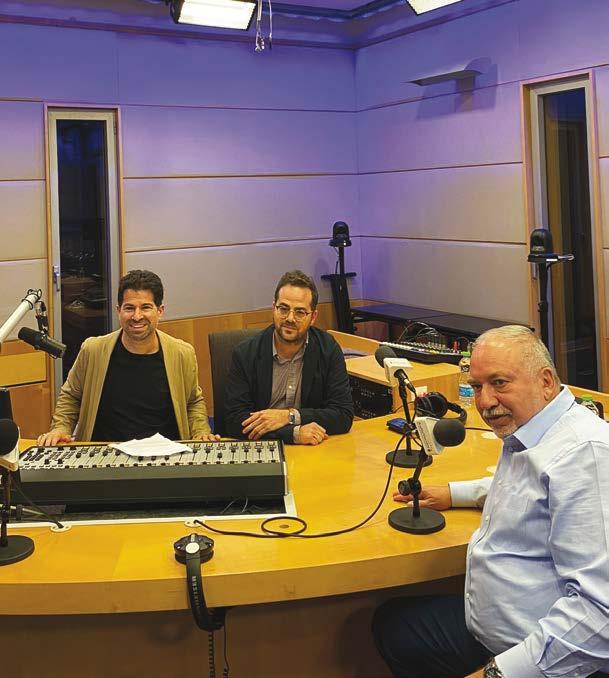 From left: MK Karin Elharar, Prof. Liav Orgad, Co-Director of the Rubinstein Center for Constitutional Challenges and Prof. Yaniv Roznai, Vice Dean, The Harry Radzyner School of Law and Co-Director of the Rubinstein Center for Constitutional Challenges
From left: MK Karin Elharar, Prof. Liav Orgad, Co-Director of the Rubinstein Center for Constitutional Challenges and Prof. Yaniv Roznai, Vice Dean, The Harry Radzyner School of Law and Co-Director of the Rubinstein Center for Constitutional Challenges
59
From left: Prof. Liav Orgad, Co-Director of the Rubinstein Center for Constitutional and Prof. Yaniv Roznai, Vice Dean, The Harry Radzyner School of Law and Co-Director of the Rubinstein Center for Constitutional Challenges, and MK Avigdor Lieberman
NAVIGATING THE DIGITAL BATTLEFIELD: SOCIAL NETWORKS IN TIMES OF WAR
In an era dominated by the digital realm, the intersection of technology, warfare, and ethical considerations should take center stage. The Zvi Meitar Institute for Legal Implications of Emerging Technologies at Reichman University, in collaboration with the Shurat HaDin organization, recently organized a conference on the impact of social networks during times of war. While originally planned before the outbreak of the October 7th war, the conflict provided a new dimension to the discourse, focusing the conference on freedom of expression, fake news, and the influence of social networks on public opinion, specifically addressing the rise of anti-semitism and the encouragement of terrorism worldwide.
Key figures in the discussion included Attorney Nitsana Darshan-Leitner, President of Shurat HaDin, who engaged in a conversation with H.E. Mark Regev, Senior Advisor to the Prime Minister and former Israeli Ambassador to the United Kingdom. The focal point of their discussion was the role of fake news in asymmetric warfare. Darshan-Leitner posed critical questions about how democratic countries can defend themselves against organizations operating outside the boundaries of international law, employing fake news as a tool of war. Regev responded emphatically, asserting that democratic nations should adhere to self-imposed ethical and moral limitations even in the face of such unconventional warfare.
Another significant contributor to the conversation was Attorney Emi Palmor, a member of Meta’s content moderation Oversight Board. Meta has established a “regulatory startup” in the form of an Oversight Board comprising 23 experts from various fields, tasked with addressing fundamental issues related to human rights and freedom of expression for Meta’s 2.2 billion users globally. This unique tribunal invites public input on its decisions, aiming to create a more inclusive and transparent approach to governance. Palmor shed light on Meta’s innovative approach to addressing some of these pressing war-related challenges in social media.
Highlighting the global nature of the discussion, the Meta Oversight Board engages stakeholders in virtual round tables, allowing diverse perspectives to shape decisions. Unfortunately, as mentioned during the conference, Israeli organizations have been hesitant to participate, revealing a gap in our global representation.
Attorney Emi Palmor, member of Meta’s content moderation Oversight Board
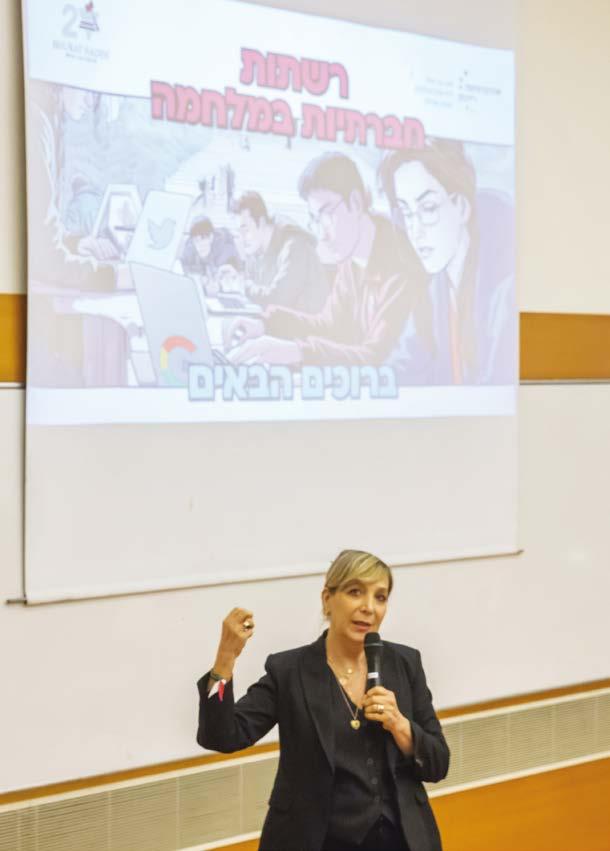
///
60 | Herzliyan 2024
From left: Attorney Tal-Or Cohen Montemayor, CEO and founder of CyberWell, Dr. Assaf Weiner, Head of Regulation and Policy at the Israel Internet Association, Prof. Karin Nahon, Head of the Data, Government and Democracy Division at the Sammy Ofer School of Communications, Col. (Res.) Miri Eisin, Director of the International Institute for Counter-Terrorism, and Prof. Dov Greenbaum, Director of the Zvi Meitar Institute
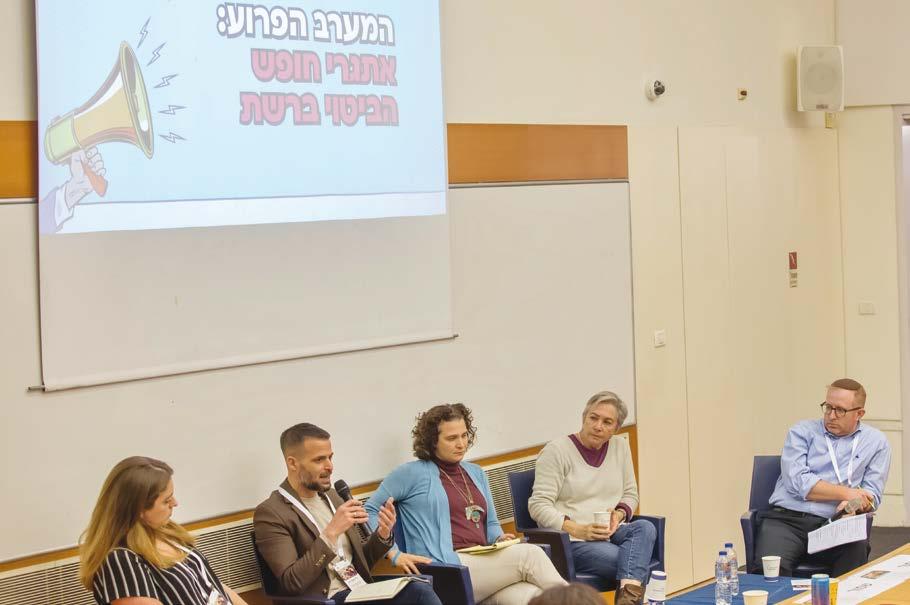
The conference concluded with a panel discussion, moderated by Prof. Dov Greenbaum, Director of the Zvi Meitar Institute, on “The Wild West – the challenges of freedom of expression on social media”, featuring insights from experts in counter-terrorism, data governance, and the Israel Internet Association.
Col. (Res.) Miri Eisin, Director of the International Institute for Counter-Terrorism at Reichman University, emphasized the need to address the framing of terrorism in media narratives. She noted the challenge of conveying the reality of actions, particularly in the context of international audiences with differing perspectives.
Prof. Karin Nahon, Head of the Data, Government and Democracy Division at the Sammy Ofer School of Communications, highlighted the prevalence of fake news in a world dominated by social networks. She underscored the non-neutral nature of these platforms, shaped by the values of their creators and influenced by sponsored campaigns and agendas.
Dr. Assaf Weiner, Head of Regulation and Policy at the Israel Internet Association, emphasized the role of citizens in combating fake news and incitement. He encouraged active reporting of false information, shifting some responsibility from the platforms to the public.
Attorney Tal-Or Cohen Montemayor, CEO and founder of CyberWell, an initiative focused on dealing with online antisemitism, provided a sobering perspective on the increase in anti-semitism on social networks since the outbreak of the October 7th war. Cohen called for learning from history and implementing checks and balances on social networks to prevent the spread of hate.
In a world where information travels at the speed of light, the conference highlighted the urgent need for collective efforts to navigate the challenges posed by social networks during times of war. We need innovative solutions, ethical considerations, and global cooperation to ensure that the digital battlefield remains a space of dialogue rather than division.
61
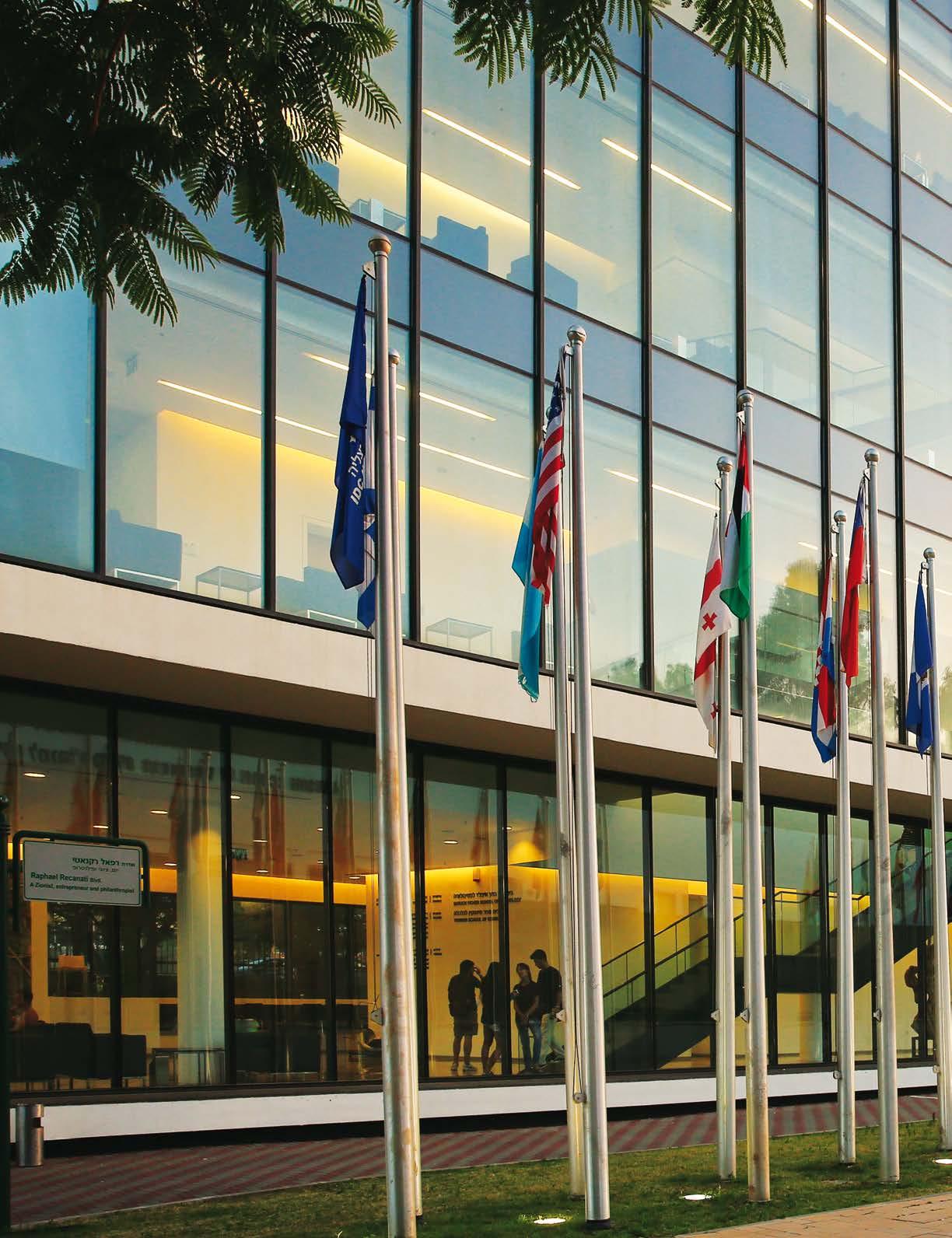
3TIOMKIN SCHOOL OF ECONOMICS
Preparing the global financial leaders of tomorrow.
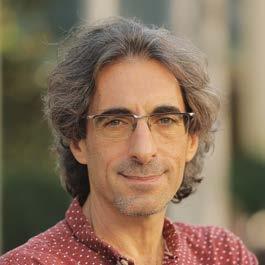
 Prof. Itzhak Gilboa, Dean
Judy and Avi Tiomkin
Prof. Itzhak Gilboa, Dean
Judy and Avi Tiomkin
62 | Herzliyan 2024
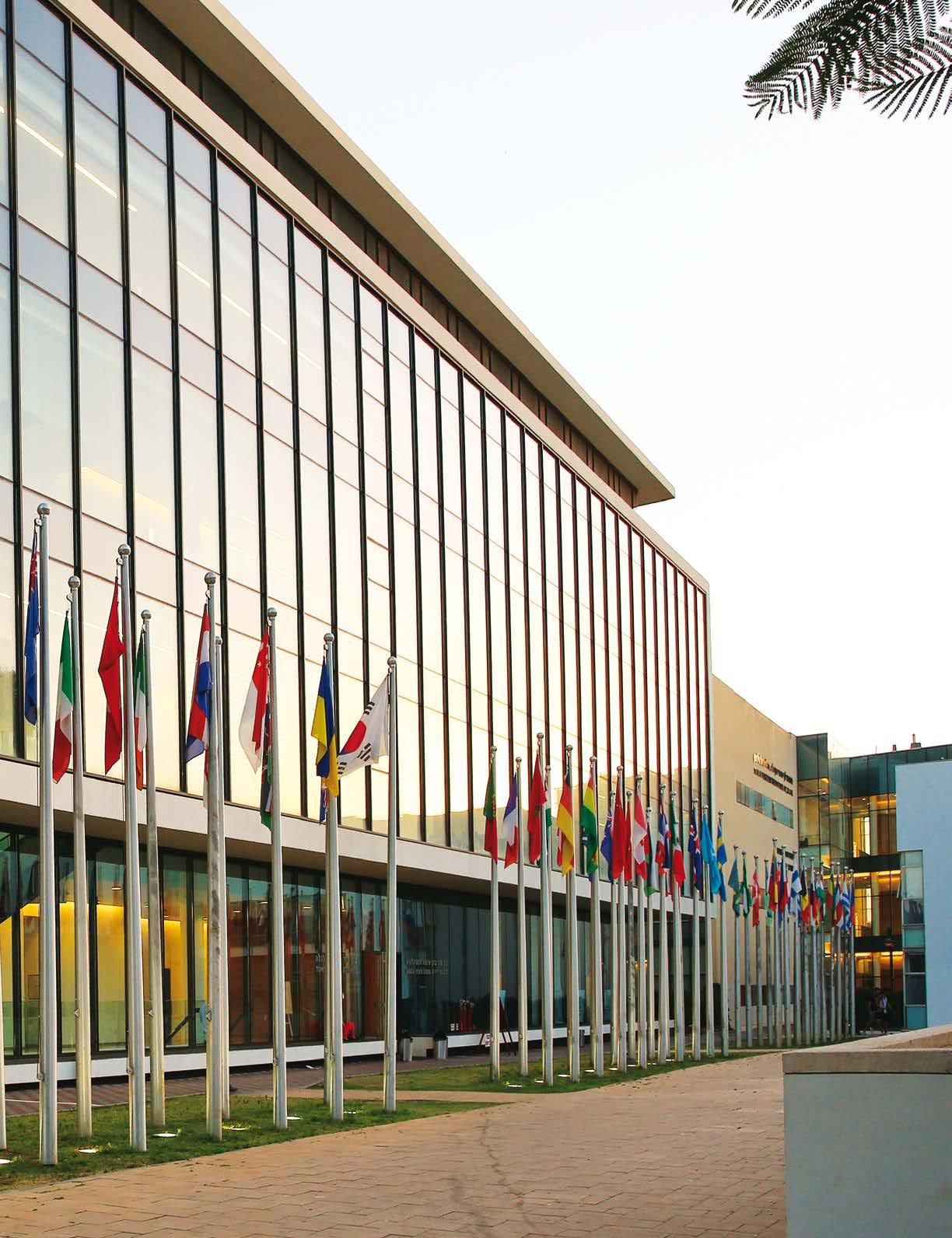
THE EFFECTS OF THE WAR ON ISRAEL’S ECONOMY AND THE REQUIRED POLICY MEASURES
In late December, the Aaron Institute for Economic Policy at the Tiomkin School of Economics hosted a roundtable discussion titled “The Effects of the War on Israel’s Economy and the Required Policy Measures”.
Prof. Zvi Eckstein, Founding Dean of the Tiomkin School of Economics and Head of the Aaron Institute, presented a study co-authored with Dr. Sarit Menahem-Carmi, Dr. Sergei Sumkin, and Dr. Idit Kalisher, senior researchers at the Aaron Institute. The study, based on two scenarios for the war’s development, devised by MIND Israel researchers specializing in national security, led by Major General (res.) Amos Yadlin and Major General (ret.) Giora Eiland, assessed the costs of the war and its potential economic effects. The reference scenario assumed ongoing fighting – as has been unfolding in recent months – leading to a forecasted GDP growth of 1.5% in 2023 (lower than the annual 4.2% in 2017-2022) and at most 1% in 2024, meaning a decrease in GDP per capita. The extreme scenario assumed escalated warfare on the northern border in the first quarter of 2024, leading to a forecasted GDP decrease of 2% in 2024.
Prof. Eckstein presented immediate policy measures, including enhancing the government’s executive capabilities, establishing an economic cabinet, and designing a new state budget for 2024, aligned with the new economic reality, and emphasized the crucial need for a responsible fiscal policy to maintain trust in the Israeli economy among financial markets, credit rating agencies, and investors.
Maj. Gen. Eiland added that the defense budget will be increased in 2024 to address lessons of the war and the consequent changes needed to restore military capacities, including a dramatic bolstering of the defensive element in Israel’s national security conception. However, he emphasized that future increases should be considered with efficiency in mind.
Lt. Gen. (ret.) Gabi Ashkenazi, former IDF Chief of Staff and Minister of Foreign Affairs, claimed that a war on the northern front is becoming more pertinent and that 2024 will be a year of warfare, with a prolonged process resembling Operation Defensive Shield in 2002. He highlighted the increased likelihood of escalation in the West Bank and ruled out shortening compulsory military service.
Prof. Rafi Melnik, former Reichman University President, pointed out potential risks in two key anchors of Israel’s economy: the 30-year-long decrease in the ratio of the defense budget to the GDP and the increase in the debt-to-GDP ratio caused by the war. Increasing defense consumption necessitates expanding its sources, as the economy is at full employment, and imports should be increased to avoid curtailing civilian expenditure.
Mr. Aiman Saif presented the effects of the war on Israel’s Arab society, describing the severe drop in the employment of Arab men in October 2023 and its recovery in November, calling for persisting with the efforts toward economic integration of the Arab society and promoting social cohesion.
Ms. Shira Greenberg, former Chief Economist in the Finance Ministry, called to scrap the coalition funds, particularly funding of the Haredi school system to incentivize it to incorporate core subjects, while also canceling food stamps and allowances to incentivize integration in employment. Ms. Greenberg also argued for limiting the defense budget and increasing it with efficiency considerations in mind, as it may come at the expense of civilian spending, and called for improving workforce quality in the public sector alongside paying more heed to the professional echelon’s recommendations.
///
63

/// ALL IN
DEDICATED TO MY STUDENT OMER BALVA, WHO LOST HIS LIFE ON DUTY IN THE NORTH
By Dr. Yael Hadass
Saturday morning. October 21st 2024. Two WhatsApp messages from people I would never have expected to hear from on a Saturday morning. 7:54. Jonathan Davis, VP of External Relations and Head of the International School at Reichman University: “Omer Balva, Business and Economics, your student, I assume? Just killed in action, Hashem Ikom Damo. Please let me know ASAP.”
Mr. Kobi Haber emphasized that while the economy is stronger than before, the current situation is unlikely to unfold like the COVID-19 crisis but rather more like the events of September 2000, following the dot-com crash. Mr. Haber added that aid should be provided to relevant impacted portions of the high-tech sector while also maintaining sound foreign trade relationships.
Mr. Itay Temkin predicted a permanent budget increase of around NIS 25 billion, starting in the 2025 budget. Accordingly, the desired policy would be streamlining and increasing the budget while focusing on consumer taxes since these are less distorted.
Mr. Shlomo Dovrat stressed that Israeli leadership’s behavior will set Israel’s economic course as well. Israeli political leadership should demonstrate fiscal responsibility and enact appropriate measures based on sensible priorities to prevent severe economic damages and regain public trust.
The event was attended by over 100 people and received extensive media coverage.
The other message was from a first-year student, Mikey: “8:41. Hi Yael. I am sorry to send you this message. Omer Balva, one of the students from our class, was killed yesterday while on duty in the north.”
Shock.
I am looking at my WhatsApp contacts and find out that I have corresponded with Omer Balva quite a bit. He took three classes that I taught this year. I read a message that I remember receiving:
“Hi Yael, I want to tell you that I had work today that prevented me from coming to your class. I never come to class, but I do watch all the recordings and the readings that you upload to the course platform. I am deeply sorry with full intent if I have hurt you or made you think that your class is not important. I see a huge importance in the class and I appreciate the material you teach us and your initiative to teach us (personal finance). I am sure that If I could have come to class, I would have benefited, but I could not come.”
Prof. Zvi Eckstein, Founding Dean of the Tiomkin School of Economics and Head of the Aaron Institute
64 | Herzliyan 2024
I remember that I found this message very heartwarming at the time he sent it to me. How many students think about how the lecturer feels if they don’t come to class? I think that he was the only one. What a sensitive person, I think to myself at the time.
At the funeral, Omer’s father gives a heartwarming eulogy.
Omer was traveling on vacation in the US when the war started. He heard about the war and asked his father to book him an air ticket back to Israel. Omer’s father says that he kept telling Omer there were no tickets, but Omer insisted. Omer arrived in Israel and immediately got ready to join his unit up north.
His father took him up north on a Tuesday. He was killed on that Friday by an anti-tank missile. His girlfriend, Odelia Barak, describes what a loving boyfriend he was to her. She cries and reveals a true and genuine love. What a loss, I think. How many people in the world find such love so early in their lives?
Then comes the CEO of the company Omer worked in and describes what a dedicated worker Omer was. I have visited many funerals in my life, but hearing a CEO speaking about his 22-year-old employee who worked in the company for about a year is not something I have ever witnessed. The CEO says that Omer made a great impression on his managers and co-workers, and their last talk was about how Omer could advance in the company. Dedication. This is what I start to understand about Omer. Omer was dedicated to everything he did. To the fullest.
I go to the shiva. I meet Odelia and her mother. Odelia shows me a photo album that Omer prepared for her for their first anniversary. On every page, he has put a picture of something they did together and written how he felt about that moment. How he thought that Odelia was the most beautiful woman in the world.
In one picture, Odelia holds a baby, and he writes how he looks at her holding a baby and dreams about the family they will form one day.
In one week, I learn so much about my student, Omer Balva. Omer was all in. All in, in love. All in, in work. All in, in serving his country. All in, in sharing how he felt and documenting it. I learn that we have lost a true, dedicated soul, who died so early, full of potential, full of love, full of energy.
What a loss. May his memory be a blessing. I extend my sincere condolences to his loving family, to Odelia, his loving girlfriend, and to his many friends. Some of them are students in my class, who shared with me how much they miss him.
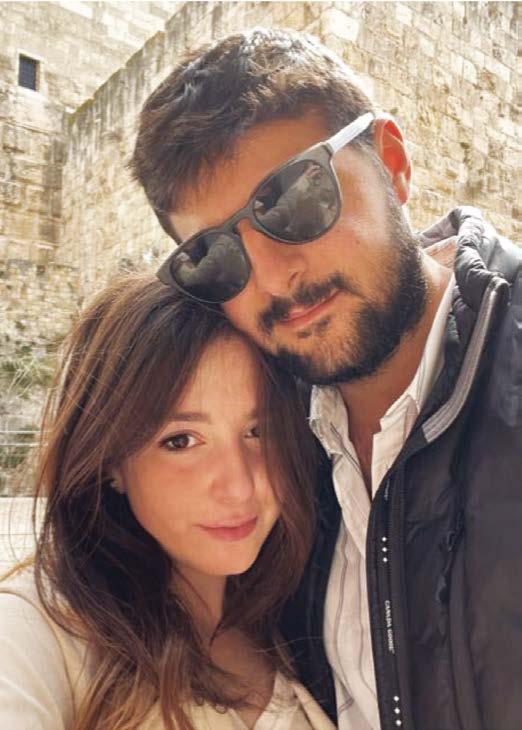
65
Omer Balva z”l with his girlfriend Odelia Barak
SOLDIERS IN THEIR EDUCATION
THE SCHOOL OF ECONOMICS GIVES RESERVISTS THE SPACE TO FOCUS ON THE WAR, WHILE SUPPORTING THEIR EDUCATION
Since October 7th, 2023, many of the students of the international programs in Economics were called to active reserve duty. These dedicated students, who are also dedicated combat soldiers and officers, both women and men, did not hesitate and enlisted immediately while giving all their strength to the efforts to destroying Hamas capabilities to harm Israel, and keep the Israeli borders clean from those who want to invade and hurt the Israeli population.
The university offers many solutions for students who are prevented from regular studies, such as special classes only to the reservists that are given upon their return, extra office hours, dismissal of few credits, and the opportunity to choose exemption of a few credits instead of numeric grades in a few classes to keep the pre-war GPA.
The entire faculty is collaborating to help our reservists get back on track. Dr. Yael Hadass, academic head of the International Programs in Economics, is meeting with each reservist personally, to make sure that all the options are clear and that the students aren’t lost in the war chaos.
Dr. Yael Hadass’s message to all the reservists is –you take care of returning home safely, don’t worry about the school, since we, the faculty, are committed to helping you find your way in the classes that you missed while you were busy in battle. You have risked your lives so we can have our normal routine and we will make sure that you are not harmed because of it. This is the best way to share the burden during war.
The personal meetings with the head of the program are very helpful to the reservists, as they have communicated themselves in a text they have sent. As one of the reservists, Major Josh wrote to Dr. Yael Hadass: “Hi Yael, first off I wanted to thank you for sitting down with me today. I know I told you in person but you and the faculty should know how much it means to me that the university is supporting us through these rough times. It makes it easier to do our job knowing that the school will have our backs and help us out where we need it…”
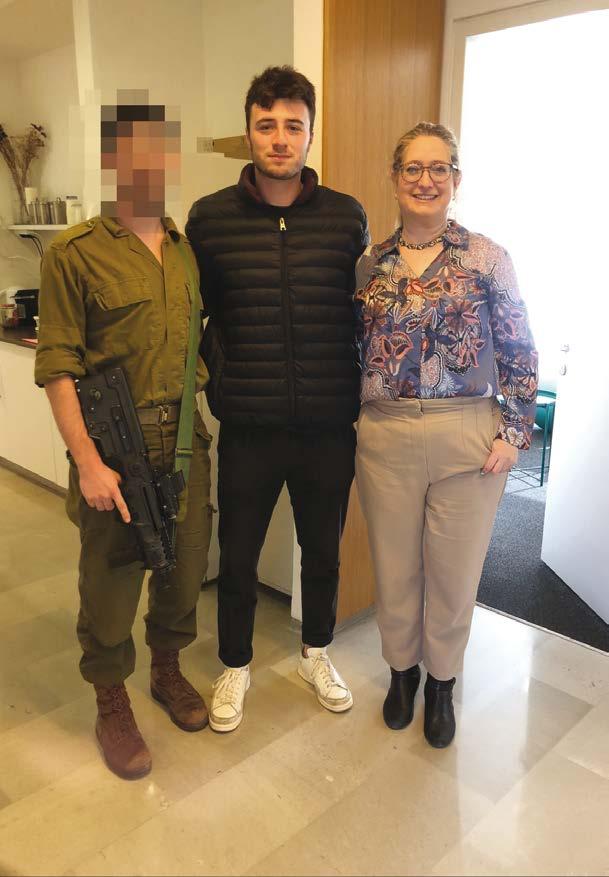
Second year students with Dr. Yael Hadass, academic head of the International Programs in Economics at the Tiomkin School of Economics
/// SUPPORTING
66 | Herzliyan 2024
STUDIES IN TIMES OF WAR
BY DR. YAEL HADASS
The war in Israel revealed, to many of us, strengths we never knew we possessed. I was granted the unique opportunity to witness the resilience of our university and to take on an active leadership role within it. As the head of the International Programs in Economics, I encountered a distinct challenge: each course serves as the foundation for the subsequent one. Should our reservists miss more than one course in a semester, they risk losing an entire academic year.
Initially, university management developed a program anticipating the soldiers’ return by late December or early January. However, for the soldiers in my program, this was not the case. They returned towards the end of February, and exams were scheduled to start shortly after, with several commencing in March. Our concern was not their grades but their knowledge. How could we ensure that a group of reservists was prepared for their next semester in just four or five weeks when a regular semester spans three months?
Each lecturer proposed a plan that required numerous volunteer hours. It was heartwarming to see how every lecturer was willing to put in a lot of effort to ensure that the reservists would be able to study the material in such a short time. We all felt we offered important support to our soldiers who risked their lives to restore Israel’s safety following the horrific events of October 7th. Indeed, working alongside the professional and dedicated faculty members at Reichman University was a genuine pleasure.
For the course I teach, Principles of Microeconomics, I set an ambitious goal since it lays the groundwork for all Economics studies. I aimed to cover the entire course in six sessions, each equivalent to two regular classes. However, setting such a goal is not sufficient; the students must be willing to collaborate.
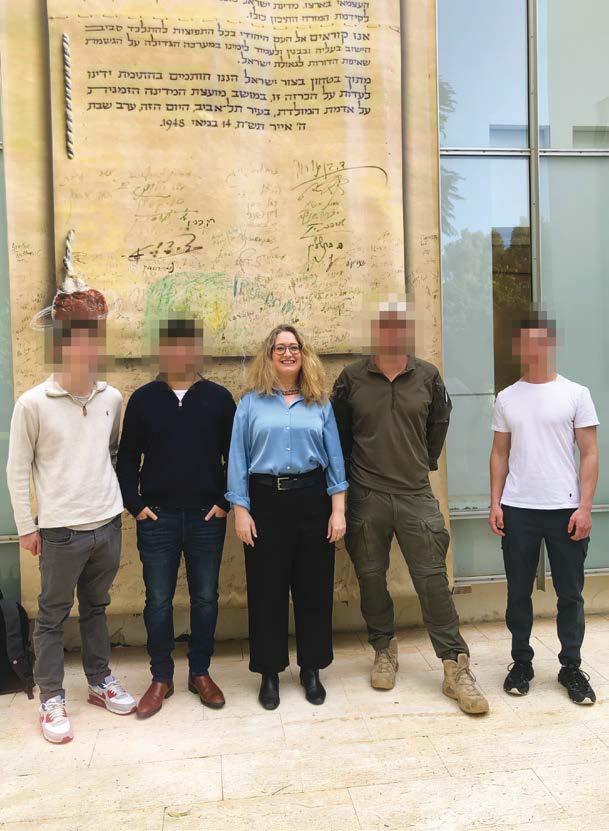
My first-year students were drafted on October 7th, before they could even begin their university education or gain an orientation to academic life.
One of my students was injured by a missile in the North, resulting in the loss of hearing in one ear and an inability to walk for several months. Despite these challenges, they were determined to fulfill their mission. In six weeks, I covered every slide I had taught their classmates throughout the semester. Their engagement was complete. They surprised me with exceptionally insightful questions that demonstrated a level of understanding typically seen after months of study. Even before the exam, I was confident we had achieved our mission. Their questions in class and via text confirmed their grasp of the material. To commemorate this achievement, I invited them to take a group photo beneath the Israeli Declaration of Independence displayed in the exam building.
I salute my dear students. Guiding you through this journey was an honor and a privilege.
To safeguard their privacy, we won’t display their faces. To those reading this post, I invite you to envision the faces of young, intelligent individuals who were called to serve in a devastating war, who dedicated four and a half months to this duty and then returned to conquer the academic challenges they missed, achieving their goals in a fraction of the usual time.
///
67
Dr. Yael Hadass with student reservists from the Tiomkin School of Economics

LAUDER SCHOOL OF GOVERNMENT, DIPLOMACY AND STRATEGY
Preparing students for leadership positions in a complex world.
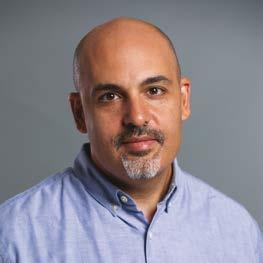
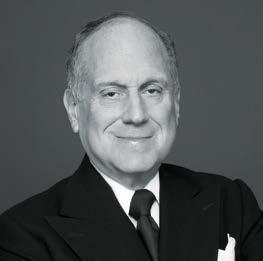
4
Prof. Assaf Moghadam, Dean
Amb. Ronald S. Lauder
68 | Herzliyan 2024
/// ״NEW CHALLENGES?
ANTI-ZIONISM AND ANTISEMITISM IN THE WAKE OF THE 2023 GAZA WAR” WEBINAR
In December 2023, the Program on Democratic Resilience and Development (PDRD) at the Lauder School of Government, Diplomacy and Strategy, in partnership with the Konrad Adenauer Foundation held an online event – “New Challenges? AntiZionism and Antisemitism in the Wake of the 2023 Gaza War”.
The Webinar, led by the Dean of the Lauder School, Prof. Assaf Moghadam, was honored to host Prof. Boaz Ganor, Reichman’s University president, Dr. Beatrice Gorawantschy, Head of the KAS office in Israel, Dr. Michael Borchard, Dr. Amichai Magen, Dr. Michal Cotler-Wunsh, Dr. Lesley Terris and Prof. Bruce Hoffman, Professor and Outgoing Director, Center for Jewish Civilization, Georgetown University. The speakers and panelists from Europe, the United States, and Israel offered an up-to-date discussion on the global rise of anti-Zionism after the October 7th attacks. Special emphasis was placed on the origins, nature, and implication of antisemitism on U.S. campuses.
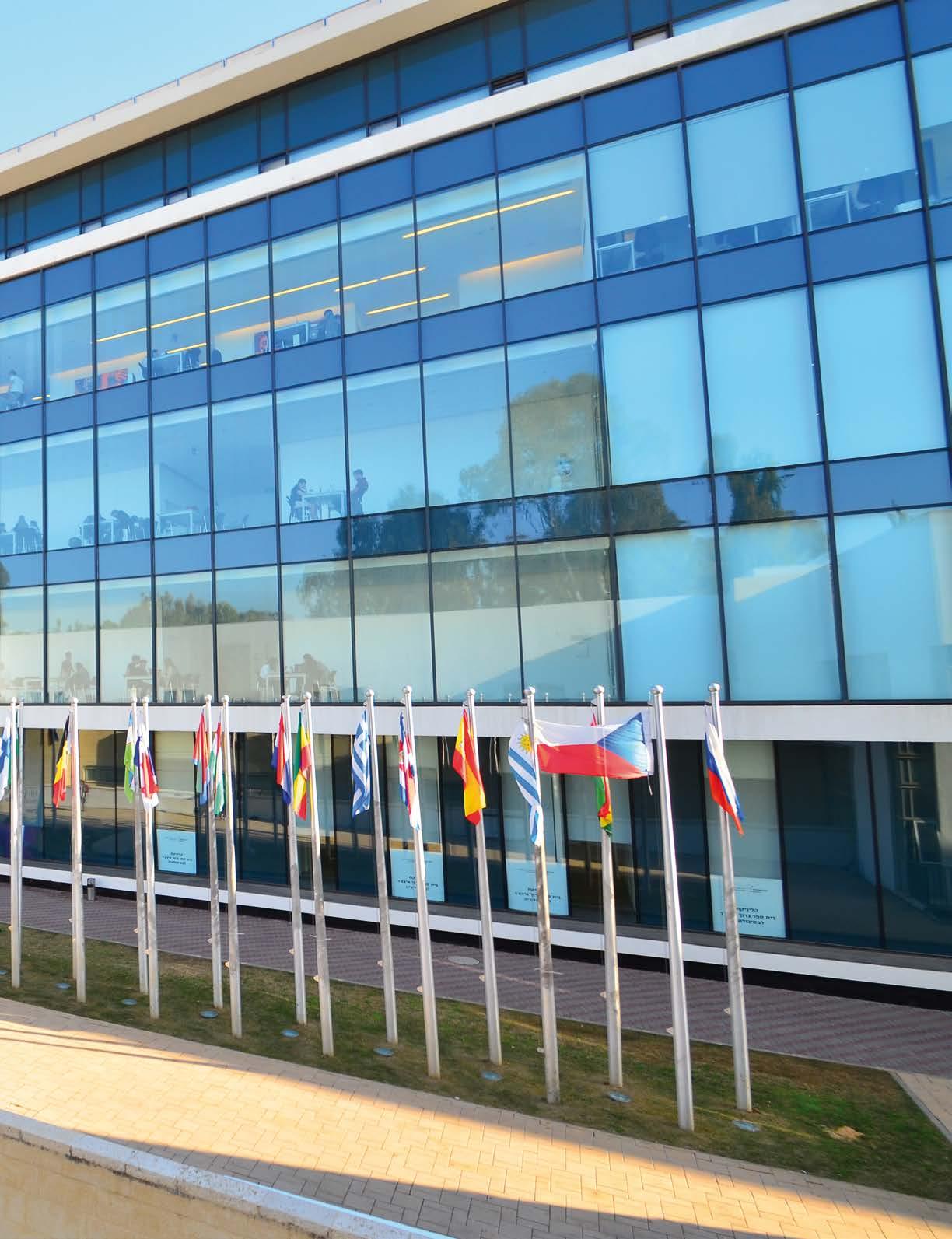
/// PHD IN GOVERNMENTVISIT OF ISRAEL COUNCIL FOR HIGHER EDUCATION COMMITTEE
In January 2024, an international committee appointed by the Israeli Council of Higher Education submitted a formal evaluation of the Lauder School’s fitness to confer a PhD degree. The committee members strongly endorsed the opening of such a program. In their own words, the members stated as follows: “The judgment of the committee is that the Lauder School has made a strong proposal. It builds on the foundation laid by the impressive academic institutes already established in the school. Moreover, it takes advantage of the talented faculty members at the Lauder School whose research records and international standings in their fields suggest they will not only train and professionalize doctoral students at a high level but also succeed in placing them into valuable careers. Consequently, we strongly recommend approval of the doctoral program in government.”
69
INTERNATIONAL INSTITUTE FOR COUNTER-TERRORISM (ICT)
Since October 7th, ICT experts have been actively engaged with international media, providing professional insights into the ongoing war along with research publications on ICT website and media platforms. This outreach ensures that credible and evidence-based perspectives are accessible to the global community. ICT experts have participated in over 250 interviews with international media outlets, were mentioned in more than 70 news articles, and conducted over 20 briefings for ambassadors, military attaches, the United Nations, Jewish communities, and the Israeli Defense Forces (IDF).
Highlighting our prominent initiatives:
(1) SIMULATION: NAVIGATING THE AFTERMATH IN THE GAZA STRIP
The Institute for Counter-Terrorism (ICT), led by director Col. (Res.) Miri Eisin, conducted a multiparticipant simulation, exploring diverse scenarios for the Gaza Strip in the aftermath of the war. Concurrently, working groups, featuring a diverse array of experts from Israel and around the world, examined the situation from various perspectives.
The simulation navigated alternatives for Gaza Strip control post-Operation “Swords of Iron,” including unilateral Israeli withdrawal, continued Israeli presence, control by the Palestinian Authority in coordination with the USA, control of a multinational force under the auspices of the United Nations, and control by a force composed of several moderate Arab states. Representatives of key players participated in the simulation, encompassing Israel, the USA, European countries, Russia, China, Iran, Turkey, Jordan, Egypt, Qatar, Emirates, Saudi Arabia, the PA, Hamas, PIJ, Hezbollah, Israeli Arabs and the UN.
A significant majority of the participating players expressed opposition to a prolonged Israeli presence in the Gaza Strip, expressing concerns about potential regional escalation. However, there was a consensus that a temporary IDF presence until control transitions to another entity is essential. The concept of a transitional period with the IDF maintaining a presence garnered agreement among participants. Most simulation players also opposed Israel’s unilateral withdrawal from the Gaza Strip, foreseeing potential chaos.
The preferred alternative for most participants was the transfer of control to the PA. Simultaneously, there was a broad consensus that the PA, in its current composition, lacks legitimacy and effective governance capabilities. The suggested alternatives included a reformed PA or the emergence of new Palestinian leadership with legitimacy both on the Gaza Street and in wider Palestinian society.
What are the alternatives for Israel?
Exploring alternatives for Israel, one proposal involved preserving the distinction between the West Bank and Gaza Strip by indirectly encouraging the installation of a governor for Gaza’s reconstruction alongside local Gazan leadership. Alternatively, longterm processes among the PA, including leadership changes, were considered.
What is Israel’s main challenge
The primary challenge facing Israel lies in the widening gap between its perception of the postwithdrawal scenario and that of its allies, particularly the United States and Europe, as well as potential partners like Saudi Arabia, Jordan, the Gulf nations, and Egypt. While allies anticipate Gaza transitioning into Palestinian control, Israel emphasizes security considerations, focusing on achieving effective control over the Gaza-Egypt area to prevent the resurgence of Hamas. This approach implies that there will be no full withdrawal, as Israel aims to balance its security priorities with evolving regional dynamics.
///
THE
70 | Herzliyan 2024
How to maintain security in the Gaza Strip
Addressing security concerns in the Gaza Strip, experts underscored the necessity of preserving military freedom of action, IDF control of a strategic kilometer perimeter along the Gaza Strip, and full control of the Philadelphia axis to prevent the renewed strengthening of Hamas and other resistance elements.
What to do during the transition period
During the anticipated transition period, experts emphasized the necessity of Israeli control to prevent security deterioration and a governmental vacuum. This entails Israeli control with a “civilian administration” based on the local population in Gaza, including an orderly “exit plan."
Countering Hamas as a hybrid terror organization
Hamas, a hybrid terrorist organization, encompasses military, political, and social branches, all operating under its leadership. Israel must be prepared to address the political and clerical wing, as well as the social wing—the Da’wah organization. A multifaceted strategy is needed, involving crucial delegitimization efforts through global and local awareness campaigns. Simultaneously, a comprehensive, cross-organizational system is necessary to counter radicalization among Palestinians in Gaza, West Bank, and East Jerusalem, using non-security tools to address issues like incitement, education, society, and religion, mitigating the risk of escalation under different civilian rule in the Gaza Strip.
The multi-arena war
Considering the wider regional dynamics, the conflict in the Gaza Strip is interconnected with broader geopolitical considerations. The Islamic resistance poses a common challenge to Israel, expressed through different angles. Any solution for the Gaza Strip, whether temporary or long-term, must account for the wider regional landscape, including Hamas’s influence in the West Bank and Lebanon, as well as the activities of Iran, Hezbollah, and allies in the Shiite axis.
The 22nd World Summit on Counter-Terrorism, organized by the International Institute for CounterTerrorism (ICT), took place from September 10th to 12th, 2023, in memory of Mr. Shabtai Shavit (z”l).
Mr. Shavit was the Co-Founder and Chairman Emeritus of the Board of Directors at ICT, Reichman University, and served as the Director of Mossad from 1989 to 1996.
This year, the ICT will host the Shabtai Shavit World Summit on Counter-Terrorism from October 6th to 8th, 2024, with the theme “From 11/09 to 07/10: Navigating New Threats.”
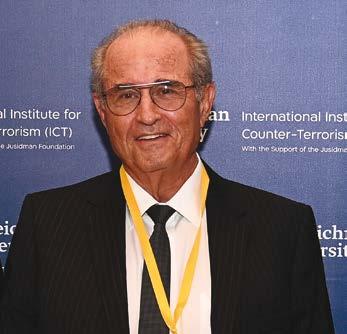

Prof. Boaz Ganor, President, the Rt. Hon. James Cleverly, Secretary of State for Foreign, Commonwealth and Development Affairs, UK, Prof. Uriel Reichman, Founding President and Chairman of the Board of Directors
71
Mr. Shabtai Shavit (z”l)
(2) STRENGTHENING CIVIL PREPAREDNESS AMIDST THE CHALLENGES OF WAR
The Institute for Counter-Terrorism (ICT) is actively engaged in advancing civil preparedness on the Homefront, particularly in response to various emergency situations and war time. One notable focus is preparing for the challenges posed by prolonged military operations, where terrorist organizations initiate large-scale missile attacks targeting the Israeli civilian population. Recognizing the pivotal role of national resilience, the ICT led in this project by Lt. Col. (Res.) Uri Ben Yaakov, Director of Development, and a Senior Researcher, is committed to optimizing the availability and allocation of resources in support of the broader war effort.
Key operations within the ongoing conflict include the implementation of a pilot program in the Herzliya municipality. This initiative serves as a testing ground for innovative approaches to enhance civil preparedness. The successful outcomes and lessons learned from Herzliya will inform the expansion of the project to additional cities across Israel. Collaborative efforts with third-sector organizations further amplify the reach and impact of the ICT’s initiatives, fostering a comprehensive and community-driven approach to preparedness. Since the beginning of Operation “Swords of Iron,” the ICT, in collaboration with third-party non-profit organizations, has worked to rapidly expand the methodology and implementation to additional cities across Israel. This initiative is undertaken with the acknowledgment that Israel is facing a multi-war arena.
Beyond national borders, the ICT is actively working to extend its knowledge-sharing efforts to Jewish communities abroad. This global perspective ensures that the insights gained, and strategies developed in Israel can be applied in diverse contexts, strengthening the overall resilience of Jewish communities facing potential security threats. The ICT’s multifaceted approach underscores its dedication to fostering preparedness at both local and international levels, contributing to a more resilient and secure Homefront
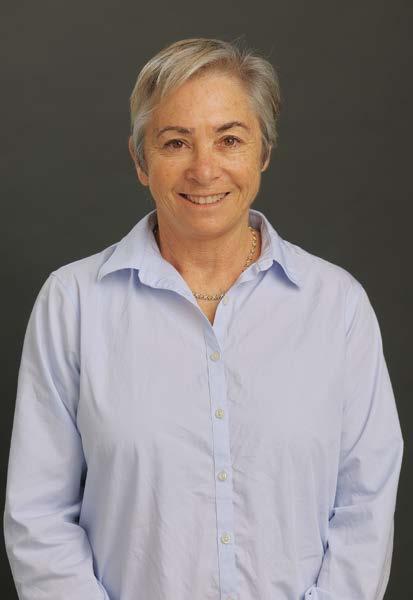
Col. (Res.) Miri Eisin, Director of the International Institute for Counter-Terrorism (ICT)
(3) ICT SELECTED RESEARCH PUBLICATIONS
“After the War: Five Key Challenges for Israel”
Col. (Res.) Miri Eisin, Director of the International Institute for Counter-Terrorism (ICT). First published in Maariv Online.
https://ict.org.il/after-the-war-five-keychallenges-for-israel/
“Hamas: Threat on the International Arena After the End of the War in Gaza”
Dr. Ely Karmon, Senior Research Scholar at The International Institute for Counter-Terrorism (ICT).
https://ict.org.il/hamasthreat-on-the-internationalarena-after-the-end-of-the-war-in-gaza/
“Threats of Jewish Population Around the World”
Dr. Michael Barak, Senior Researcher, the International Institute for Counter-Terrorism (ICT).
https://ict.org.il/threats-of-jewish-populationaround-the-world/
“Countering Hate in the Digital Age: Analyzing FarRight Extremist Responses to the Israel-Hamas War”
Dr. Liram Koblentz-Stenzler, Senior Researcher and Head of the Global Far-right Extremism Desk at the International Institute for Counter-Terrorism (ICT).
https://ict.org.il/far-right-response-to-israelhamas-war/
“Hamas Media Campaign: ’Al Aqsa Flood’”
Dr. Eitan Azani, Director of Research, the International Institute for Counter-Terrorism (ICT); Daniel Haberfeld, Co-Head of the Cyber-Terrorism Desk, the International Institute for Counter-Terrorism (ICT).
https://ict.org.il/hamas-media-campaign-alaqsa-flood/
72 | Herzliyan 2024
/// INSTITUTE FOR POLICY & STRATEGY (IPS)
ISRAEL WILL PREVAIL
Interview with Maj. Gen. (Res.) Amos Gilead
Executive Director, Institute for Policy and Strategy (IPS), Chairman of the Institute’s Annual Herzliya Conference Series, Reichman University
On October 7th 2023, thousands of Hamas terrorists invaded Israel and committed the worst massacre of innocent civilians. The terror attack included horrible war crimes; they broke into civilian homes, shooting, burning, raping, and beheading. They brutally kidnapped more than 200 hundred innocent people to the Gaza strip: the elderly, mothers with their babies, children, young men and women, and soldiers.
The Hamas atrocities will forever be remembered as dark days in the history of the state of Israel. It has no other option but to destroy Hamas as a combined terror organization and political entity. In evaluating the ongoing conflict, Maj. Gen (res.) Amos Gilead pointed out two significant mistakes made by Hamas that are likely to lead to its eventual defeat, despite the challenges it poses.
First, Hamas erred by targeting women, the elderly, children, and civilians in a brutal massacre. The livestreamed images and evidence collected afterward were reminiscent of the Holocaust, including acts of beheadings, burning, rape, and holding hostages in inhumane conditions. This calculated Hamas policy was aimed at breaking the will and belief of the Israeli population but, surprisingly, resulted in greater unity among Israelis. This can be seen in the soldiers’ morale, which is at an all-time high, civilians rallying for the war effort, and the strong and united homefront.
Second, Hamas made a critical miscalculation by expecting widespread support for their war effort on several fronts. This support has not materialized as anticipated.
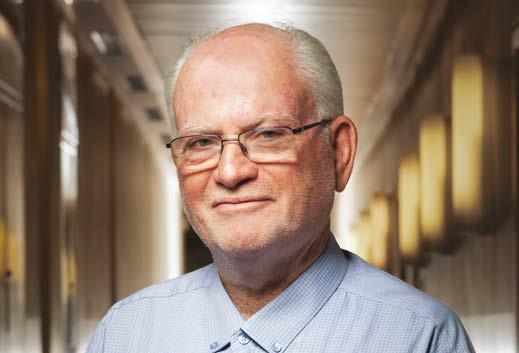 Maj. Gen. (Res.) Amos Gilead Executive Director, Institute for Policy and Strategy (IPS)
Maj. Gen. (Res.) Amos Gilead Executive Director, Institute for Policy and Strategy (IPS)
A closer examination of the Arab world reveals a united stance against the Muslim Brotherhood, of which Hamas is perceived as an extension.
Presently, the Muslim Brotherhood is active in Turkey. Notably, both Egypt and Morocco have previously dealt with the Muslim Brotherhood and took decisive actions by defeating and banning the organization within their borders. Given this context, Jordan is cautious about avoiding the same mistake and has not allowed the Muslim Brotherhood into their country. The lack of support for Hamas in the broader Arab world, coupled with the aversion towards the Muslim Brotherhood, diminishes the backing Hamas expected on multiple fronts, further complicating their strategic position in the ongoing conflict.
However, the significant achievements vis-á-vis Hamas must be combined with the political steps led by the U.S. administration. Israel’s power relies on military, technological, and economic capabilities alongside political wisdom and strategic vision. To a large extent, these depend on the strategic alliance with the United States and special ties with the peace and normalization of Arab states. Currently, a robust coalition of Arab nations brokered by the USA is willing to join an alliance and eventually normalize ties with Israel. This coalition recognizes the existence of an axis of evil led by Iran and supported by Russia, which relies on proxies entrenched in Syria and Yemen.
Israel should formulate an overall strategy for curbing Iran’s multidimensional buildup. Such a strategy should be founded on two pillars: one on the military level by accelerating force buildup processes with the help of the United States; the other on the diplomatic level via collaborations with the international community.
73
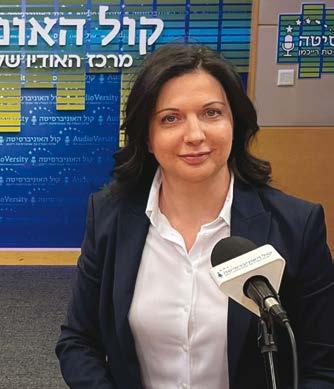
WHY ARE RELATIONS BETWEEN THE JEWISH PEOPLE & THE STATE OF ISRAEL
JUST AS IMPORTANT AND VITAL AS EVER?
Interview with Ms. Iirina Nevzlin
Chair, Board of Directors, Anu - Museum of the Jewish People; President, Nadav Foundation
Marking International Holocaust Remembrance Day, the IPS held a special conversation with Ms. Irina Nevzlin, who explained: The October 7th catastrophe has intensified the solidarity many Jews around the world feel with Israel. A new yet old aspect has emerged, the complex relations between the Jewish people and the State of Israel, and between the State of Israel and the Jewish people. Some had underestimated them.
In the conversations, many important questions were raised: Why are the special relations between the Jewish people and the State of Israel so important? How did October 7th affect the Jewish community around the world? What is the role played by the Jewish communities, and how should we strengthen the ties between the world Jewry and the State of Israel?
All these questions and more are discussed in the podcast. To listen to the podcast, visit the Institute for Policy and Strategy website.
THE FUTURE RISKS OF RECENT EVENTS IN LEADING U.S. UNIVERSITIES
Prof. Jonathan Gershoni World-renowned professor
The October 7th massacre perpetrated by thousands of Hamas terrorists has revealed cruel and inhuman atrocities. Surprisingly, the response seen across many U.S. campuses has been hundreds of ProHamas student-demonstrations. In their wake, the school had the honor of a one-on-one conversation with Prof. Jonathan Gershoni, a world-renowned professor in his field, on the IPS podcast channel. He has vast experience and is highly familiar with leading universities in the U.S. The discussion raised poignant questions as well as future implications of this phenomenon for the State of Israel. Where did the support and funding to coordinate such extensive and widespread rallies come from? Why haven’t university leaderships intervened to restrict such overtly anti-Semitic demonstrations? And what are the root causes of this development?
Listen to this fascinating conversation and the insights that have emerged from it on the IPS podcast, available on their website and the university radio channel.
THE WAR IN GAZA: IPS SELECTED PUBLICATION
The Gaza War operates on two tracks: the first is the IDF’s remarkable fighting abilities, and the second is strategic thinking, primarily about the “day after”. The IPS’s written and media activity is focusing on analysing and providing recommendations for the strategy that Israel now requires.
To read more:
https//:app.activetrail.com/S/zijizfzztxwe.htm
Gen.
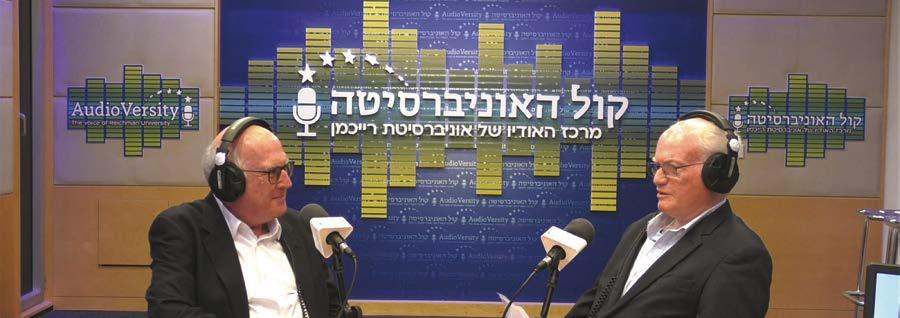 Ms Irina Nevzlin
Ms Irina Nevzlin
74 | Herzliyan 2024
Maj.
(res.) Gilead with Prof. Jonathan Gershoni
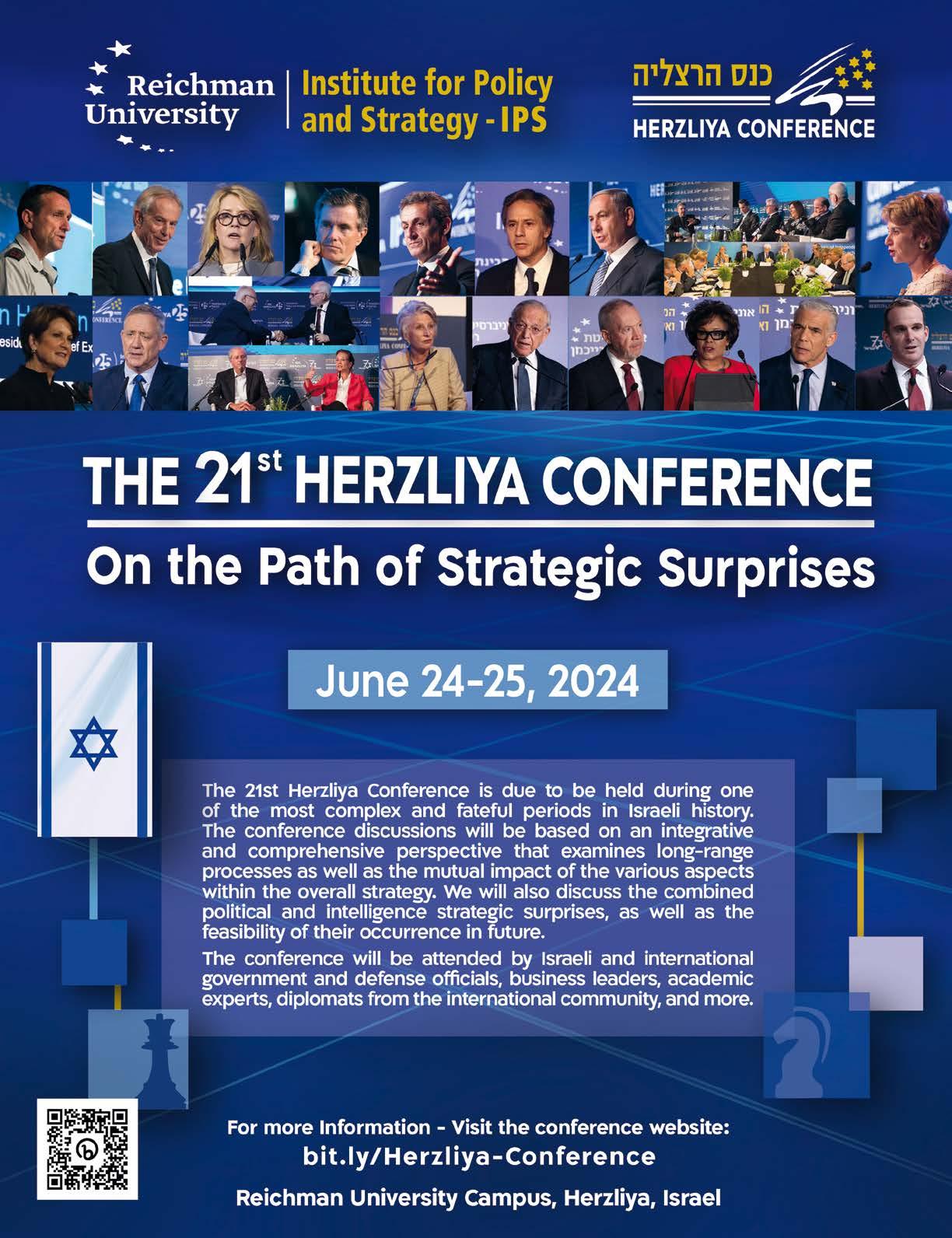
75
/// THE ABBA EBAN INSTITUTE
As soon as the Israel-Hamas war broke out, the Abba Eban Institute quickly mobilized, adapting its regular operations in response to the changing circumstances. The Institute’s senior team members were particularly instrumental in providing pinpoint analysis and advice to policymakers on specific issues where their expertise was needed most, helping to better understand and navigate the strategic landscape.
The Institute made an impact in the mainstream media with the alumni of the first Israel Story Fellowship making appearances on CNN, Fox News, and CBS. These fellows, a diverse group of professionals from across Israel, were trained in essential messaging and storytelling techniques, a crucial asset in the contemporary context of public diplomacy. Having completed the program just three months before the fighting hostilities, they have promptly utilized their skills during the unfolding crisis, reluctantly positioned at the epicenter of the terrorist attacks, some on the frontline, others treating the wounded or seeking shelter in the face of danger. Despite the difficult circumstances, their training and determination have allowed them to provide invaluable insights and narratives to media outlets worldwide, showcasing the significant role of the Israel Story Fellowship.
On the social media front, working with Reichman University’s online activism initiative, ACT.IL, the Abba Eban Institute led a special situation room on campus, taking an active role in Israel’s public diplomacy efforts. With local and international students and volunteers, the team worked, and continues to work, tirelessly on combating antisemitism and terrorist propaganda spread online.
In addition to the existing operation with North American audiences, ACT.IL included a very effective engagement with European audiences, thanks to the efforts made by a dedicated newly formed European desk that creates tailor-made content for each audience.
ACT.IL’s impact was felt also on U.S. streets and campuses, as they were able to rally their 40,000 activists worldwide to take part in campaigns exposing antisemitic and Hamas-sympathizing officials who showed support for the October 7th attack, and holding them accountable for their actions. In the first three months since launching the situation room, the original content created by the Institute’s team has reached millions of viewers worldwide and has been shared by online influencers in the U.S., Europe, and Israel.
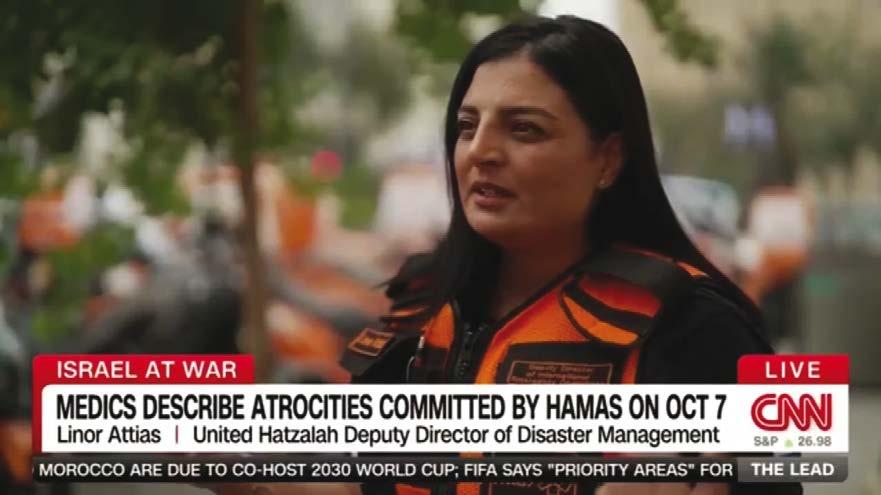
76 | Herzliyan 2024
Linor Atias, United Hatzalah, a Graduate of the Israel Story Fellowship, on CNN, October 2023

The war has reiterated the role of military diplomacy and how crucial it is in establishing and building new relationships. Having identified the need to enhance the skill set and professional knowledge of those in the defense forces who liaise with counterparts from other countries, the Insitute conducted a special program in association with the IDF School for Military Diplomacy last year. This training proved all the more important once the hostilities broke out, as the need to secure regional cooperation and strategic coordination became pivotal.
The Arena magazine quickly adapted to the rapidly changing circumstances, modifying its regular publication schedule and launching a series of newly written, timely articles concerning broader geopolitical and regional implications of the conflict. The Arena’s focus has shifted to content that addresses the critical issues dominating the agenda or explores overlooked aspects demanding attention, offering a fresh perspective and injecting new thinking. These specially commissioned articles include new insights into the U.S. administration’s view of the hostilities, the Egyptian angle given the Houthi threat to maritime security and international trade, as well as covering the social media battlefield as part of the battle on the narrative, offering fresh and applied insights.
All the while, the Insititute has not neglected its commitment to providing mentorship, guidance, and extra content to students, many of whom are affected directly by the ongoing conflict. Students of the Public Diplomacy Honors Program were treated to a special study tour of the Google Campus in Tel Aviv, where they learned about the latest technological advancements including those in the fields of Artificial Intelligence and video creation and distribution, which are proving essential in today’s business and diplomatic arenas.
The Institute and Google’s teams also provided students with a special panel on digital public diplomacy by a senior diplomat at Israel’s Ministry of Foreign Affairs and an online influencer who runs a successful and effective one-person Israeli hasbara operation. The sessions covered social media and digital activities during the Swords of Iron War.
As operations on the ground continue and new challenges in the international and diplomatic theater are brought to the fore, the Institute’s senior team is constantly working to find ways in which their knowledge and expertise can best support the overall national effort. The Institute’s work will remain focused on infusing new ideas and helping decision-makers steer through the evolving situation, and they’ll continue to do so through advice, analysis and action.
77
The Arena Magazine, online version
INSTITUTE FOR LIBERTY AND RESPONSIBILITY
ISRAELIS DO NOT WANT U.S. TO DICTATE GAZA WAR GOALS
Asif
Efrat
The United States is playing a pivotal role in Israel’s current war in Gaza: providing weapons and military advice, and blocking UN resolutions unacceptable to Israel. But how do Israelis themselves view the American role? The answer is twofold. On the one hand, Israelis recognize their country’s dependence on U.S. support, and appreciate the United States and President Biden for providing it. On the other, Israelis believe the U.S.’s position should receive limited weight in determining the war’s goals and duration. Furthermore, Israeli Jews and Arabs differ markedly in their views on the American role in the war.
These findings, from the Institute for Liberty and Responsibility at Reichman University, are based on two public opinion polls conducted by iPanel, each involving a representative sample of roughly 800 Israelis. The first poll took place during the second week of the war (October 17th-19th), after the United States gave Israel its full support against Hamas. In fact, President Biden visited Israel that same week and promised massive military assistance. The Jewish public’s attitude toward the United States, which had been generally positive, became even more positive.
According to the poll, 86% of Israeli Jews had a favorable view of the United States in October; 81% of Jews had a favorable view of President Biden (up from 48% in May 2023). Interestingly, this high level of favorability was measured among both right-wing voters and left-wing voters. In fact, President Biden’s favorability among right-wing voters skyrocketed from 26% in May to 73% in October!
The October poll also showed Israelis’ full awareness of the crucial American contribution to their country’s security. 87% of Israelis believe the United States is Israel’s best ally; 86% believe Israel needs U.S. support; and 77% think Israel would be worse off if the United States reduced its support.
And yet, according to the second poll on December 17-19th, most Israelis did not think Israel should give significant weight to the U.S. position in determining the war’s goals or duration. Among Jews, only 23% –mostly left-wing voters – believed Israel should take the American view into consideration when setting the war’s goals; only 15% thought the American view should matter in determining the war’s duration. Note that the same poll found a very high degree of public dissatisfaction with the government. Only 32% of Jewish respondents indicated they were satisfied with the government’s performance during the war.
Despite Israelis’ lack of trust in their government and disappointment with its handling of the war, and despite the realization of Israel’s dependence on the United States, the majority of the Jewish public still want Israel to maintain its sovereignty and independence in shaping the course of the war.
Note that the views of the Arab public in Israel are a mirror image of the Jewish public’s views. The war reduced American favorability in the eyes of Arabs: from 40% expressing a favorable attitude toward the United States in May, prior to the war, to 28% in October. At the same time, 57% of Arabs believe that the United States should play a role in determining the war’s goals, and 55% think the U.S. should have a say in setting the war’s duration.
///
78 | Herzliyan 2024

This contrasts sharply with the preference of the Jewish public for little American involvement in steering the war.
Given this preference, the United States should tread carefully if it wishes to shape the course of the war. Israelis may disagree on the goals of the war, and they are far from reaching a consensus on who should rule Gaza post-war. But they do expect that the interests of the Israeli state and public will guide the Israeli government as it manages the military effort and its aftermath.
If the United States is seen as dictating the government’s policies, these might lose their public legitimacy. Any American attempt at influencing Israel’s government must thus be perceived by Israelis as respecting their country’s ultimate responsibility for its own security. Such respect is also vital for the long-term endurance of the special bond between the two countries.
Asif Efrat is an Associate Professor of Government at Reichman University and Substitute Head of the Institute for Liberty and Responsibility.
Findings from surveys of the Institute for Liberty and Responsibility during the War in Gaza:
In a public opinion survey conducted during the second week of the war, the Institute found a high level of public trust in the IDF.
73% of the Israeli public have trust in the military
The same survey identified a high level of patriotism among the Israeli public.
The vast majority of citizens91% - feel pride in being Israelis
This is an increase from 77% who expressed pride in September, just prior to the war.
A large majority of Israelis74% - wish that their children and grandchildren will live in Israel
In a survey in December, the survey examined public support for the idea of having more women in positions of political leadership as a means to make Israel stronger after the war.
Findings include:
50% of Israelis strongly support having more women in leadership positions
79
THE EVENTS OF OCTOBER 7TH REDUCED THE OPPOSITION OF THE RELIGIOUS AND ORTHODOX PUBLIC TO FEMALE COMBATANTS
Dr. Shahaf Zamir
One of the things the October 7th horror events highlighted was the huge contribution of IDF female soldiers in combat roles. Be it the field observers in the operations rooms, the combatants in the outposts, whether airborne or ground troops, in tanks and in aircraft, who encountered the terrorists head-on – commanded and carried out battles. The heroic deeds of the female combatants during the battles are prominent. There is not enough space to tell all the heroic acts of female combatants during that fateful day and in the ensuing fighting. Have the recent events strengthened the recognition of the importance of the deployment of women in combat roles in the IDF? A survey conducted by the Institute for Liberty and Responsibility at Reichman University during the sixth week of the war indicates that the Jewish public recognizes the importance of deploying IDF female soldiers in combat roles. 69% of respondents support the deployment of women as combat soldiers in the IDF’s combat units, while 16% hold a neutral position and 15% are opposed. This signifies a slight increase of 3% in the support rate, and a decrease of 5% in opposition, compared to a previous survey conducted in December 2022. There are significant differences between coalition voters and opposition voters. Among opposition voters (Jews only), 85% currently support the deployment of women in combat roles. This is a slight decrease of 4% in the support rate compared to the December 2022 survey. Among Jewish coalition voters, on the other hand, 52% of respondents currently support the deployment of women in combat roles, while 21% hold a neutral position and 28% are opposed. This suggests that the support rate for the deployment of female combatants has risen among coalition voters by 9% compared to December 2022!
Breaking down of the data by degree of religiousness accentuates the differences. Among secular Jews, 89% currently support the deployment of women in combat roles. This indicates a slight increase of 4% in the support rate compared to the previous survey.
Among “traditional” Jews (i.e., those who self-identify as neither secular nor strictly religious), there has been a similar increase of 5% in the support rate: 73% currently support the deployment of women in combat roles, while 20% hold a neutral position and 7% are opposed.
The most intriguing shifts have taken place among the stricter groups. Among those who self-identify as religious, we found that 36% currently support the deployment of women in combat roles: a 2% increase compared to the previous survey. 28% of religious respondents hold a neutral position, and 36% are opposed. This figure indicates a substantial drop in the opposition rate, which was 45% in the previous survey.
An interesting shift has also occurred among Haredi (ultra-Orthodox) respondents. The Haredi support for deployment of women in combat roles increased threefold: from 4% in the previous survey to 12% in the current one, while 21% hold a neutral position and 67% are opposed. This actually indicates a drop of 22% in opposition rate compared to the previous survey. Those who were previously opposed now express support, or a neutral view, towards the deployment of women in combat roles.
In conclusion, the majority of the public still supports the deployment of women in combat roles in the IDF, a notion which has been slightly reinforced following the events of October 7th. However, the largest shift is the decline in the opposition of the religious and Haredi populations to the deployment of women in combat roles. This is a significant finding, as it relates to population groups whose religious belief may justify opposing the deployment of women in combat roles. Time will tell whether this is a trend that will gain further momentum.
Dr. Shahaf Zamir is a senior researcher at the Institute for Liberty and Responsibility, Reichman University.
80 | Herzliyan 2024

/// ARGOV FELLOWS PROGRAM IN LEADERSHIP AND DIPLOMACY
The Argov Fellows Program in Leadership and Diplomacy started the year with five of its students on active reserve duty. Since October 7th, the dedicated Argov alumni network around the world has been working hard to source, purchase, and ship equipment to support the soldiers on the ground as well as those citizens who have been displaced from their homes.
At Reichman University, the Argov Class of 2024 has been cooperating with the ACT.IL situation room to create content for Israel’s public diplomacy. The students have created videos and social media posts and have helped with translation to spread Israel’s story to the world. In addition, one of the current Argov Fellows created an Instagram page to commemorate the victims of October 7th, while others participated in the RU Student Union volunteer operation to send packages to students on active duty.
At the end of the first semester, the Argov Class of 2024 went on a study tour to the U.S., where they had the opportunity to meet with their peers at leading universities, including Harvard, Brandeis, West Point, Georgetown University and Columbia. They also interacted with leading individuals in the public, private, and non-profit sectors, as well as leaders of the Jewish communities of Boston, New York, and Washington, D.C.
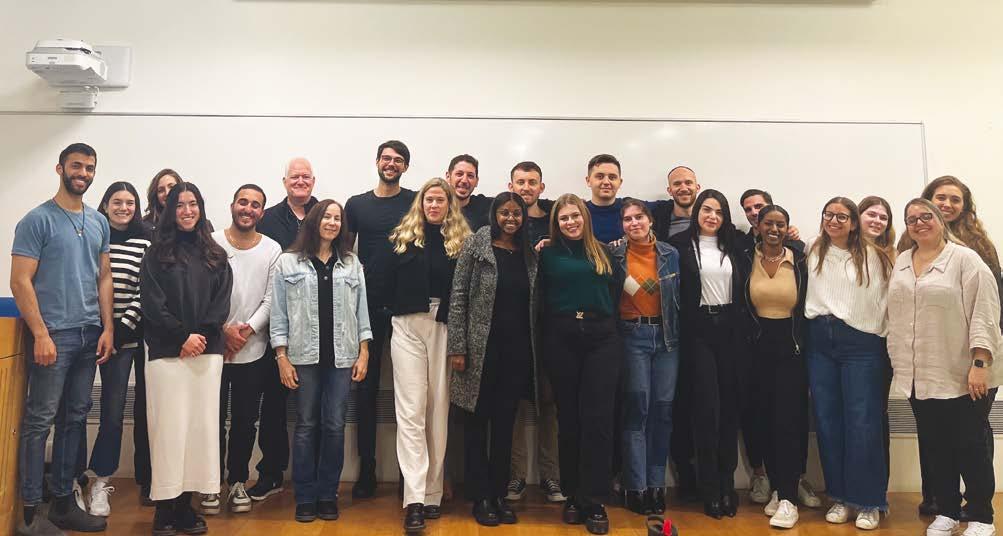
Argov Fellows ‘23-’24 Working closely with Prof. Boaz Ganor 81
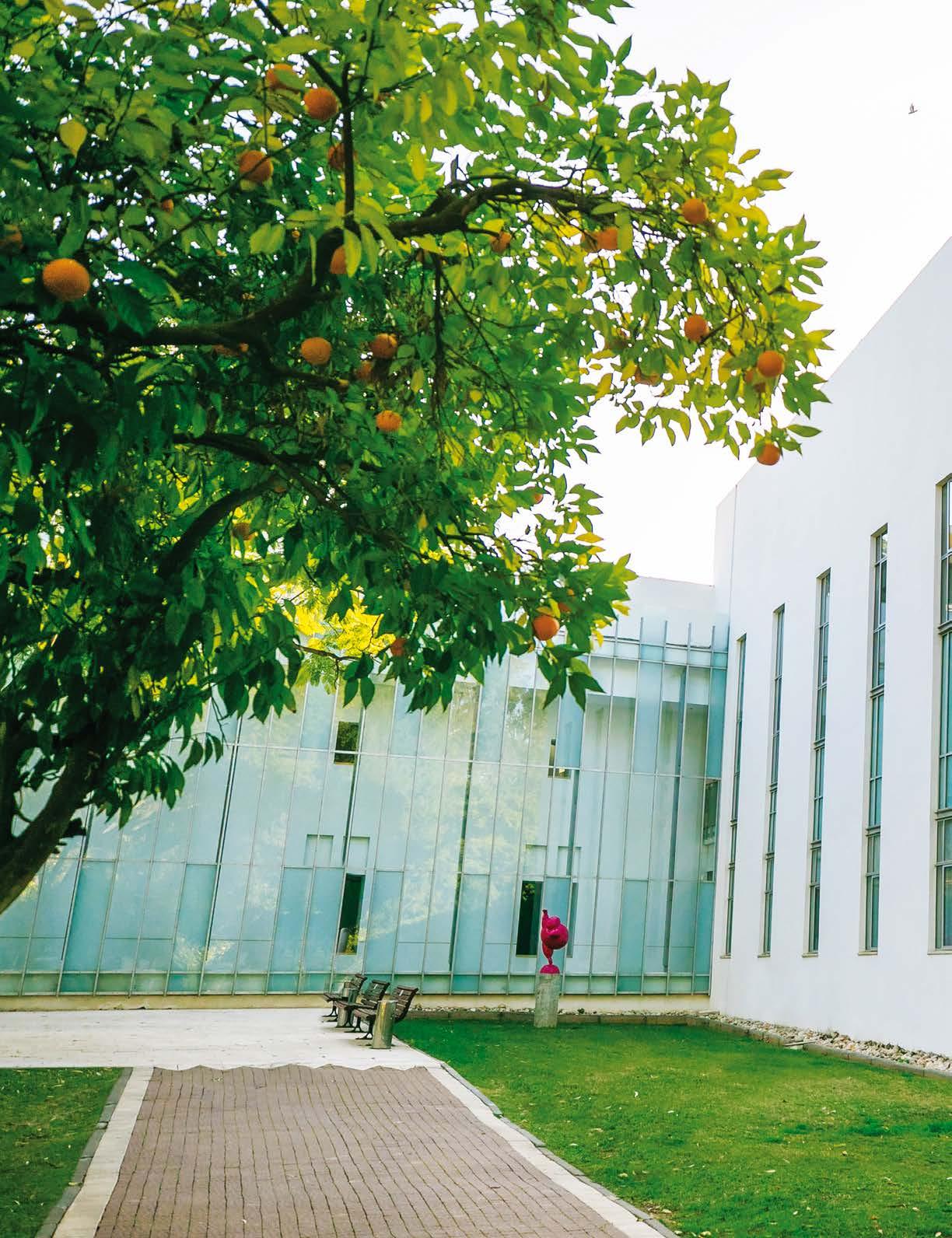
5ARISON SCHOOL OF BUSINESS
Equipping students in an era of digital transformation.

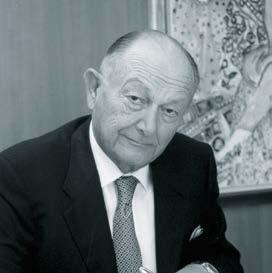 Prof. Niron Hashai, Dean
Prof. Niron Hashai, Dean
82 | Herzliyan 2024
Ted Arison z”l
JOINT PROJECT OF THE ARISON SCHOOL OF BUSINESS AND THE ADELSON SCHOOL OF ENTREPRENEURSHIP
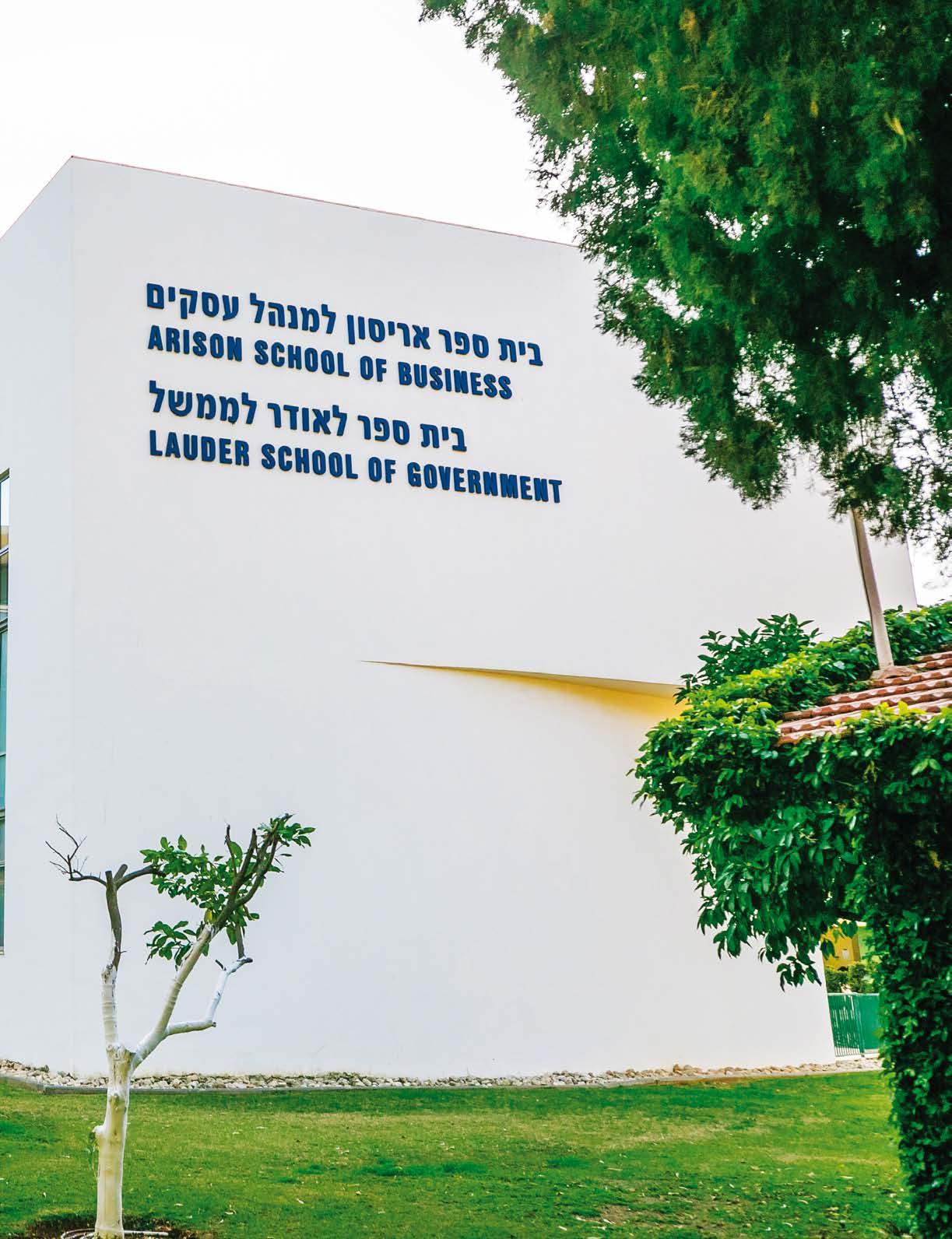
/// THE GENESIS PROJECT
Every Contribution Matters: The Impact of Even the Smallest Acts of Assistance
The Genesis Project, established by the Arison School of Business Administration and the Adelson School of Entrepreneurship at Reichman University, aims to provide business and occupational help to victims of the war in the fields of career and professional employment. Beyond the initial aid given to war victims, we must think ahead and prepare for “the day after”. The war has had a significant effect on victims’ career and employment situations, and in response, there needs to be a comprehensive system to meet their requirements.
The Genesis Project offers personal assistance to evacuees, affected businesses and reservists in the form of mentoring and business support, courses and training, as well as assistance in finding work.
To carry out the initiative, in the project’s early phases, the schools successfully recruited a team of business trustees, trained them, and formed a committee at the University. In addition, they established a physical business center at the University that operates throughout the week and recruited industry experts to serve as mentors for those seeking occupational business assistance.
The project is totally volunteer-driven, a kind of cooperation that is truly special and can only occur in the state of Israel. The students at Reichman University integrate their practical studies into assisting companies and businesses affected by the war in various fields such as digital marketing, user experience, website development, marketing strategy, and more.
In the project’s lifecycle, one of its stages has been matching applicants with their ideal mentors. After a conversation with each applicant to determine their specific needs and requirements, committed volunteers have worked diligently to find them their perfect match, considering their goals, aspirations and background. In just two weeks, hundreds of applicants have already received responses, and dozens of matches have been made.
83
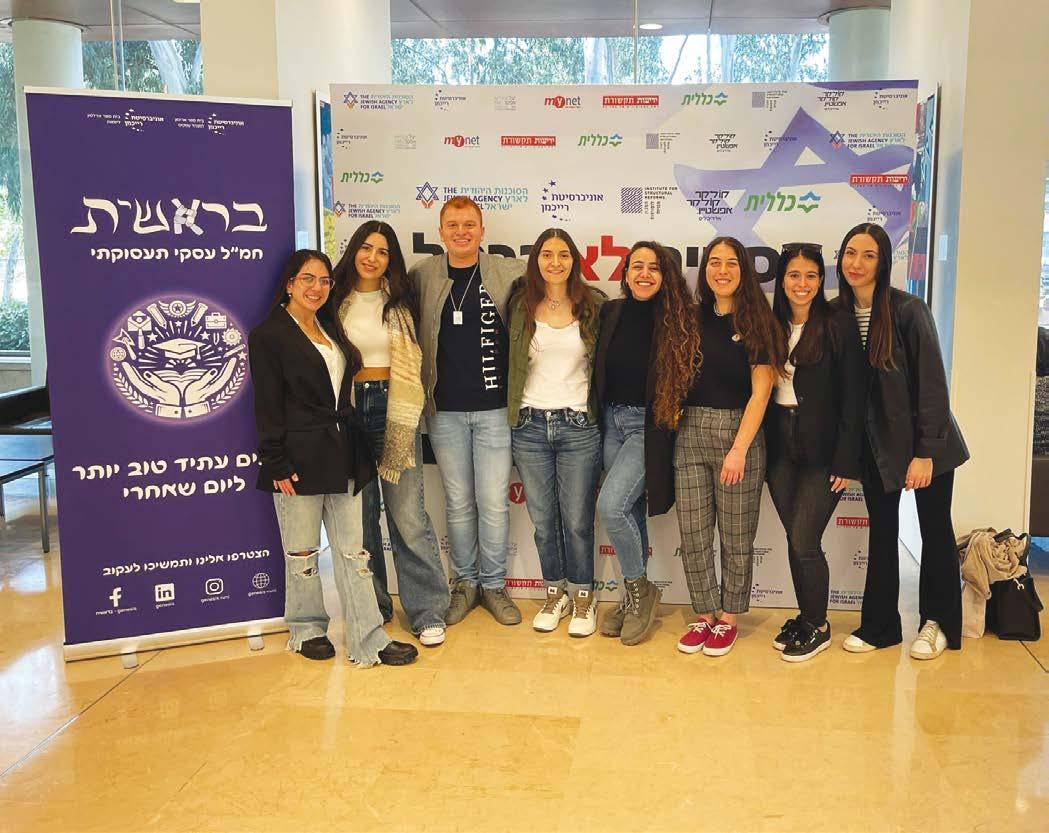
One successful match, for example, has been between Omer Bar, a freelance photographer, and Zlil Malchi, who has worked in digital marketing for over 12 years. Omer was born and raised in Kibbutz Alumim and in the last few years lived in London. Unfortunately, on that horrible Saturday, he lost a friend and his aunt, and therefore decided to return to Israel to support his friends and family.
Omer explains, “I have a great interest in photography, but I don’t necessarily know how to specialize in it. Therefore, my goal is to get the assistance I need, especially in promoting my work. It was obvious that Zlil has a lot of knowledge and experience, and I was excited to receive her advice, which is necessary to advance my career.”
Zlil’s response is just as uplifting, “The connection with Omer was immediate. I was very excited that he was ready to take the first step toward his personal and business development. Our mentoring process started with an understanding of the story. We then mapped out our goals, and finally, we broke it all down into small, doable tasks. My goal is to be able to transform this crisis into an opportunity.”
(See the full story here: https//:www.genesis-runi. com/we-have-a-match)
 Students at the launch of the Genesis Project
Students at the launch of the Genesis Project
84 | Herzliyan 2024
Genesis booth on campus, Omer Dahan, Natalie Stein, Almog Duani, Roni Fussfeld
In mid-December, the school launched an exclusive collaboration with the Nova community, including mentoring and business support, lectures and workshops, and job search assistance. Their goal was to respond according to each member’s needs while expanding their operations and ability to oversee administration, marketing and distribution, training, and other areas.
Overall, as of the end of December 2023, they have responded to hundreds of inquiries pertaining to evacuees, reservists, businesses impacted by the war, and more. They started as a small initiative with a big goal, and are pleased to see how quickly the project has gained momentum and continues to grow, with dozens of volunteers, hundreds of mentors, staff members and lecturers who have to lend a hand.
Each success story is a world of its own that proves how every bit of help can be very significant. During this critical time, and in the future, after the war, they aim to keep growing and making an impact.
With special thanks to Dean of the School of Business, Prof. Niron Hashai and Dean of the Adelson School of Entrepreneurship, Dr. Yossi
Maaravi and to Dr. Moses Miller, Daria Avital, Dana Barda and Yana Kroul.
“Business
Not as Usual - Economy and Business in Times of War” conference
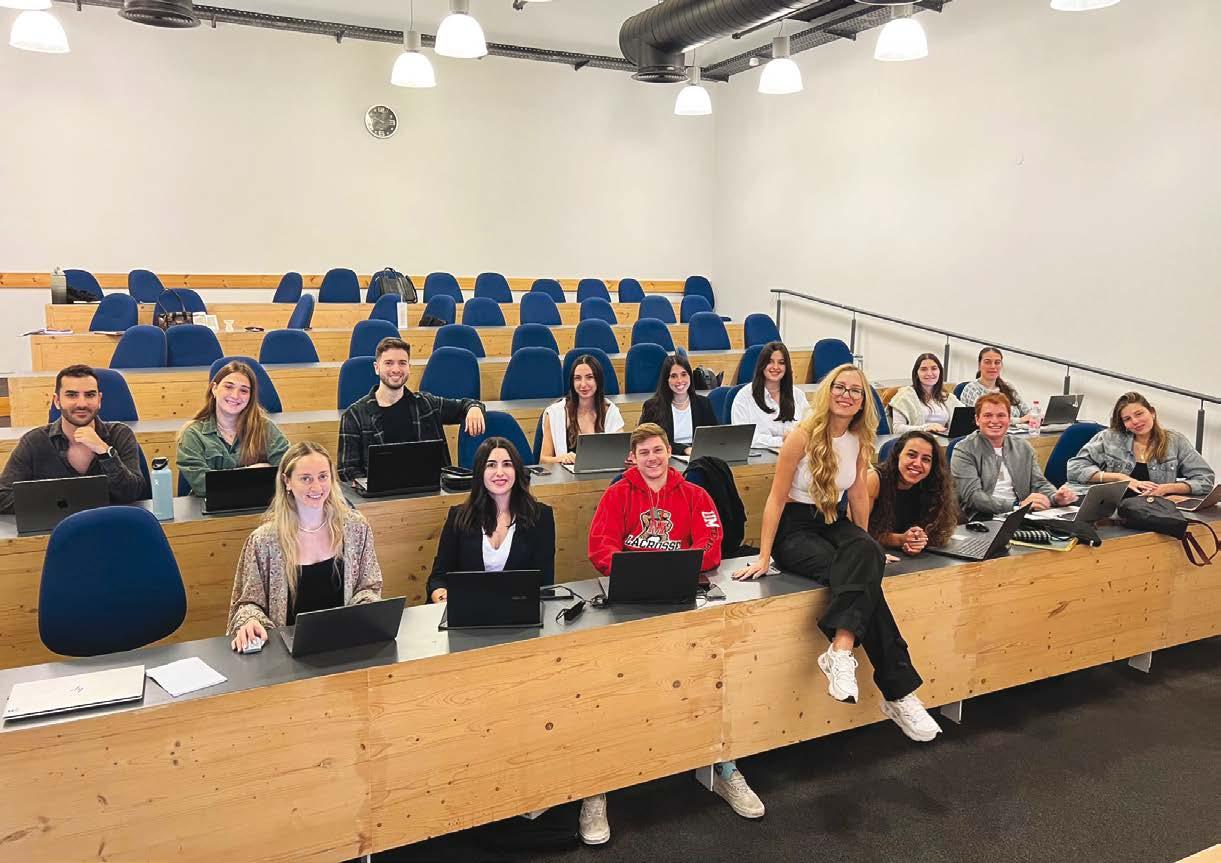
85
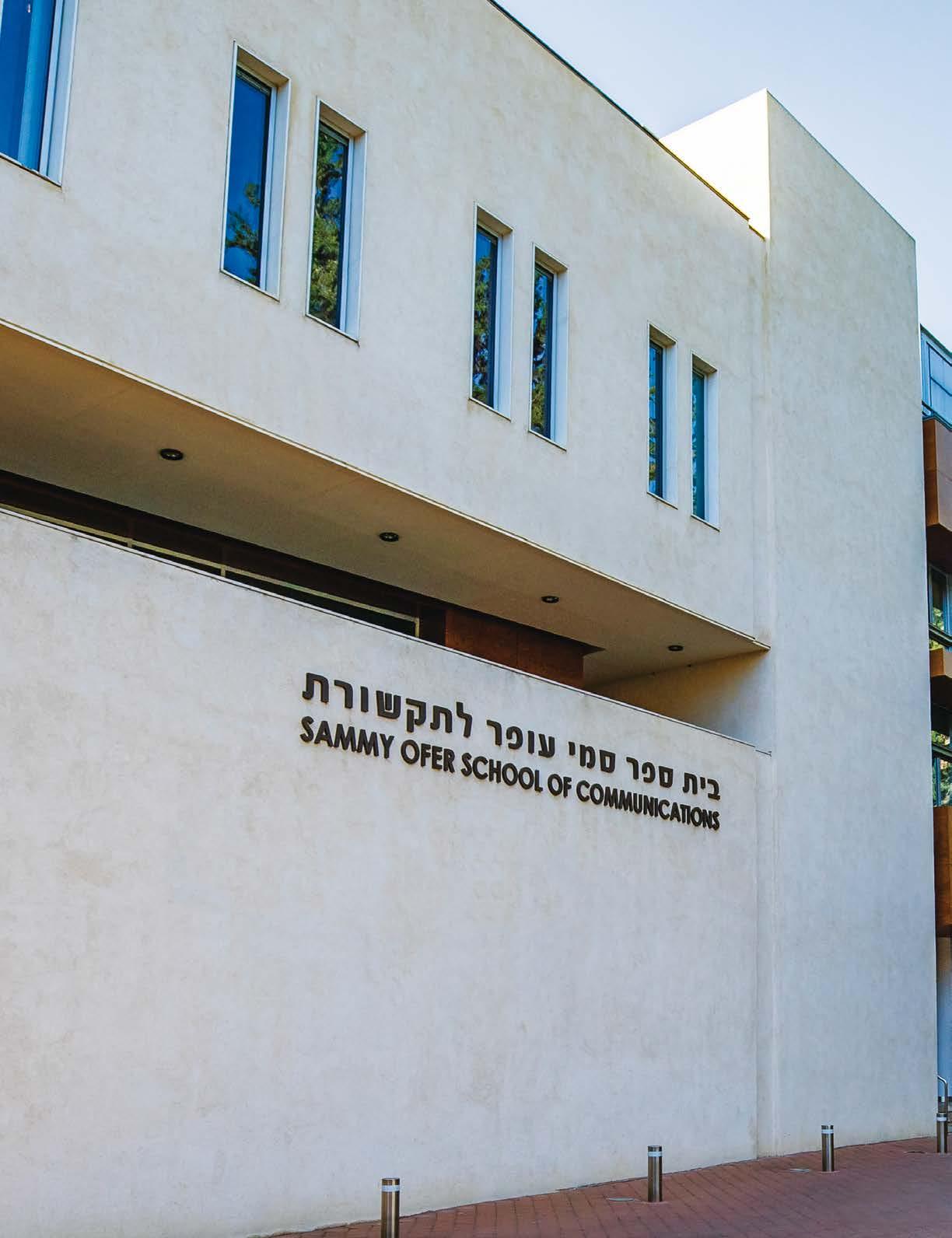
6SAMMY OFER SCHOOL OF COMMUNICATIONS
A training hub for content marketing, media and journalism.

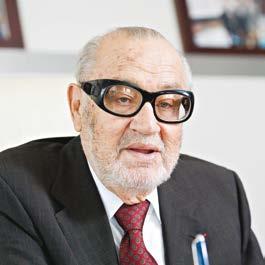 Dr. Amit Lavie-Dinur, Dean
Dr. Amit Lavie-Dinur, Dean
86 | Herzliyan 2024
Sammy Ofer z”l
/// SEVEN10STORIES
PRESERVING OCTOBER 7TH’S LEGACY AND CONFRONTING GLOBAL ANTISEMITISM
In the wake of the devastating October 7th terrorist attack, a new initiative, Seven10stories, has emerged with a crucial mission: to preserve the memories of that fateful day, counter misinformation, and tackle the growing tide of anti-Semitism among younger generations worldwide. This commendable project was conceived by Communication students - Maya Mor, Shaked Mizrachi, Gady Mizrachi, and Neta Meir – just a week following the attack.
Seven10stories recognized an urgent need for nonpoliticized, unbiased content amidst a sea of skewed narratives. At its core, the initiative is dedicated to providing first-hand testimonies from those who witnessed the events unfold. By doing so, it has effectively bridged the gap between eyewitnesses and a global audience. Its approach fosters a deeper, more nuanced understanding of the Israeli narrative, one that is rooted in personal, human stories rather than abstract political discourse.
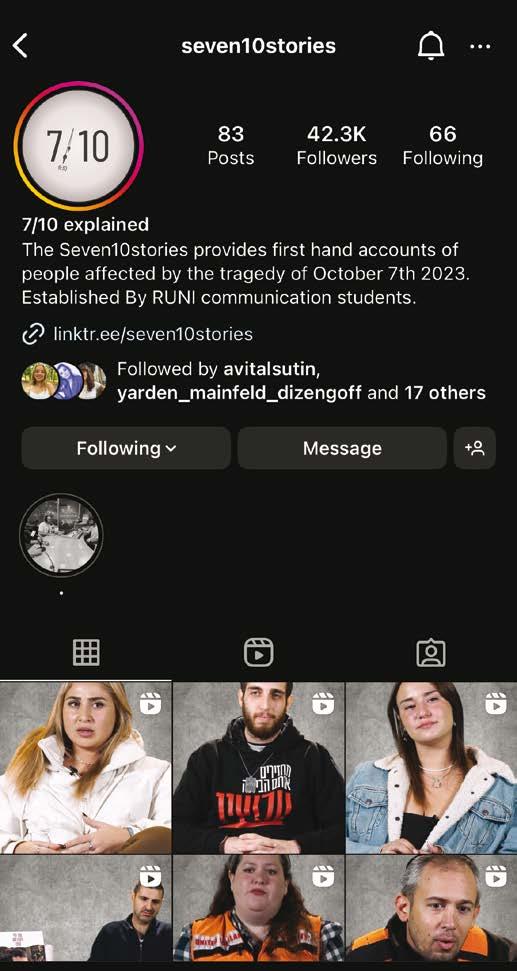
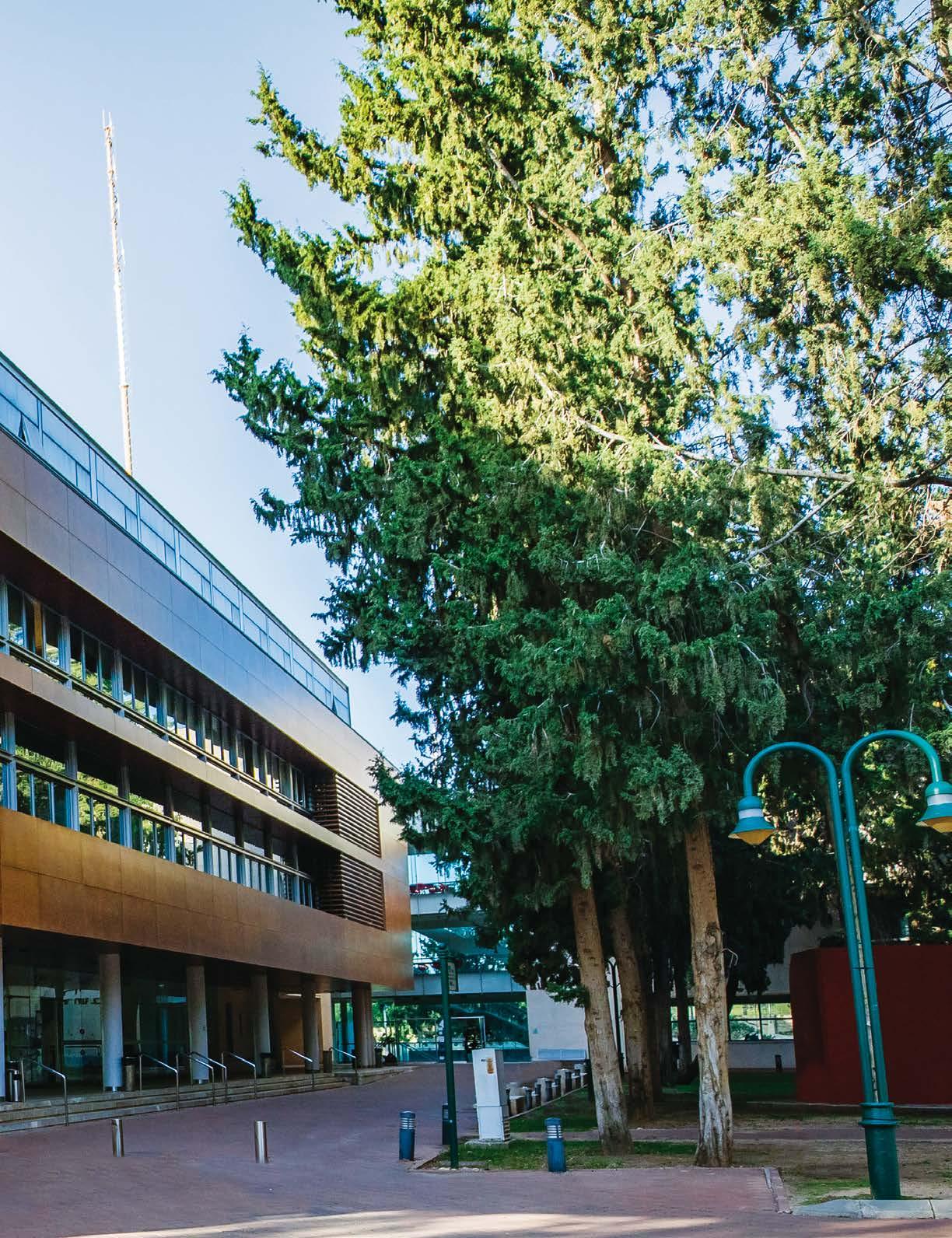
Every shot has meaning and must be captured just right

87
Students
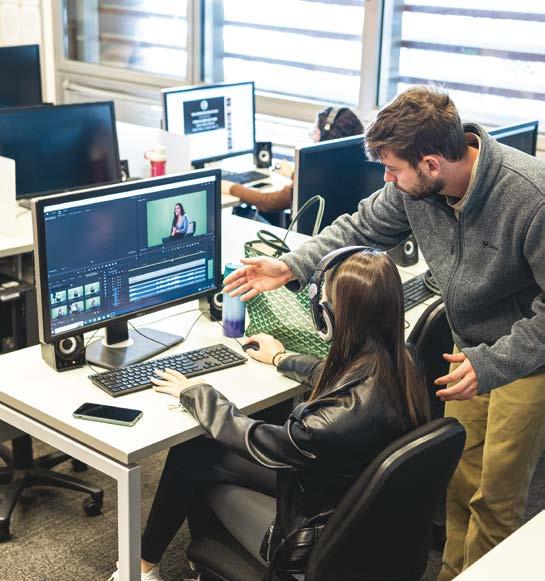
The impact of Seven10stories has been profound and far-reaching. Its content, resonating with millions across the globe, has not only garnered thousands of shares but has also played a pivotal role in shaping cultural discourse and societal attitudes. The parallel drawn between upholding the memory of the Holocaust and commemorating the October 7th tragedies is particularly striking. Both events, significant in their own right, have influenced society’s perception and global ethos considerably.
Seven10stories is more than just a digital platform; it’s a beacon of hope and resilience. With over 90 interviews conducted, the team remains steadfast in its commitment to providing a voice for survivors and welcoming narratives from all those affected. Their goal transcends mere storytelling; it’s about embedding these events into our collective memory, fighting against the forces of terrorism and anti-Semitism for both the present and future generations.
As we navigate a world rife with misinformation and polarized views, Seven10stories stands out as a vital force in preserving history’s truth, fostering understanding, and nurturing hope. It’s a testament to the power of collective memory and the enduring strength of the human spirit.
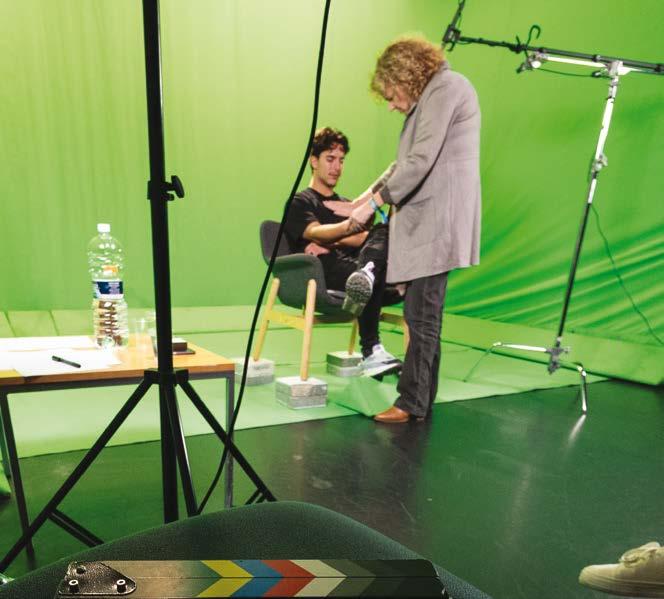
/// NOCAMELS IN TIMES OF WAR
THE STARTUP NATION IS SHOWING THE RESILIENCE OF THE ISRAELI PEOPLE
NoCamels is a leading news website covering Israeli innovation for international audiences across the world in the fields of technology, science, environment, culture, climate, and more.
NoCamels is part of the Asper Institute for New Media Diplomacy, and is sponsored by the Asper Foundation.
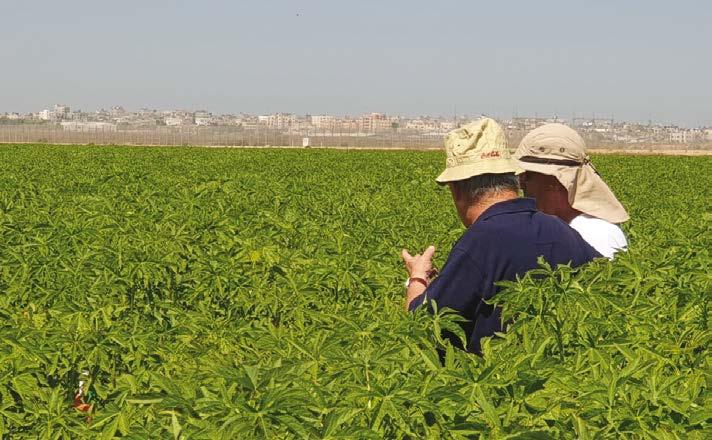 collaborate to find the best way to create their story
Production begins on Seven10stories
The Kenaf Ventures fields at Kfar Aza before the massacre of October 7th.
The Gaza Strip is visible in the background
collaborate to find the best way to create their story
Production begins on Seven10stories
The Kenaf Ventures fields at Kfar Aza before the massacre of October 7th.
The Gaza Strip is visible in the background
88 | Herzliyan 2024
A letter from Sara Miller, Editor in Chief of NoCamels
“We do not rejoice in victories. We rejoice when a new kind of cotton is grown and when strawberries bloom in Israel.” - Golda Meir
The world’s eyes are again trained on Israel as it copes with its most devastating terror attack ever, while many across the globe are seeking to demonize and condemn it.
Perused by industry leaders, investors, and creators worldwide, as well as supporters of Israel, NoCamels has kept the focus on the country’s famed and fated innovation.
In clear and accessible terms, and as ad hoc ambassadors for the startup nation, NoCamels has explored the concepts behind the ingenuity - deciphering technological jargon, scientific research, and even chemical processes, and how they translate into new marvels.
From the U.S. and Europe to Africa and Arabia, our readers can delve into the Israeli innovation that continues to transform the fields of artificial intelligence, agriculture, medicine, and more.
It goes without saying that the heinous attack on Simchat Torah was monumental for the people of Israel, for its economy, and for its future.
Still reeling from the shock, pain, and deep grief of that Black Saturday, the NoCamels team reported how Israeli innovators swiftly adapted and mobilized to benefit the country, its civilians, and its soldiers as Israel fought perhaps the most consequential war since its establishment 76 years ago.
And with the understanding that this is the startup nation in its purest form – invention and innovation for the betterment of society – we decided to focus on those companies, organizations, and institutions that threw themselves into the war effort, that reflect the best of us and inspire us to greatness ourselves.
From hospitals developing revolutionary treatments for wounded soldiers and tech experts exposing the full scale of the attack in an interactive map to the cleantech company from Kibbutz Kfar Aza that keeps trying to save the planet despite the horror at home to a startup that repurposes sports tech for Israeli soldiers in battle, NoCamels shows the world Israeli ingenuity in the face of the direst of challenges, ingenuity matched only by determination and resolve.
As the war goes on, we continue to focus on creativity driven by the conflict but have also returned to celebrating the everyday work of the sector. This includes the masterminds of lab-grown fish seeking to save our oceans, the data protection gurus battling malicious AI threats, combat drones that catch prey in mid-air and underground, and the developers of a smart platform that helps meet the medical needs of the elderly – keeping them healthy in their own homes for longer
With so many around the world determined to demonize Israel, falsely accusing it of the very opposite of the values for which it stands, NoCamels presents the true face of the country, every day producing in-depth features on the wonders its people bring, speaking to those leading the innovation and the ones who benefit from it.
And as we look ahead to the coming year, we are confident that the light of Israeli exceptionalism and creativity will continue to shine brightly, and we feel emboldened to keep telling the world all about it.
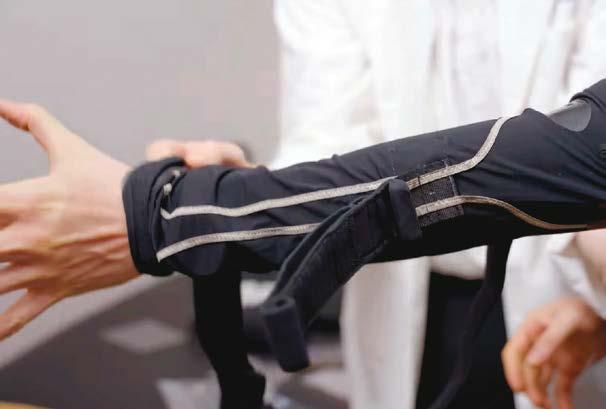
89
The ElectroGear, a vibrating sleeve that’s designed to relieve pain and accelerate healing among athletes, is now being repurposed for Israeli soldiers
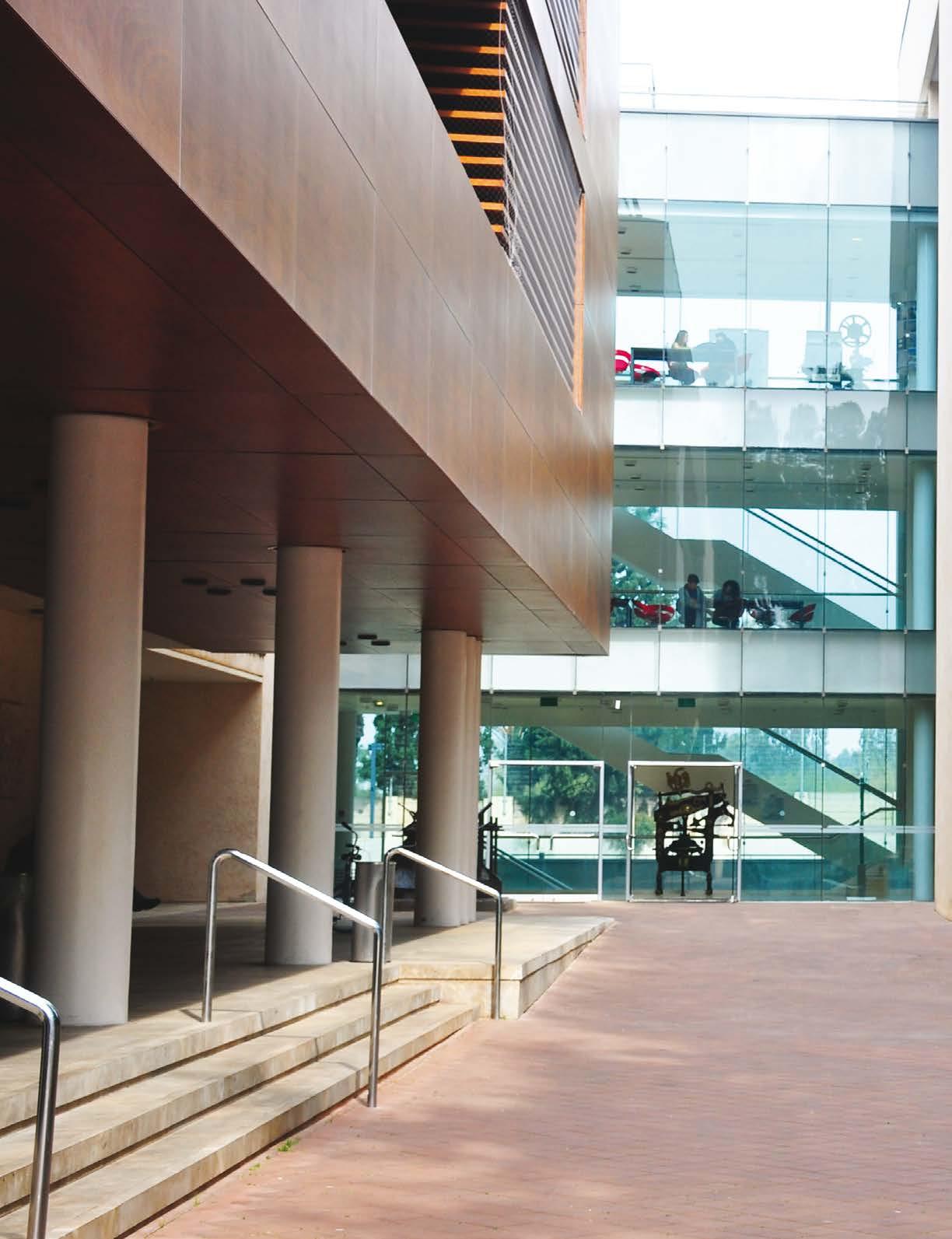
7EFI ARAZI SCHOOL OF COMPUTER SCIENCE
Combining deep theoretical studies with up-to-date knowledge.
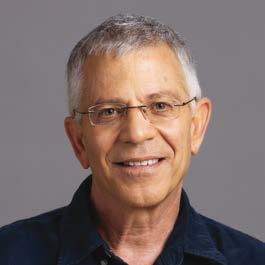
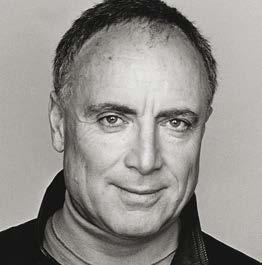 Prof. Yacov Hel-Or, Dean
Prof. Yacov Hel-Or, Dean
90 | Herzliyan 2024
Efi Arazi z”l
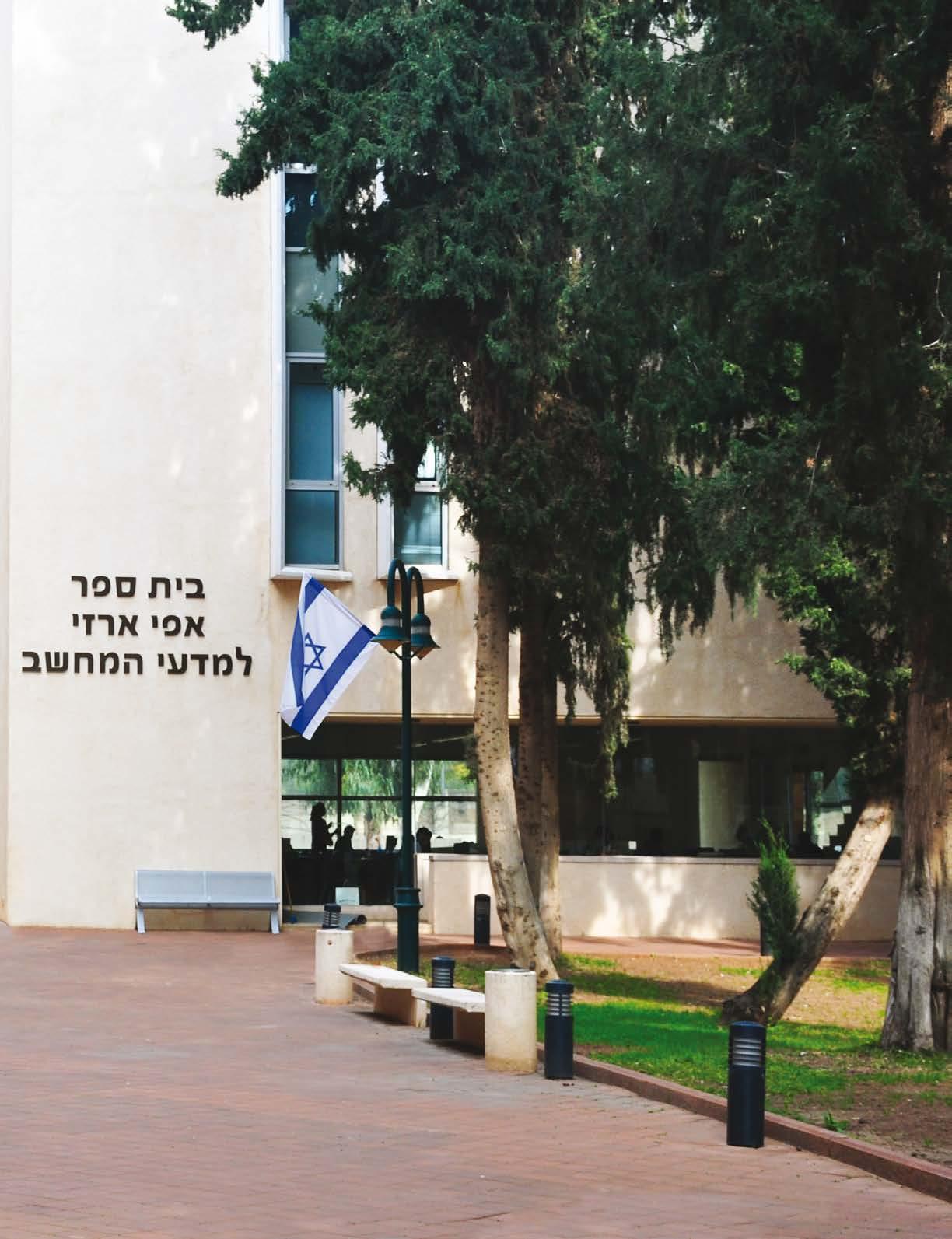
/// CSForceIL
A newly formed tech group consisting of volunteer Computer Science students from Reichman University. The group is focused on creating technological solutions to aid in the digital advocacy initiatives of the State of Israel.
This project was initiated by David Kalmanson, an Efi Arazi graduate and lecturer, and was part of the ACT.IL efforts at Reichman University, where students help in the online pro-Israel propaganda campaign.
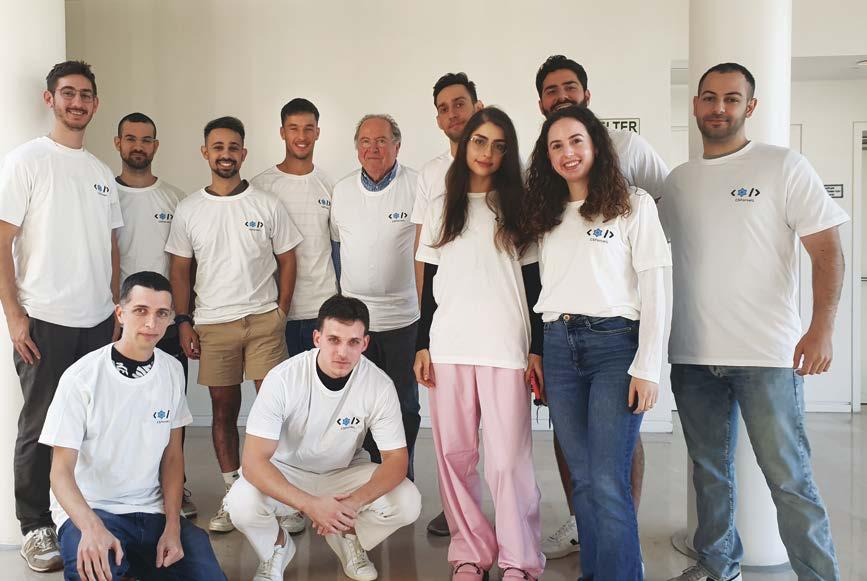
91
Back row, from left: Nimrod Dinte, Rani Bezalel, Itay Basson, Tomer Agai, Prof. Rafi Melnick, former President of Reichman University, Nir Sharon, Ran Zaroor Front row, from left: David Kalmanson, Yoval Moscovitz, Yaheli Neemani, Idan Yehiel, Niv Doron
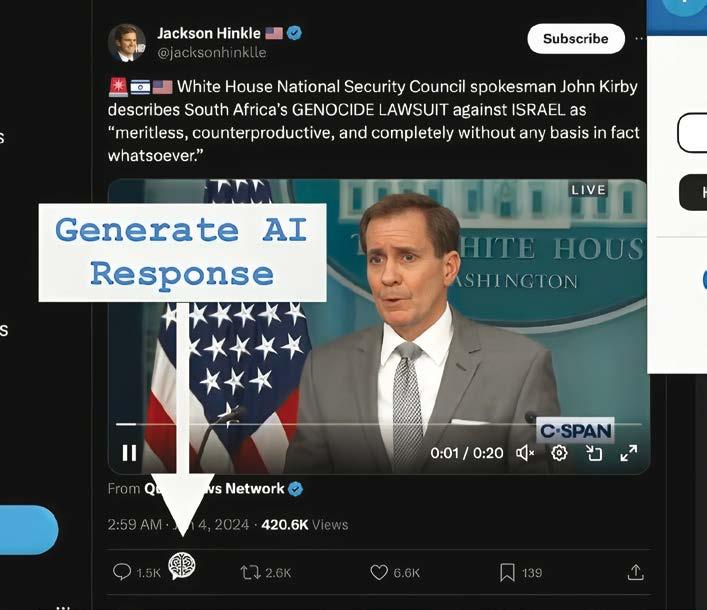
The team members are working on three different projects, all aimed to support the war efforts.

DialogueAI
The DialogueAI project represents a breakthrough in Israeli advocacy. It is a Chrome browser extension that integrates with popular social media platforms such as Twitter, LinkedIn, Facebook, and Instagram, offering activists a powerful tool to create supportive and inspiring responses that align with the Israeli narrative. Using artificial intelligence, DialogueAI ensures that responses are contextually relevant to the post.
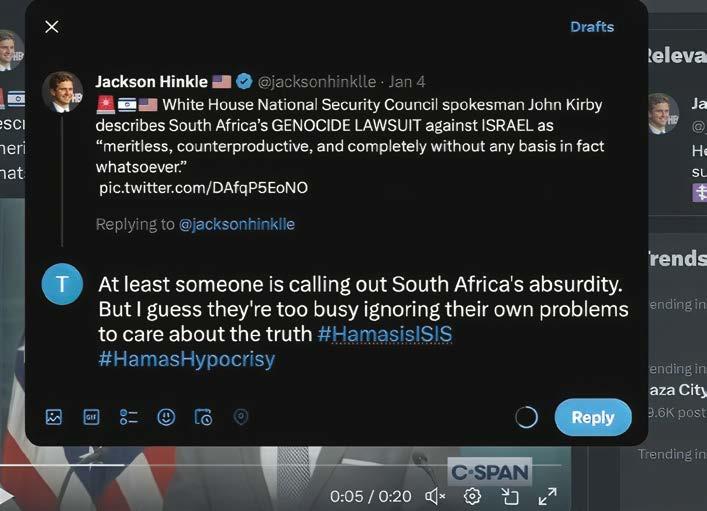
Using the extension is simple: it adds a special button alongside the regular response options on social networks, allowing users to easily create responses.
Already in use by activists, the project is changing the landscape of online activism. DialogueAI promises a reliable, efficient, and secure user experience, enabling users to focus on their activism work without technical concerns.
Screenshots of the DialogueAI tool that creates AI responses in social networks
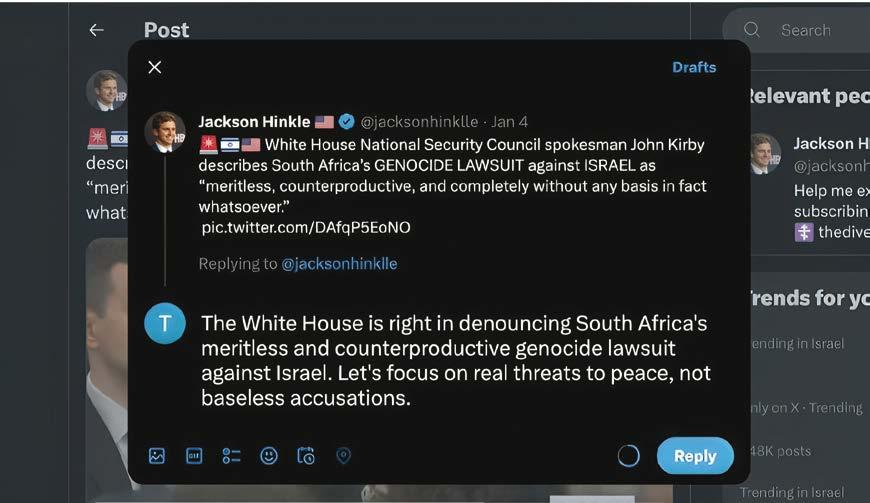
92 | Herzliyan 2024
EngageMate
A tool that allows its users to improve the productiveness of their engagement in social media –notably liking and reporting posts on various platforms, faster and on a bigger scale.
This aims to influence the exposure algorithms of social media platforms in order to increase the presence and publicity of pro-Israeli posts and do the opposite for anti-Israeli posts.
PoliTalk
PoliTalk is an extension for Chrome whose sole purpose is to allow different audiences to engage in a conversation about the Israeli-Palestinian Conflict with regard to the 7.10 War. Currently, the extension targets Israeli students who want to engage in a conversation with students from leading universities in the U.S.
The extension automatically adds a button to the LinkedIn website. Clicking the button shows the user students from the U.S. to create a quick conversation and connect with them.
In the future, it will be possible to contact people from other categories, such as donors, pro-Palestinian students, and any audience that the Advocacy Headquarters would like to target.
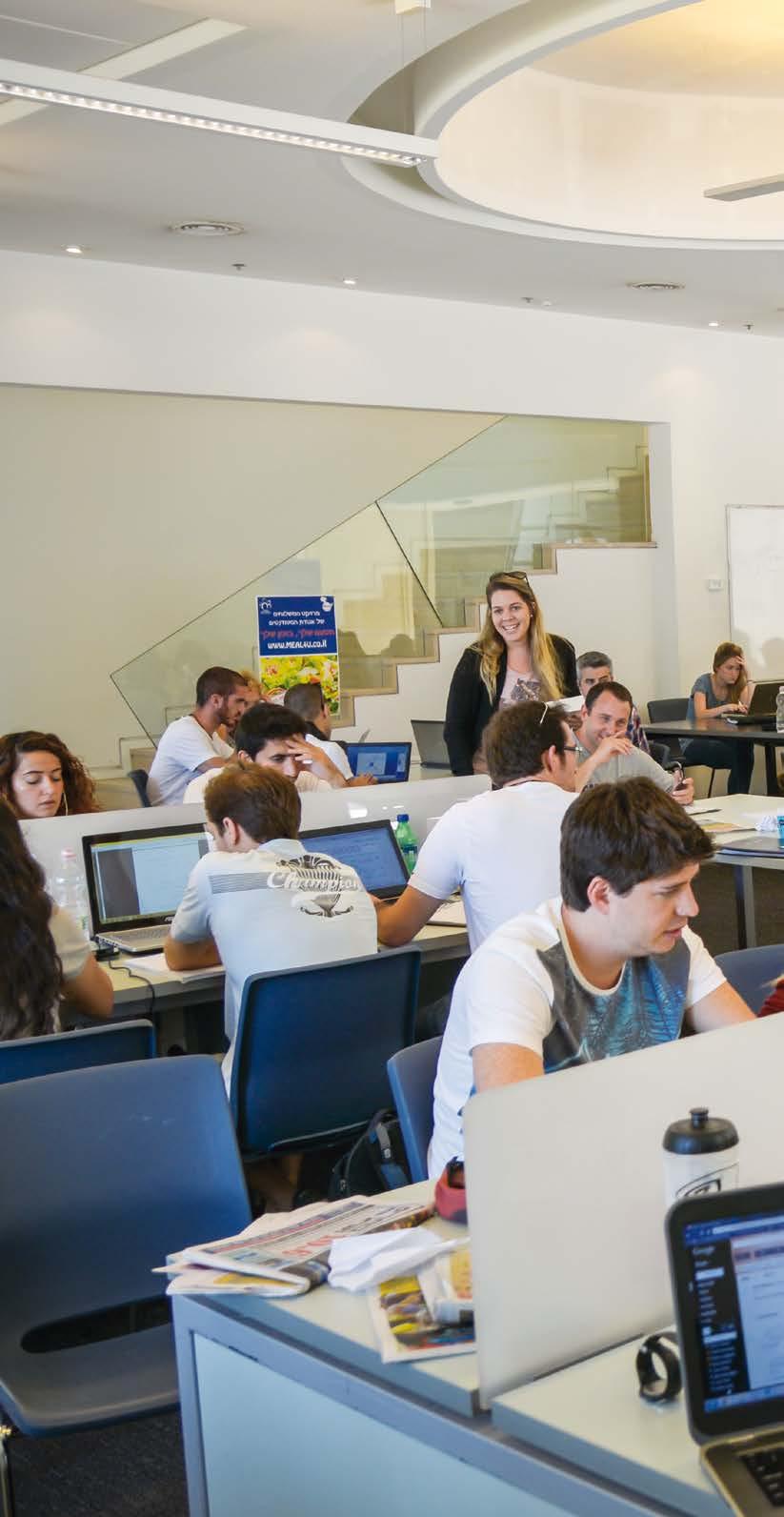
93
SCHOOL OF SUSTAINABILITY
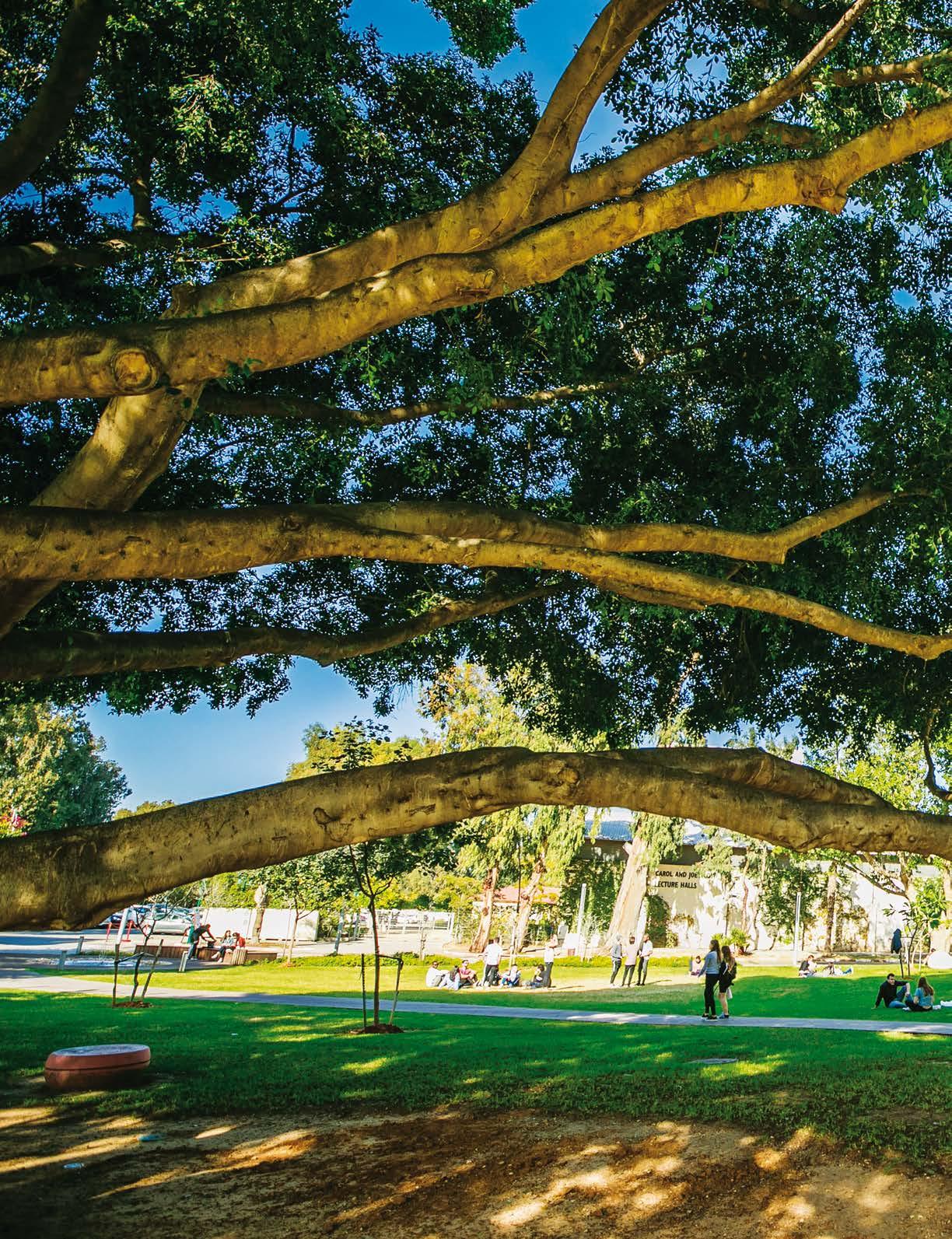
Preparing students to tackle global climate and sustainability challenges.
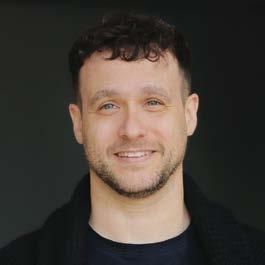
8 94 | Herzliyan 2024
Dr. Asaf Tzachor, Acting Dean
/// ADDRESSING GLOBAL ENVIRONMENTAL PROBLEMS WITH NEW VENTURES
THE AVIRAM SUSTAINABILITY AND CLIMATE PROGRAM
The Aviram Program is a new, annual, and exclusive program established in partnership with the Aviram Foundation. It’s intended for a handful of outstanding students from the entire campus with the ambition and ability to find solutions to the global environmental crisis.
Throughout the year, participants address international environmental problems, including the climate crisis, food, water and energy crises, shortages of essential raw materials, biodiversity loss, and plastic pollution, as part of the program.
Students get to learn from the best lecturers in Israel and around the world, and acquire analytical and practical tools in the fields of environmental science, business and environmental problem analysis, strategy and entrepreneurship, environmental technologies and climatech, creative artificial intelligence, new business models, consumer behavior, and critical thinking.
As part of the program, participants have the opportunity to embark on a study tour of Europe to meet ventures and institutions at the forefront of climate and environmental technologies, food, water and energy, infrastructure, transportation and more. They also participate in a practical project accompanied by senior academics and industry officials.
Graduates of the program acquire an interdisciplinary perspective, practical skills, and experiences and join a network of fellows that enables them to lead change in all sectors in Israel and around the world.
The first cohort of the program includes 14 students from around the campus and faculties.
Dr. Asaf Tzachor, Academic Director of the program states, “We are waiting for the reservists to return to us safely and healthily, and we are excited to open the Aviram Program. The program is great news for the field of sustainability, climate, and the environment in Israel, and we are here to change and repair the world.”
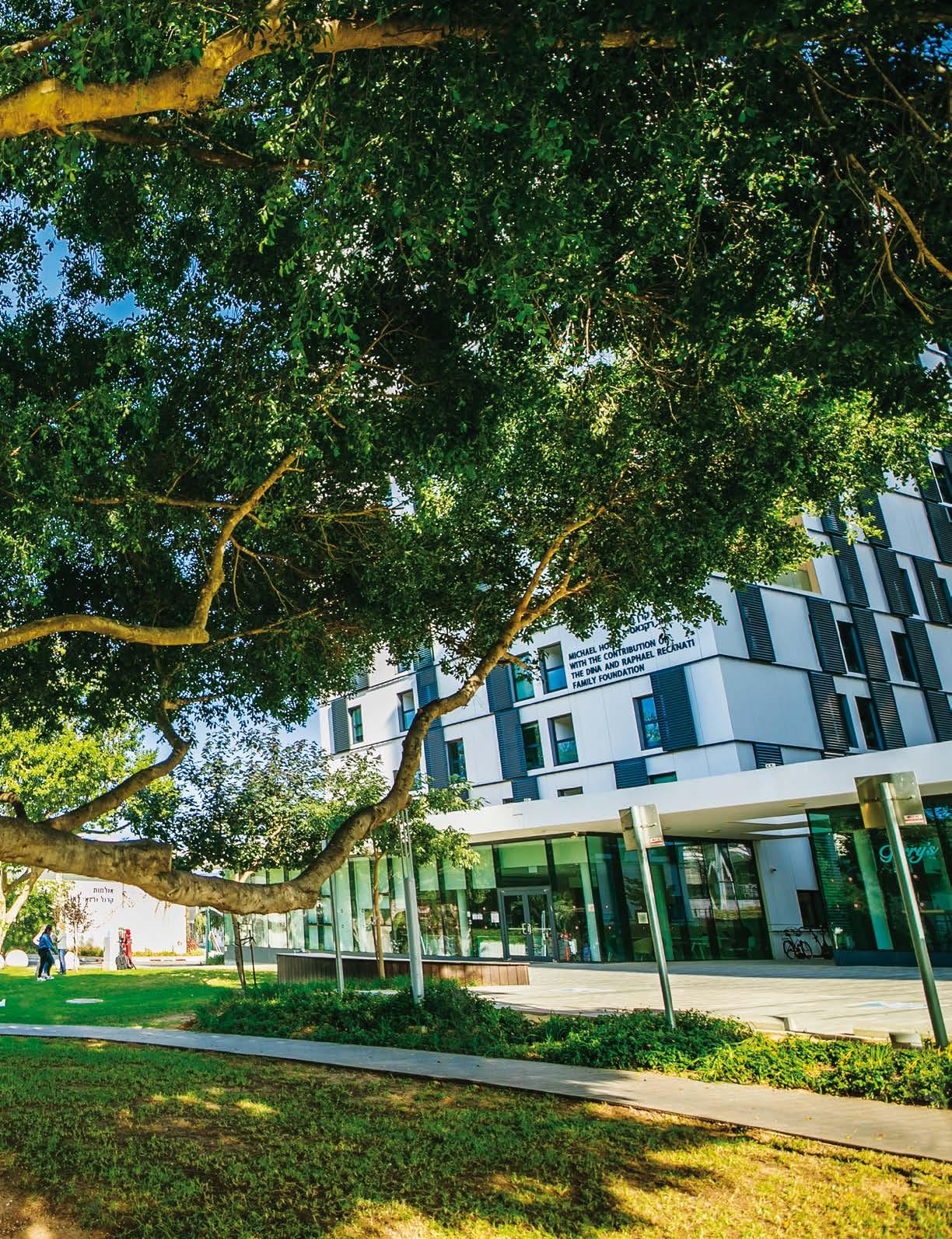
Dr. Asaf Tzachor, with the first cohort of the Aviram Program
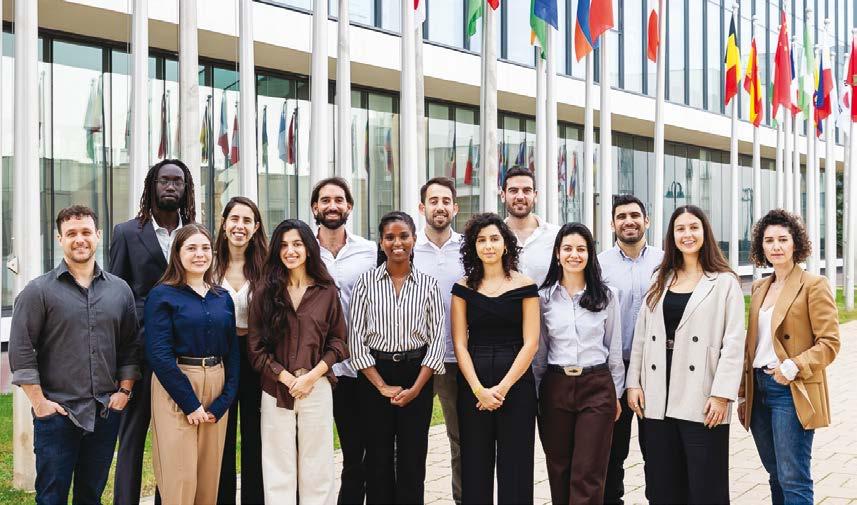
95
HAPAK NEW YORK: A BEACON OF HOPE AND ACTION IN TIMES OF CRISIS
On October 7th, as a national crisis unfolded in Israel, a significant challenge arose: thousands of Israeli reservists abroad urgently needed to return home. Amidst global travel disruptions, this situation required a swift and effective response. It was then that Hapak New York was established.
Shira Lapid , a third-year Government and Sustainability student, was set to return to Israel from New York that day, but her flight was canceled. Anticipating a call-up to reserve duty, she urgently sought a way back. Noa Kohai, a friend working at the UN, highlighted the importance of assisting all those affected. Inspired by this, the two founded Hapak New York, an operational team that quickly secured donations, private planes, and over 450 volunteers. Their efforts led to the successful return of over 3,500 reservists to Israel in collaboration with consulates, embassies, and the Ministry of Defense.
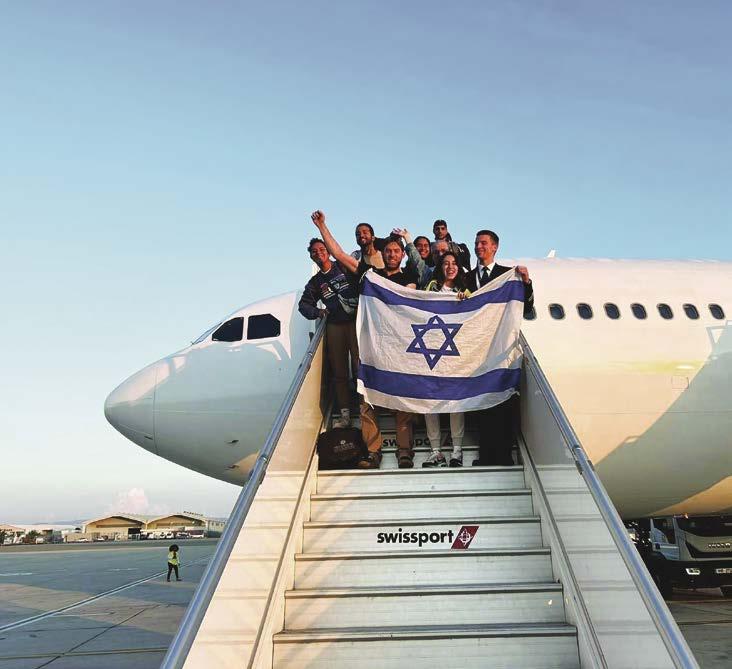
However, their work didn’t end with transportation. They expanded into logistics, supporting soldiers and kibbutzim, and became a central coordination hub for this massive undertaking. The initiative operated like a startup, rapidly mobilizing and adapting to the fast-evolving situation. Initially, they worked discreetly due to security concerns, a testament to the team’s ability to manage complex and sensitive operations.
In its initial days, Hapak New York functioned with the dynamism of a startup blended with the precision of a military command center. It wasn’t just an operational hub; it became a place of unity and togetherness. The mobilization of the Israeli and Jewish communities in New York and across the United States was nothing short of remarkable. Volunteers came in droves, handling calls, leading teams, and handling airport operations. Israeli restaurants in the city generously donated food, enabling teams to work tirelessly throughout the day. Government offices expedited clearances for Noa and Shira, facilitating their collaboration with consulates and official bodies.
Their involvement required extensive interaction with state officials and various organizations, calling for diplomacy and strategic thinking. Hapak New York not only bridged a critical gap in emergency response but also set the stage for a sustainable future. It evolved into a non-profit organization poised to support Israel’s needs in any forthcoming crisis.
This journey was a profound learning experience, teaching the two about the power of swift action and effective collaboration. Their diverse team, including professionals and CEOs, brought unique skills and perspectives, greatly contributing to the operation’s success. This experience underscored the importance of community strength and adaptability in crisis situations.
///
96 | Herzliyan 2024
Hapak New York’s story is not just one of rapid response, innovation, and community solidarity but also a tale of two young students, Noa Kohai and Shira Lapid, who led an extraordinary effort to support and assist the State of Israel. Their journey from a spontaneous idea to a significant operational success reflects the power of youthful vision and determination. This initiative’s evolution into a non-profit organization mirrors its unwavering commitment to long-term support and preparedness, ensuring they are always ready to meet Israel’s future challenges.
Looking back at the diverse stages of Hapak New York’s journey, from its inception to evolving into a non-profit, anyone can see the vast scope of its impact. The combined efforts of donors, volunteers, and organizations were crucial in shaping its success. As the two move forward, their commitment remains strong: to stand as a beacon of hope and support for Israel, always ready to respond with agility and resilience to any future crisis.
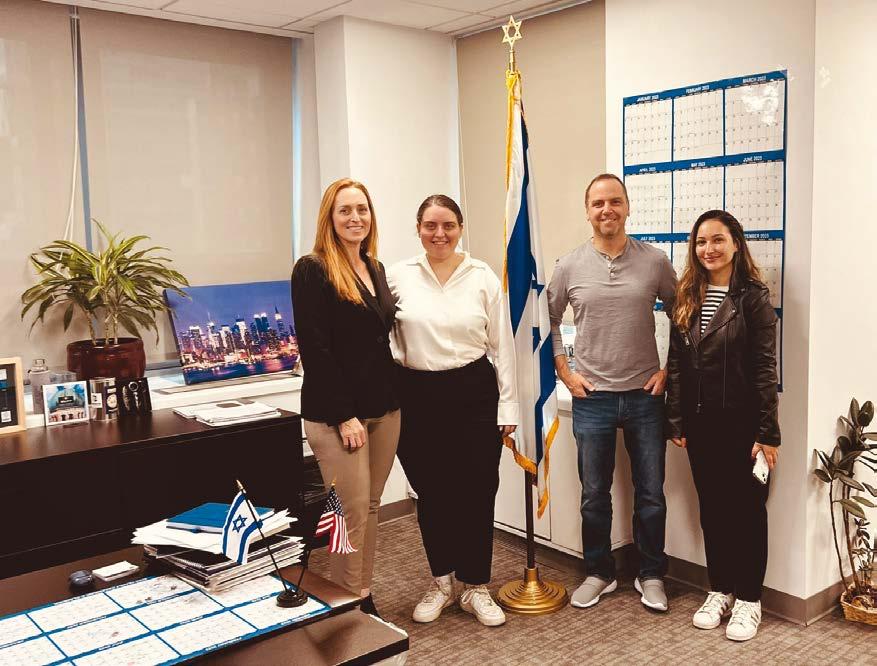
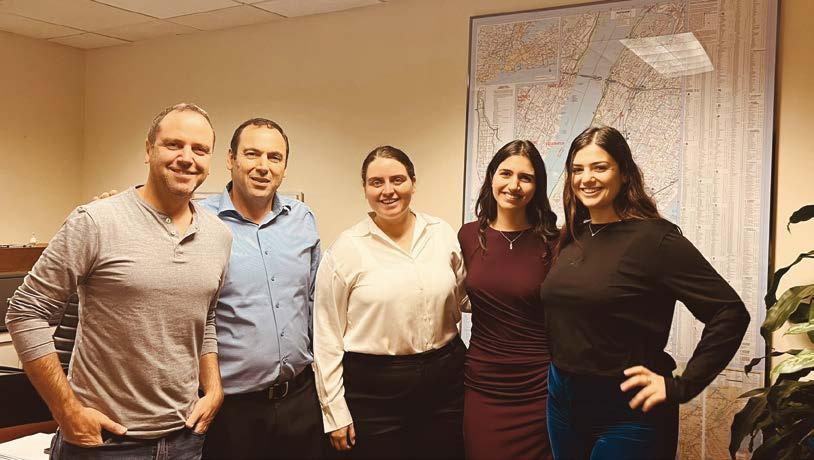 From left: Anat Katz, Economic Attaché at the Consulate of New York, Shira Lapid, Founder and Leader of the Civilian Control Center in New York, Guy Franklin, Volunteer Coordinator at the Civilian Control Center, and Liraz Hayon, Assistant to Anat Katz
From left: Anat Katz, Economic Attaché at the Consulate of New York, Shira Lapid, Founder and Leader of the Civilian Control Center in New York, Guy Franklin, Volunteer Coordinator at the Civilian Control Center, and Liraz Hayon, Assistant to Anat Katz
97
From left: Guy Franklin, Volunteer Coordinator at the Civilian Control Center, Avner Saban, Israeli Consul in New York, Shira Lapid, Founder and Leader of the Civilian Control Center in New York, Noa Kohai, Founder and Leader of the Civilian Control Center in New York, Shiri Gil, Asia Continent Manager at the Civilian Control Center
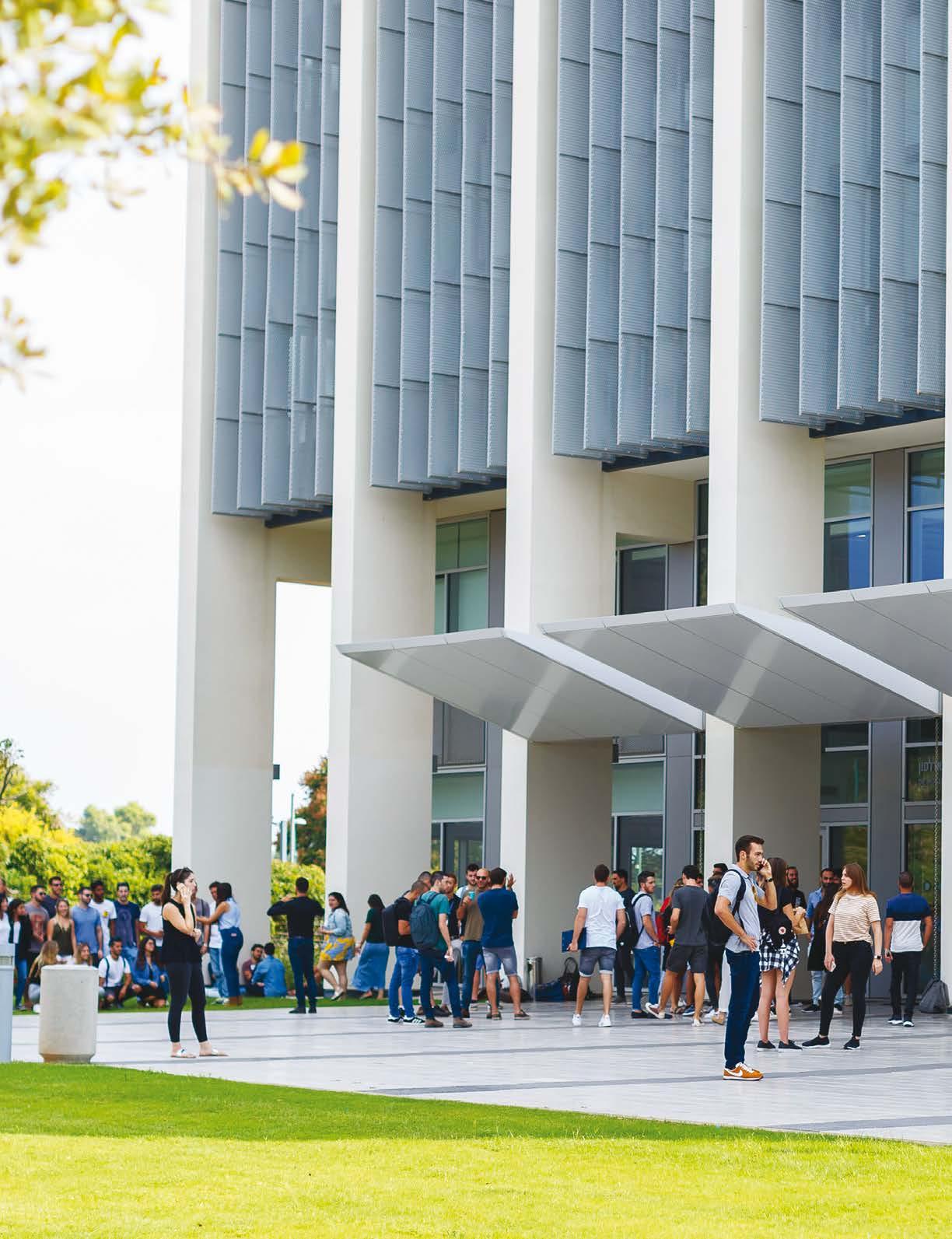
9ADELSON SCHOOL OF ENTREPRENEURSHIP Building a new generation of entrepreneurs.
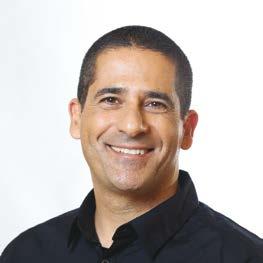
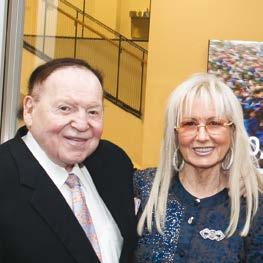 Dr. Yossi Maaravi, Dean
Sheldon G. Adelson z”l and Dr. Miriam Adelson
Dr. Yossi Maaravi, Dean
Sheldon G. Adelson z”l and Dr. Miriam Adelson
98 | Herzliyan 2024
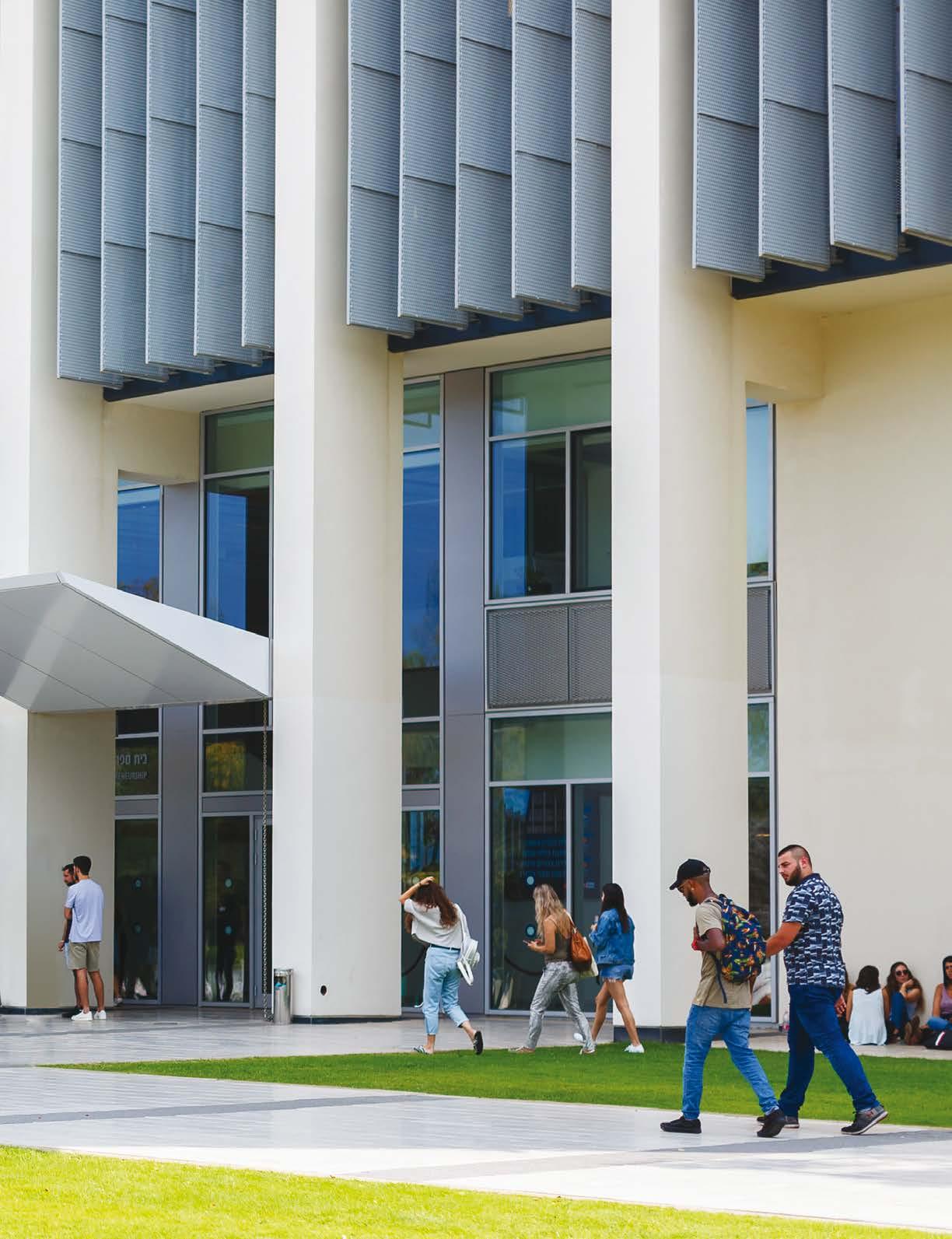
Over 20% of the Adelson School’s students have been drafted into the army since the beginning of the “Swords of Iron” war, with many serving in special units. The School of Entrepreneurship implemented a series of centralized courses aimed at assisting students who have served in the reserves. These courses were available to students who returned from reserve duty after and during the fall semester and offered additional support to help them complete their studies. The concentrated courses covered various study years and tracks, providing essential academic credit for reserve service. Additionally, makeup meetings with the Dean, Dr. Yossi Maaravi, were organized for first-year students who missed orientation week due to reserve duty. Our devoted staff personally engaged with every student who served in reserves, meeting them to finalize a to-do list for all missed courses. This included reaching out to lecturers and arranging personal lessons if necessary to ensure their academic progress.
The School of Entrepreneurship extends its heartfelt gratitude to each of the reservists for their service. They fervently hope for the swift resolution of the conflict and the safe return of all servicemembers to their homes and loved ones.
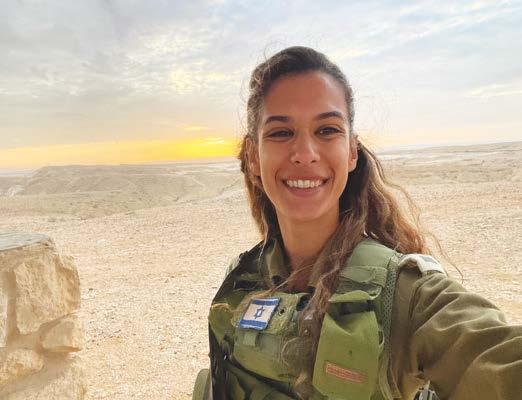
Here is what some of their students had to say:
“I am a first-year student in the Business and Entrepreneurship track at Reichman University. My name is Shani Aharon. I’m 26 years old from Israel. I served as a combat officer in the Paran Brigade for five years in the IDF, including as the brigade’s operations officer.
Coming back to university after serving for five months since October 7th was very challenging for me. I had difficulty adjusting to the situation and shifting my mind and concentration from being a combat officer to being a student. However, I was able to overcome these challenges with great help from my friends at Reichman University, who helped me understand the material and how to handle it in my major as a first-year student.
The Adelson School immensely helped me as well. Dr. Gali Einav met with me personally to go through all my course duties and understand specifically how to handle the challenge of completing the materials. The administrative staff also checked in with me to ensure I understood what was expected of me and were very flexible in helping me adapt as comfortably as possible without being overwhelmed. I participated in crash courses and received one-on-one lectures (thank you so much, Jeffrey and Hever!).
Overall, I am satisfied and very grateful to be a student at Reichman University, especially in my major. I want to express my deepest appreciation to all the faculty members who are incredibly supportive and dedicated to helping us reservists who have left everything behind to fight ever since October 7th so we can get back into our lives and continue our studies.”
99
Shani Aharon
/// RUNI VENTURES WONDER-FOUNDERS
In light of the global success of its alumni in building over 600 tech companies and 22 unicorns, Reichman University proudly launched “RUNI Ventures”, its VC fund, in January 2023.
The fund is an early-stage VC on a mission to back and support the next generation of remarkable tech companies by providing founders with unmatched resources to accelerate and scale, including capital, talents, experts, business services, office space, and more.
Runi Ventures is backed by top-tier investors and industry leaders who share the University’s passion for building global technology companies and empowering the Israeli high-tech sector worldwide.
Many members of the RUNI Ventures team and portfolio founders served in IDF elite units and were drafted immediately after the October 7th attacks. Its wonder-founders are exemplifying unwavering determination to ensure business continuity while defending their country. Their teams have adapted quickly and demonstrated incredible agility – and the University couldn’t be prouder of their leadership and courage.
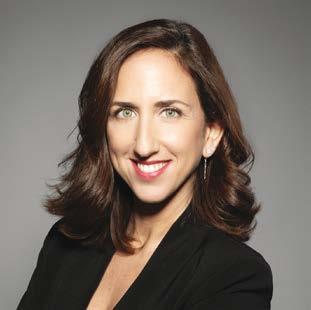
Adv. Hila Rom, RUNI Ventures Managing Partner says, “Despite the current challenges, nothing will break the enduring spirit that has shaped our country’s technology industry and made Israel a global powerhouse of innovation. For us, “resilience” is not wishful thinking – it’s a work plan.”
RUNI Ventures will continue to invest in exceptional startups in 2024 and there is no doubt that the attack on Israel will fuel the country’s young entrepreneurs to keep innovating, thriving, and DELIVERING.
No matter what.
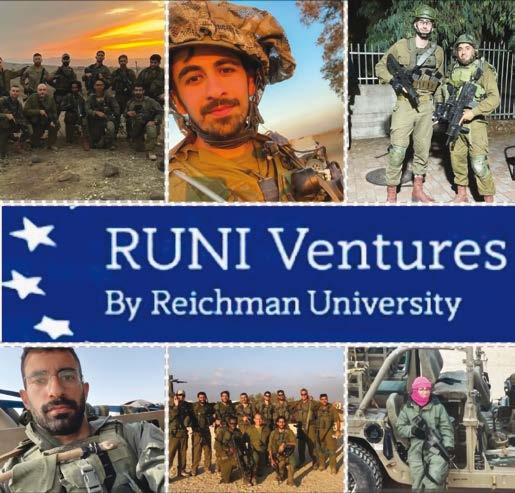
RUNI
Reichman University
Hila Rom
100 | Herzliyan 2024
Ventures By
We deliver NO MATTER WHAT The resilience of the Israeli tech ecosystem

101
GLOBAL ENGAGEMENT AT REICHMAN UNIVERSITY
/// NEW AGREEMENTS AND MEMORANDA OF UNDERSTANDING IN TIMES OF WAR
Reichman University recently signed new agreements with:
• Abat Oliba CEU University, Barcelona, Spain
• Catholic University of Valencia, Spain
• CEU San Pablo University, Madrid, Spain
• Frankfurt University of Applied Sciences, Germany
• Technical University Munich, Germany
• UCAM Catholic University of Murcia, Spain
• University of Deusto, Bilbao, Spain
• University of Erfurt, Germany
• Universidad de los Andes, Chile


 Madrid, Spain
Photo: Sebastian Dubiel
Valencia, Spain
Photo: Martin de Lusenet
Munich, Germany
Madrid, Spain
Photo: Sebastian Dubiel
Valencia, Spain
Photo: Martin de Lusenet
Munich, Germany
102 | Herzliyan 2024
Photo: Stefano Vigorelli
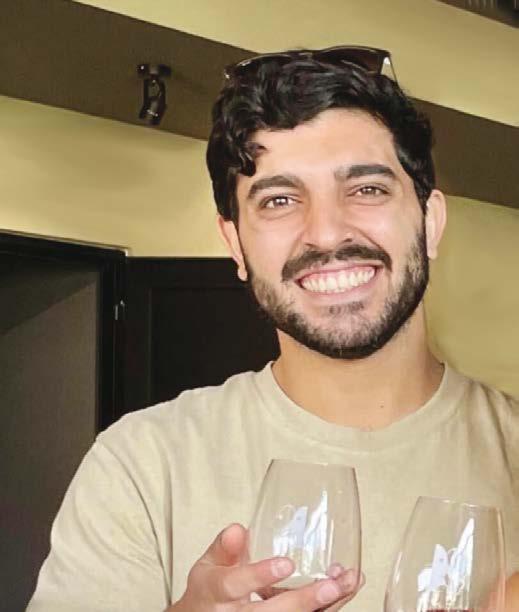
/// VIGIL FOR OMRI RAM, Z’’L, AT SCIENCES PO PARIS
Omri Ram, z”l, slated to complete his studies in Business Administration and Economics at Reichman University, was murdered at the Nova music festival on October 7th, 2023.
Having spent a semester as an exchange student, the Sciences Po Paris community, led by its president, Prof. Mathias Vicherat, held a vigil in his memory. The following eulogy was read in Omri’s memory:
“A charming young man whose most striking feature was that he loved everyone, and everyone loved him back. He spread light, love, and joy.” This was Omri Ram, as described by his father Menashe.
With heavy hearts and a profound sense of loss, we thank you for honoring his memory today and for allowing us to share some thoughts.
On October 7th, on Simchat Torah, dozens of Hamas terrorists blew their way into Israel and opened fire on young Israelis who had come together at an open-air music festival. Omri, like hundreds of others, lost their lives at that moment. He was 28.
Like any young person, Omri had his dreams, aspirations, and ambitions. Those who knew him described him as a talented, intelligent, and curious young man. This curiosity led him to travel the world following his army service in an elite unit. It is this same curiosity that pushed Omri to undergo an academic degree, which involved a semester at Sciences Po Paris. Omri was self-motivated and a creative thinker, and we should remember him for the remarkable person that he was.
It is extremely difficult to find the right words in the face of such a senseless act of brutality. In times like these, all we have left is to rebuild in the name of those who are no longer with us. To remember and celebrate Omri. To honor his life through positive change. To come together against hatred and division. To strive for a more compassionate and peaceful world.
Rest in peace, Omri. Your memory will be a testament to the potential of every young life.”
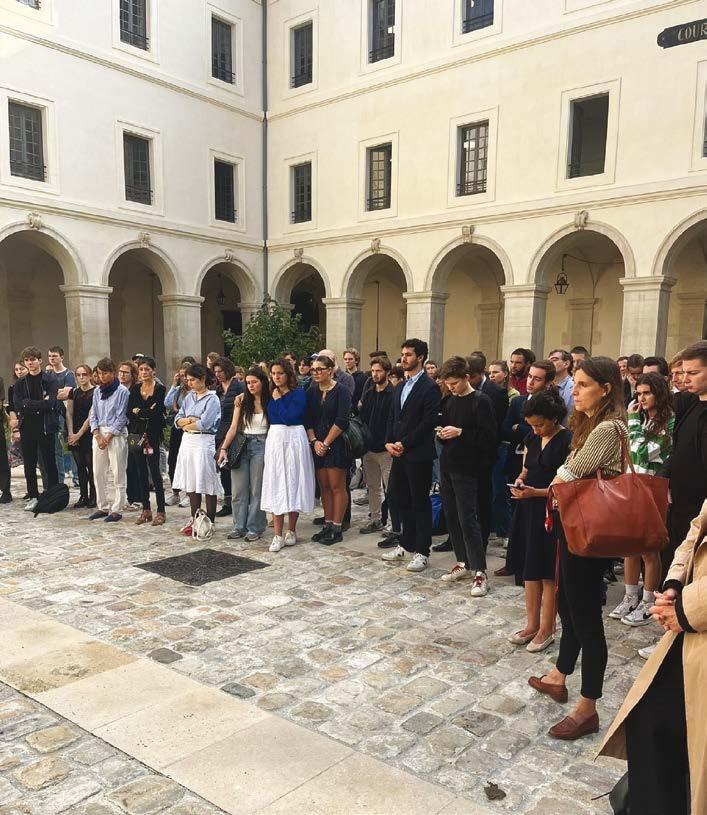
On behalf of the entire Reichman University community
Students of Sciences Po Paris gather on October 13th in the Saint-Thomas cloister
Photo: Kévin Cohen
103
Omri Ram, z”l
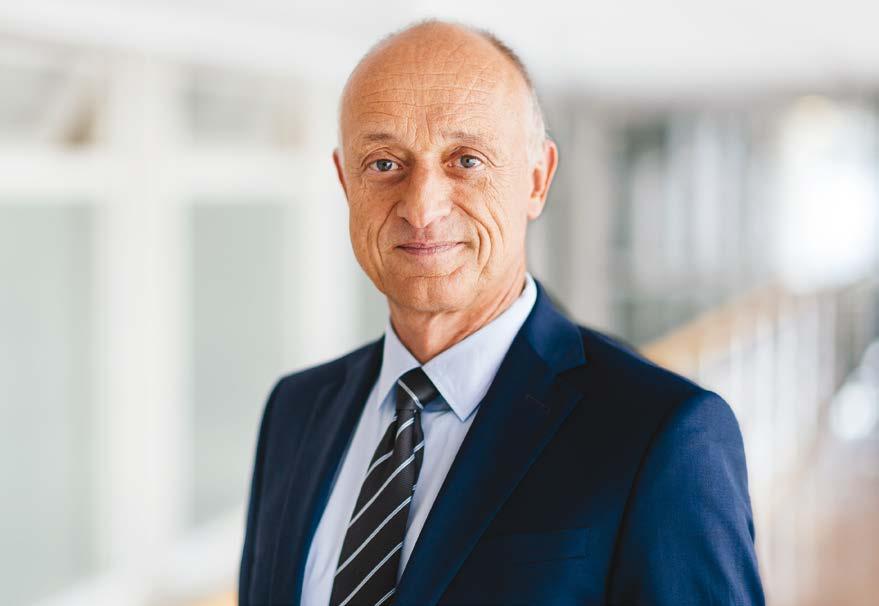
/// INTERVIEW WITH THE PRESIDENT OF REUTLINGEN UNIVERSITY, PROF. DR. HENDRIK BRUMME REFLECTS ON THE WAR
Recently, the university team had the privilege of interviewing President Prof. Dr. Hendrik Brumme, who shared his thoughts on navigating challenges on university campuses during times of conflict and how academia can affect positive change by addressing challenges, particularly in the Middle East.
Question: Reichman University and Reutlingen University have been academic partners since 2017. Can you elaborate on the impact of this partnership on your university?
Answer: The cooperation with Israel and especially with Reichman University, is of particular importance to Reutlingen University. Israel is a global hot spot for digitalization and entrepreneurship. Both topics are also being pursued intensively at Reutlingen University.
Regular exchange between students from Germany and Israel is, therefore, a mandatory basis for cooperation. Accordingly, a very good cooperation has developed between Reichman University and Reutlingen University in recent years.
This cooperation is to be continued in the coming years. An Erasmus+ KA 171 call is currently being submitted for a further three years. Due to the small size of the domestic market in Israel, universities in Israel benefit from an exchange with Germany. In return, the innovation dynamics in Israel are relevant for German universities. On this basis, in addition to student exchange, the joint implementation of research activities will be further promoted. This also affects the exchange between professors at universities in both countries. Furthermore, the partnership pursues an intercultural approach and is intended to contribute to international understanding. Students from both universities are important multipliers in their respective home countries.
Q: Since October 7th, we have seen a rise of defamation campaigns and incitement against Israel, particularly in American academia. How do you think universities should navigate this challenge?
A: Universities should be places of peaceful coexistence. Exchange and discussion of different points of view are welcome, but these should always be constructive and respectful. We must always both communicate this maxim and attitude to our students, as well as set a good example.
Prof. Dr. Hendrik Brumme, President of Reutlingen University, Germany
104 | Herzliyan 2024
Photo: Hellwig
Q: Can you share any initiatives Reutlingen University has implemented to support students or faculty affected by the conflict between Israel and Hamas?
A: We communicated our view of peaceful and constructive coexistence right away at the start of the conflict. We at Reutlingen University stand for peace, democracy, and humanity and condemn all forms of hatred, violence, and hostility. We therefore encourage all members of the university to actively promote respectful and tolerant coexistence. As an international university, we study, learn, and conduct research together peacefully, which is the only way an internationally oriented university can operate successfully.
Q: What strategies can universities employ to educate and empower students to be agents of positive change in conflict-ridden environments?
A: We should provide our students with comprehensive information and encourage them to form a fact-based and reflective opinion. I am of the firm belief that inflammatory slogans and hate speech have no place at universities.
Q: How can universities leverage technology and innovation to address challenges, particularly in the Middle East?
A: Unfortunately, conflicts are often based on a lack of education and poverty. Both can be counteracted by future-oriented technologies and innovations. The innovations of young Israeli startups in particular, receive a great deal of recognition and even admiration in Europe, and especially in Germany. In my opinion, this is a perfect basis for positive and future-oriented cooperation.
Q: Can universities contribute to the generation of knowledge that is relevant to understanding and mitigating conflicts?
A: Definitely. As already emphasized, universities should promote a constructive and fact-based exchange and demand peaceful coexistence. On this basis, the future can be shaped together.
Q: What advice would you give to a young student in Germany who seeks to learn about the IsraeliPalestinian conflict?
A: Look at the facts of the present and the past and make sure that the statements are valid. Don’t be led by tendentious and sensationalist reports. And draw a clear line between the rule of law and terrorism.

105
/// WAR REFLECTIONS FROM THE VICE PRESIDENT FOR GLOBAL AFFAIRS AT THE UNIVERSITY OF CONNECTICUT
Prof. Daniel Weiner
Professor of Geography, Vice President for Global Affairs University of Connecticut
(These are the professor’s personal thoughts)
Thank you for this opportunity to share a few thoughts about the Israel-Hamas War and its aftermath with the Reichman University community. It will take many years for us to better understand the impacts of October 7th on higher education in the United States, but I am pleased to provide a few reflections.
I lead Global Affairs at the University of Connecticut.
Israel is very important to UConn and to the State of Connecticut more generally; in 2021, Connecticut Governor Ned Lamont visited Israel, an important economic and cultural partner. I had the privilege of being part of that delegation and helping showcase UConn in Israel too. The Governor also learned about how UConn basketball came to prominence with the participation of Israeli players, including Doron Sheffer and Nadav Henefeld. It’s a special relationship with a deep history.
On campus, the impacts of October 7th were immediate and polarizing; although small, a rally supporting the Palestinian cause took place while the dead in Israel were still being discovered. Protestors stayed within the rules, but the demonstration did impact many Jewish students and faculty on campus –the largest massacre of Jews since the Holocaust, and students were demonstrating seemingly in support of the terrorists.
I was shocked, as were many others. There were some subsequent issues around posters and threatening messages, but UConn has remained mostly civil. Importantly, some students identifying as Jewish, Muslim, and Palestinian have expressed that they feel unsafe. This has become our main focus – helping students feel less fearful and to be safe.
Post-October 7th, UConn is also leaning into the diversity of thought, civil discourse, and dialogue. That is what a university is supposed to be about. One example is a panel that we organized with five speakers and a wide range of perspectives. It was very successful. Conversation and questioning at the event were respectful. People were listening to each other. SJP (ed: Students for Justice in Palestine) and Hillel students attended and were in the same lecture hall together. That was very good to see. Another contentious issue, of course, is free speech. UConn is a public university that continues to monitor if/when (protected) free speech becomes (illegal) threatening speech. We will not tolerate any actions that violate our code of conduct and threaten any students or other members of the community.
We are also leveraging our Abrahamic programs (see: https://abrahamicprograms.uconn.edu/). UConn Abrahamic Programs were established in 2016, before the signing of the Abraham Accords. Our vision is to promote regional academic integration and help build politics of peaceful coexistence. While it’s certainly accurate that the Abraham Accords have not, to date, had a positive impact on the Israel-Palestine conflict, there is increasing evidence that the Accords will survive and may even play a positive role as the war spreads in the Levant and Red Sea, and long-term solutions are sought.
106 | Herzliyan 2024
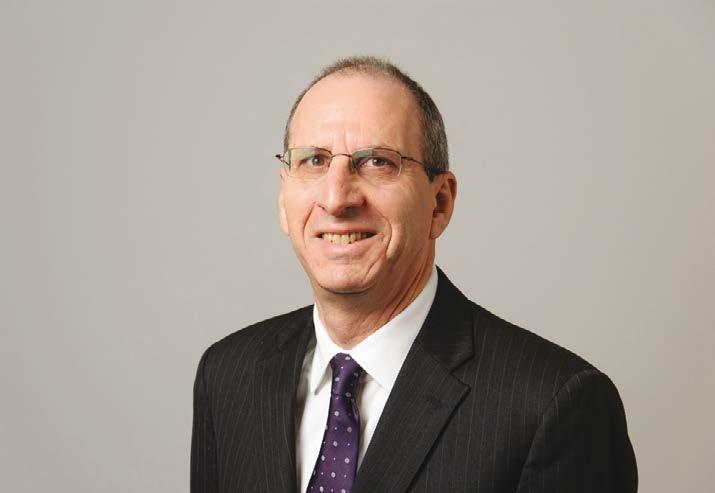
October 7th and the subsequent war are a shock that we are all still processing. UConn has over 2,000 Jewish students and many Jewish faculty members. I am very impressed with the resilience and resolve of the students I meet. But it’s a very hard time for them. They have never witnessed antisemitism like this. And social media has become a Jew-haters’ paradise.
Long-term, there is little doubt in my mind that the post-October 7th surge in antisemitism and anti-Israel hate will have a profound impact on how young US Jews feel about Israel. The diaspora will become more Zionist and have a deeper relationship with their Judaism. It’s also a jolt to liberal education. I believe that the post-modern turn in the humanities and social sciences has enabled the rise of reactionary identity politics on the left – and the destructive and historically inaccurate narrative of Israeli Jews as white settler colonialists and Palestinians as indigenous and oppressed people of color. How we teach and learn about Israel and understand the conflict is a conversation for another day, but we are discussing and starting to address this issue, too, including a new Levant Studies initiative.
Politically, I wonder if the Hamas attack and subsequent war could help the Republican Party and its authoritarian wing in the next election. But it’s still early. So-called “pro-Palestinian” groups in the United States are taking down US flags, attacking Christmas trees, spray painting graffiti on public buildings, harassing Jewish people and businesses, and blocking roads in major cities. It is hard to make political allies in the United States doing that. It is important to remember that RFK’s (ed: Robert F. Kennedy) father was killed by a Palestinian in 1968 who was disgruntled about the Israel-Palestine conflict. It is likely that Robert Kennedy would have won that election, which went to Nixon. Will the Hamas attack and subsequent war help to oust Joe Biden and put Donald Trump (or another Republican) in the White House? Will the war in the Levant make Biden look weak and further fracture Democrats? Time will tell.
The State of Connecticut and UConn are further leaning into Israel during this very hard time to deepen our innovation bridges and cultural ties. UConn is very proud to be partnered with Reichman University and looks forward to deepening our student and faculty interactions.
Thanks again for this opportunity.
107
Prof. Daniel Weiner, Vice President for Global Affairs, University of Connecticut
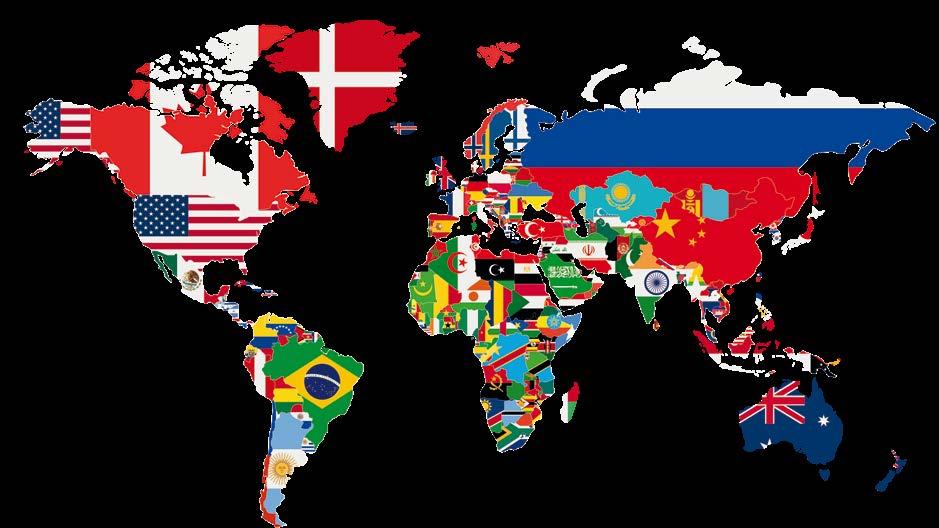
THE RAPHAEL RECANATI INTERNATIONAL SCHOOL HAS OVER 2,500 STUDENTS FROM 90 COUNTRIES ON CAMPUS!
UNDERGRADUATE PROGRAMS
• Business Administration
• Business & Economics (double major)
• Communications
• Computer Science (BSc)
• Economics & Entrepreneurship with Data Science (double major)
• Entrepreneurship & Business (double major)
• Entrepreneurship, BA & Computer Science, BSc (double major)
• Government
• Sustainability & Government (double major)
• Psychology
ONE SEMESTER / ONE YEAR / FULL DEGREE
GRADUATE PROGRAMS
MA GLOBAL MBA MBA
• Behavioral Economics
• Counter-Terrorism & Homeland Security Studies
• Diplomacy & Conflict Studies
• Financial Economics
• Human-Computer Interaction (HCI)
• Innovation & Entrepreneurship
• Big Data
• One-Year MBA
• Healthcare Innovation
MSc
• Machine Learning & Data Science
www.rris.runi.ac.il
LIVE IN ISRAEL STUDY IN ENGLISH

































 Jonathan Davis meeting with international students for the weekly pizza lunch
Jonathan Davis meeting with international students for the weekly pizza lunch







 Raphael Recanati International School students and staff at an agricultural volunteering initiative
over Israeli cities
Adi Zohar, first-year Psychology student from the U.S., Hila Zohar, first-year Communications student from the U.S., and Anni Lupo, Campus Life Coordinator for the Raphael Recanati International School
Raphael Recanati International School students and staff at an agricultural volunteering initiative
over Israeli cities
Adi Zohar, first-year Psychology student from the U.S., Hila Zohar, first-year Communications student from the U.S., and Anni Lupo, Campus Life Coordinator for the Raphael Recanati International School
















 From left: Gili Dinstein, CEO of Israel Friends and the Alumni Association, Brig. Gen. (Ret) Miri Eisen, Executive Director of the Institute for Counter-Terrorism (ICT); Adv. Ofir Yehezkeli, Deputy Mayor of Kiryat Shmona; Liora Ayalon, a veteran of Kibbutz Kfar Aza; and Alon Davidi, Mayor of Sderot
From left: Gili Dinstein, CEO of Israel Friends and the Alumni Association, Brig. Gen. (Ret) Miri Eisen, Executive Director of the Institute for Counter-Terrorism (ICT); Adv. Ofir Yehezkeli, Deputy Mayor of Kiryat Shmona; Liora Ayalon, a veteran of Kibbutz Kfar Aza; and Alon Davidi, Mayor of Sderot


 Prof. Anat Brunstein Klomek, Dean
Baruch Ivcher
Prof. Anat Brunstein Klomek, Dean
Baruch Ivcher

 Prof. Ruth Feldman, the Simms-Mann Professor of Developmental Social Neuroscience at Reichman University
Prof. Ruth Feldman, the Simms-Mann Professor of Developmental Social Neuroscience at Reichman University






 Prof. Lior Zemer, Dean
Dr. Harry L. Radzyner z”l
Prof. Lior Zemer, Dean
Dr. Harry L. Radzyner z”l





 From left: Adv. Yael Vias Gvirsman (with pink shirt), Adv. Ilan Yonash, Head of the Shira Banki Anti Hate Clinic, Dr. Neta Nadiv, Head of the Experiential Program, Adv. Sharon Sionov, Head of Legal Clinics, the German Ambassador to Israel, H.E Stefan Seibert and his wife Mrs. Sophia Gundelach
From left, first row: MK Karine Elharrar, Yarden Levy - student, Omri Kaplinsky - student, Jonathan Cohen - student, Hadar Sutker - student and Aya Kador - student From left, second row: Dr. Neta Nadiv, Head of the Experiential Program, Tal Horev - student, MK Karine Elharrar’s Parliamentary Assistant, Prof. Lior Zemer, Adv. Geller Efrat and Adv. Einat Katz
From left: Adv. Yael Vias Gvirsman (with pink shirt), Adv. Ilan Yonash, Head of the Shira Banki Anti Hate Clinic, Dr. Neta Nadiv, Head of the Experiential Program, Adv. Sharon Sionov, Head of Legal Clinics, the German Ambassador to Israel, H.E Stefan Seibert and his wife Mrs. Sophia Gundelach
From left, first row: MK Karine Elharrar, Yarden Levy - student, Omri Kaplinsky - student, Jonathan Cohen - student, Hadar Sutker - student and Aya Kador - student From left, second row: Dr. Neta Nadiv, Head of the Experiential Program, Tal Horev - student, MK Karine Elharrar’s Parliamentary Assistant, Prof. Lior Zemer, Adv. Geller Efrat and Adv. Einat Katz













 The German Ambassador to the State of Israel, H.E. Steffen Seibert, prepares a package for the soldiers and leaves a note
From left: Prof. Lior Zemer, Dean, Harry Radzyner Law School, student volunteers, German Ambassador to the State of Israel, H.E. Steffen Seibert, and his wife, Mrs. Sophia Gundelach
The German Ambassador to the State of Israel, H.E. Steffen Seibert, prepares a package for the soldiers and leaves a note
From left: Prof. Lior Zemer, Dean, Harry Radzyner Law School, student volunteers, German Ambassador to the State of Israel, H.E. Steffen Seibert, and his wife, Mrs. Sophia Gundelach


 From left: MK Karin Elharar, Prof. Liav Orgad, Co-Director of the Rubinstein Center for Constitutional Challenges and Prof. Yaniv Roznai, Vice Dean, The Harry Radzyner School of Law and Co-Director of the Rubinstein Center for Constitutional Challenges
From left: MK Karin Elharar, Prof. Liav Orgad, Co-Director of the Rubinstein Center for Constitutional Challenges and Prof. Yaniv Roznai, Vice Dean, The Harry Radzyner School of Law and Co-Director of the Rubinstein Center for Constitutional Challenges




 Prof. Itzhak Gilboa, Dean
Judy and Avi Tiomkin
Prof. Itzhak Gilboa, Dean
Judy and Avi Tiomkin












 Maj. Gen. (Res.) Amos Gilead Executive Director, Institute for Policy and Strategy (IPS)
Maj. Gen. (Res.) Amos Gilead Executive Director, Institute for Policy and Strategy (IPS)

 Ms Irina Nevzlin
Ms Irina Nevzlin








 Prof. Niron Hashai, Dean
Prof. Niron Hashai, Dean


 Students at the launch of the Genesis Project
Students at the launch of the Genesis Project



 Dr. Amit Lavie-Dinur, Dean
Dr. Amit Lavie-Dinur, Dean





 collaborate to find the best way to create their story
Production begins on Seven10stories
The Kenaf Ventures fields at Kfar Aza before the massacre of October 7th.
The Gaza Strip is visible in the background
collaborate to find the best way to create their story
Production begins on Seven10stories
The Kenaf Ventures fields at Kfar Aza before the massacre of October 7th.
The Gaza Strip is visible in the background



 Prof. Yacov Hel-Or, Dean
Prof. Yacov Hel-Or, Dean













 From left: Anat Katz, Economic Attaché at the Consulate of New York, Shira Lapid, Founder and Leader of the Civilian Control Center in New York, Guy Franklin, Volunteer Coordinator at the Civilian Control Center, and Liraz Hayon, Assistant to Anat Katz
From left: Anat Katz, Economic Attaché at the Consulate of New York, Shira Lapid, Founder and Leader of the Civilian Control Center in New York, Guy Franklin, Volunteer Coordinator at the Civilian Control Center, and Liraz Hayon, Assistant to Anat Katz


 Dr. Yossi Maaravi, Dean
Sheldon G. Adelson z”l and Dr. Miriam Adelson
Dr. Yossi Maaravi, Dean
Sheldon G. Adelson z”l and Dr. Miriam Adelson







 Madrid, Spain
Photo: Sebastian Dubiel
Valencia, Spain
Photo: Martin de Lusenet
Munich, Germany
Madrid, Spain
Photo: Sebastian Dubiel
Valencia, Spain
Photo: Martin de Lusenet
Munich, Germany





